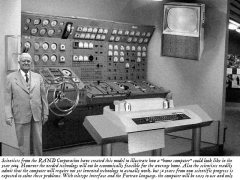April 20, 2006
Older, wiser
Sports Illustrated online has a short article to say that Lance Armstrong is planning to run the NYC marathon, and to do so without, "plans to run marathons ... professionally." After a few months off the bike, he finally came to his senses, realizing sports involving special equipment and machines are less direct and natural than running. Or maybe he just wore himself out to the point where he figures training for a marathon is a rest.
Posted by Mark at 07:03 AM | TrackBack
April 19, 2006
Libertarianism in One Lesson
 David Bergland ran for US president on the Libertarian ticket in 1984. Dad bought me his book, Libertarianism in One Lesson, which has gone through eight printings at least.
David Bergland ran for US president on the Libertarian ticket in 1984. Dad bought me his book, Libertarianism in One Lesson, which has gone through eight printings at least.
What interested me in reading this book was to compare my own leanings to those of a Libertarian who has thought out his position and written it up. Libertarianism seems like an ascendant current in US politics for two reasons in my very humble opinion. The first reason is that Libertarians greatly favor self-determination and freedom, even if it's at ones own expense, a position more and more Americans consider the right one. The second reason is that Libertarians see the free market as a better solution to economic problems, and most Americans agree with that.
On the one hand, I found much to agree with in this book. I definitely agree that free markets were and are better than having the king decide what commerce can take place, and are better than having some "representative" bureaucracy decide in place of the king. (The current US and Western European economies have this kind of state intervention to varying degrees.)
On the other hand, I don't agree that we cannot do better than free markets, nor that we cannot think about alternatives. Bergland would call parecon Utopian, then he would continue believing in a magical free market alternative that has never existed either at scale. Some experimentation is called for.
Posted by Mark at 06:45 PM | TrackBack
April 15, 2006
Track cycling
We watched track cycling this afternoon. Strange sport in some respects.
The speeds those track cyclists reach are amazing, especially considering they're on the flats. The teams of four typically covered 4 km in just over 4 minutes. In one race a guy managed to average over 71 kph (44 mph) for a one lap sprint. I need a good downhill slope to achieve that as my max speed.
Posted by Mark at 06:23 PM | TrackBack
April 14, 2006
Ubik
 Reread this book again. Still not sure what to make of it.
Reread this book again. Still not sure what to make of it.
Philip K. Dick published Ubik for the first time at the close of the 1960s. His 1992 has people who've not changed much since then. Except the protagonists' line of work is protecting people against folks who've evolved extra sensory perceptions, precognitions, and standard PKD psi-fi fare.
At the core of the story is that battle for half-dead people's souls, and the difficulty of knowing whether what you're experiencing is reality or only a very good fake thereof. What I like about PKD is that he comes out more blatantly than Borges with the conclusion that it's all fake.
If you were a storyteller, would you not want it to turn out that way?
Posted by Mark at 08:23 PM | TrackBack
April 12, 2006
Not exactly real time
This arrived in my mailbox at 10:55 am this morning:
Flight NW 40 departed Detroit-Wayne County Int'l, MI at 3:56 pm on April 11 from Gate A34 and arrived in Amsterdam-Schiphol, Netherlands at 5:30 am. Gate subject to change. Verify at airport.
I'd requested to receive an update 2 hours before arrival. Good thing I wasn't counting on that notification.
Posted by Mark at 08:52 PM | TrackBack
April 10, 2006
How powerful is the virtual pen
Andy wrote an entry covering his letter to the editor about unsafe helitour practices where he lives. He seems to have spent some time researching the situation.
How powerful will Andy's virtual pen prove to be? I presume the Garden Island News letters to the editor are going to remain online and get indexed. That wouldn't happen with paper news. Will knowing the admonitions are just a click away in the search engine from the company name discourage irresponsible flying?
Posted by Mark at 08:07 PM | Comments (2) | TrackBack
April 09, 2006
Paris and Paris-Roubaix
Didn't watch any of the Paris Marathon this morning. Looks like Gashaw Melese won in 2:08:03.
Watched the last 50 km of Paris-Roubaix. France 2 was having trouble with the cameras. Fabien Cancellara won, breaking away less than 20 km before the end. He rode for a bit over 6:07, including the rough paved sections, at 42.24 kph on average into headwinds much of the way. He could not speak to the reporters when he finished. Looked like he was having a heart attack or something.
Tom Boonen seems to have run out of gas around the last attack. The announcers thought one of the reasons nobody went after Cancellara right away is because they were waiting to ride in Boonen's wake.
The rough paved sections are truly rough. Hincapie went down and seems to have fractured his collarbone or something. He didn't get a flat. His handlebars broke.
UPDATE: Looks like Tom Boonen got second place, although he finished fifth! Three guys got disqualified in the end for crossing train tracks when the bars were lowered. That's against the law and against race rules. You're allowed to kill yourself in a crash but not by potentially getting hit by a train.
Cancellara's lucky too. What if the train had been 30 seconds faster and he'd've been disqualified?
The only reason Boonen and the guys he was with stopped is because the train was literally going through the intersection when they arrived.
Posted by Mark at 05:10 PM | Comments (1) | TrackBack
April 07, 2006
Lila: An Inquiry Into Morals
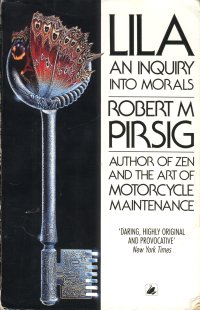 Stuart lent me Pirsig's other book, Lila: An Inquiry Into Morals. Not sure what to make of it. In this one Pirsig expounds on his Metaphysics of Quality, setting up Dynamic Quality as that from which everything else flows.
Stuart lent me Pirsig's other book, Lila: An Inquiry Into Morals. Not sure what to make of it. In this one Pirsig expounds on his Metaphysics of Quality, setting up Dynamic Quality as that from which everything else flows.
On one hand, the atmosphere of the book reminds me of those thoughts you have at 4 am, thoughts that seem visionary insights when they show up in the insomniac consciousness. Later in the day the thoughts you esteemed so well early in the morning turn out embarrassing. I had the impression throughout that Pirsig was grasping at straws.
On the other hand, this book is a novel, not a treatise. So what's Pirsig telling us? Maybe it'll come to me at 4 am.
Posted by Mark at 10:58 PM | TrackBack
Global warming fatalism
The Straight Dope has Cecil's answer to the question, "Is global warming for real?"
The human contribution to atmospheric carbon in the form of CO2 is small, less than 5 percent of the total carbon reservoir. Ergo, humans aren't causing global warming. I omit a lot of ancillary discussion, but that's the nub.One might raise scientific objections to this reasoning, but there's no point. Fact is, there's little that can be done to reduce CO2 emissions regardless of their impact on the environment.
Cecil goes on to say the real challenge is the gradual disappearance of fossil fuels. That we're going to have to do something about, whether we want to face it or not.
Posted by Mark at 10:47 PM | TrackBack
Constraints
Andy sent along a link to an article by Paul Graham on software patents. It's balm for my conscience, since I've used a few second-rate ideas to try to get patents for my employer. Invention disclosures are perhaps the only self-serve bonus available in engineering.
Paul does however write that, "it's better, even from a purely selfish point of view, to be constrained by principles than by stupidity." Let's just say some of us are too dumb to understand what he means.
In a nutshell, Paul figures that patents are obligatory defensive weapons in a system where, "Business is a kind of ritualized warfare." Yet because they're similar to nukes as defensive weapons, young startups needn't worry about accidentally infringing a patent or two. You only need to worry if you're very successful. He concludes that patents are better than earlier alternatives in history, like secrecy and severe punishment for revealing things.
Posted by Mark at 10:11 PM | TrackBack
April 05, 2006
CUPS web interface
The CUPS system lets you manage printers by connecting to http://localhost:631. I'd not used this before. Just tried it on Ubuntu 6.06 (alpha) and it's great. Better than the Gnome printer setup application.
Posted by Mark at 02:32 PM | TrackBack
April 04, 2006
A new hobby
C|Net has an article about advertisers looking to have other people do their ads in their spare time:
"Traditional marketing methods have fallen short," Decker said in explaining why he expects viewer-created ads to take off in the market, particularly for the 18- to 34-year-olds who watch Current TV. "This demographic does not respond positively to something overly produced and (that is a) hard sell."
At what point does it sink in that people just don't need any more of your stuff?
"The holy grail for me as a marketer would be to have an entertaining viral video that was getting passed around and it doubled as a commercial," said Brian Monahan, who oversees online and offline ad campaigns for Microsoft at the Universal McCann ad agency. "Can we produce work like that? I don't know. But I'm counting on the kid in his bedroom who has a really funny idea."
The main problem seems to be with volunteers who aren't sticking to the script. They end up making ads the companies don't really like.
Posted by Mark at 06:03 PM | TrackBack
March 23, 2006
Fat man walking
Perhaps you already saw this elsewhere. A guy named Steve got fed up with being fat and out of shape. So he decided to walk across the US.
It looks like Steve got a big welcome in Indiana.
In any case, he started from this:
3/26 - 1 mile - almost killed me. The back and leg pain was unbelievable.
Later, in Illinois and Indiana, he was averaging 15 miles per day. Hats off.
Posted by Mark at 09:46 PM | TrackBack
March 22, 2006
Why We Can't Wait, part II
BBC News has an article today entitled, One in three French 'are racist'. Only a few days ago I wrote, "The words racist, and even more so segregationist have an atavistic connotation." Apparently I'm living in country where 1/3 of the people think the term racist is right up to date. Hmm.
Posted by Mark at 08:49 PM | TrackBack
Too rich for my blood
Performance Bike sent me mail with Subject: Buy 2 Tires and Save up to $70. Cycling is for the independently wealthy.
Posted by Mark at 08:21 PM | Comments (1) | TrackBack
March 20, 2006
Why We Can't Wait
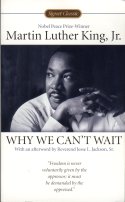 Martin Luther King wrote Why We Can't Wait soon after and indeed even in the midst of the direct action in Birmingham that eventually began to eliminate segregation there and the famous march in Washington in late summer of 1963. Someone had left this paperback on the shelf at work, so I read it. I wanted to know whether Dr. King's speaking voice carried across into his writing.
Martin Luther King wrote Why We Can't Wait soon after and indeed even in the midst of the direct action in Birmingham that eventually began to eliminate segregation there and the famous march in Washington in late summer of 1963. Someone had left this paperback on the shelf at work, so I read it. I wanted to know whether Dr. King's speaking voice carried across into his writing.
To some extent it does. Trouble is you find yourself reading this book in your own voice. Despite King's powerful arguments, his commanding rhetoric, his stately phrasing, the text does not have the same force when your inner voice delivers it. It would be better coming from him.
To someone of my generation it is remarkable to see how far the US has come from the early 1960s. The words racist, and even more so segregationist have an atavistic connotation. At the same time some of King's later ideas, like his Bill of Rights for the Disadvantaged, have not yet come true. Instead we've had affirmative action, for example.
What they have to say over at Wikipedia is voluminous. It even includes a conspiracy theory. In a wrongful death civil trial, 'The jury of six whites and six blacks found Jowers [the defendant] guilty and that "governmental agencies were parties" to the assassination plot.' (Source) He certainly would've made powerful enemies in the last few years of his life. Listen to the end of his April 4, 1967 speech calling for an end to the war in Vietnam.
Posted by Mark at 08:41 PM | Comments (2) | TrackBack
March 19, 2006
The Cyclist's Training Bible
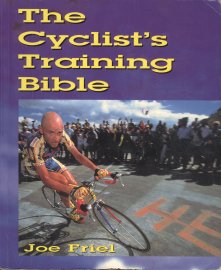 Matt lent me Joe Friel's Cyclist's Training Bible after I'd asked about maximum heart rate again. My guess about the run in Paris is so many runners had heart rate monitors that my average reading of 183 is just a fluke. At the outset I was joking with a man and woman next to me about being a little excited, since my heart rate was reading 223. But the man and woman next to me had 221 and 229 respectively.
Matt lent me Joe Friel's Cyclist's Training Bible after I'd asked about maximum heart rate again. My guess about the run in Paris is so many runners had heart rate monitors that my average reading of 183 is just a fluke. At the outset I was joking with a man and woman next to me about being a little excited, since my heart rate was reading 223. But the man and woman next to me had 221 and 229 respectively.
Friel's book looks just right for someone taking cycling seriously, and wanting to get more out of training. Friel bases training efforts on power and lactate thresholds (LT), so power and especially LT are the two measurements Friel suggests to the cyclist gauging training intensity.
The measurements are probably easier to make on the bicycle than on foot. You can get a power meter like the one Matt and Colette share, although they're probably expensive. You can also get an indoor trainer on which you can adjust the resistance during the test rides. Friel's test for LT has you start at 100 watts, increasing 20 watts per minute until you have to give up after 15 seconds. You should do this with companion (or lab technician) who notes your subjective effort level on a scale of 1-20 (20 hardest), and watches when you reach your ventilatory threshold (labored breathing). Your LT is where you said effort was between 15-17 and you'd reached your ventilatory threshold.
On foot I don't have a good way of stepping up the power in measured increments. I'd have to guess at LT, probably my avg. heart rate for a 10 km workout or a 15 km race. If I can count Pontcharra last year for the latter, my LT heart rate is then 177 or thereabouts. That gives me the following zones:
- 1 Recovery 116-145
- 2 Aerobic 146-158
- 3 Tempo 159-165
- 4 Subtheshold 166-176
- 5a Superthreshold 177-180
- 5b Aerobic Capacity 181-186
- 5c Anaerobic Capacity 187-193
I may not be taking it easy enough in recovery, and perhaps too hard for my body to recover quickly much of the time. That could be why I'm so exhausted after intense speedwork like last week. I'm not up to match hours with the cycling pros at any rate. Friel says they should train 800-1200 hours/year, the heaviest trainers are therefore training more than 3 hours/day on average. No wonder he recommends you get plenty of sleep.
Although I'm hardly a cyclist, I found the book entertaining. Recommended if you want to take your cycling seriously.
Posted by Mark at 08:09 PM | Comments (5) | TrackBack
March 13, 2006
Going quiet
Should've found this one when I was making resolutions for the New Year. It's from the How To Wiki, a procedure for doing nothing.
Posted by Mark at 02:34 PM | Comments (2) | TrackBack
March 12, 2006
Shaun of the Dead
Nathalie brought home a silly video last night, Shaun of the Dead. We watched it in French, though it probably would've been better in the original version.
Shaun of the Dead mixes standard horror movie formulae with an unbroken string of understated gags. The characters are quite well done. Check out the DVD.
Posted by Mark at 09:00 AM | TrackBack
March 10, 2006
Brain waves
I'll try lots of things once. So the Digg to SBaGen was enough for me to download the software and try it.
The aim is to bring your brain into sync with certain frequencies using the beats generated by slightly to significantly out of tune sine waves, one in the left ear, one in the right. So far all I've done is make a couple of MP3s, which I'll try out on the player.
The SBaGen developer has a link to somebody who considers this stuff the absolute cat's pyjamas, and for a fee will sell you CDs on your own hypnotic suggestions in your own voice.
I'll stop if I get sudden cravings for microbiotic rice and mashed yeast.
Posted by Mark at 10:30 PM | TrackBack
LSE a takeover target
BBC News has an article about the London Stock Exchange rejecting a takeover bid by the NASDAQ. According to the article, the LSE seems to be bidding up it's price. Apparently both exchanges benefitted, but the NASDAQ is up even more than the LSE.
The market caps are such that LSE is worth about 2 billion GBP, the NASDAQ worth about 3.5 billion USD. Over the last year, LSE has not quite doubled, but NDAQ has gone up fourfold.
Can you buy an index of exchanges? Could you corner the markets market?
Posted by Mark at 08:35 PM | TrackBack
March 09, 2006
Please don't feed the lemmings
Slashdot pointed to a Times Online article about financial missteps and mistakes Google executives made when presenting to analysts.
“The time has come for Google to step into line,” one analyst said. “It is in the interest of all shareholders, including the company’s employees and officers, that the share price achieves some stability.”
Gee, I wonder why no one was complaining about the upside instability? Now these folks want someone else to protect them from having suggested you purchase a bunch of shares in a website with a P/E of 100.
Posted by Mark at 09:50 PM | TrackBack
On the glut of dark fiber
Digg had a link to a Telephony Online article covering the Chief Architect from BellSouth saying TV over the Internet is going to call for, “massive amounts of cheaper bandwidth.”
Apparently each residental broadband customer today costs the service provider an average of $1 per month. That's pretty close to what you're paying, right?
High definition TV could eat up over 500x as much bandwidth. I remember Ed Zander on stage in 1999 saying network use was doubling each 4-6 months. 2^9 = 512. We should be there in 3-5 years I guess.
Regular definition TV over IP is already on offer here in France, but you need to be close to the phone box where they switch your traffic onto the main network. We're too far away.
Posted by Mark at 03:39 PM | TrackBack
Toward the End of Time
 This paperback version of John Updike's book, Toward the End of Time, was sitting on the shelf at work. My original intent was to read it while Nathalie was skiing with the children. Instead I became bogged down online. The World Wide Web is my substitute for television.
This paperback version of John Updike's book, Toward the End of Time, was sitting on the shelf at work. My original intent was to read it while Nathalie was skiing with the children. Instead I became bogged down online. The World Wide Web is my substitute for television.
Updike writes this one in the first person of the protagonist, a mostly retired financial advisor suspiciously well versed in the names of his local New England flora. Maybe you acquire that vocabularly when you retire. Maybe Updike's vocabularly is so much larger than mine he cannot remember what it was like to document the world through a meager 10,000 words or so.
Yet I found buried in this book one case I'm virtually sure was a typo, protons when he meant photons. That threw me off the scent. I cannot figure it out. How could a financial advisor be so in tune with plant names, yet not know the difference between protons and photons? Is this some deep statement about finance? Is Updike just thumbing his nose at us? If it was a mistake, what about the rest of the story?
I'm nitpicking. In the end I had a hard time getting hooked with this one. It's obvious John Updike can write circles around me, even in areas where his subject matter expertise is thin. I still didn't like his book.
Posted by Mark at 06:53 AM | TrackBack
March 08, 2006
International Women's Day
I heard it was International Women's Day. Nathalie laughed wryly and said this was the worst day in a while. Diane was giving her grief this morning. With the rain and snow, they all stayed inside this afternoon and drove each other up the wall.
BBC News online had an article for International Women's Day about the gender gap in Europe:
Statistics released by the EU to mark International Women's Day show European women do better in school than men, but get lower pay and fewer top jobs.
That trend seems to be stable over the years. My only contributions today were making dinner, doing the dishes, and getting up to calm Diane down after nightmares. The rest of the time I was at work, increasing my lead.
Posted by Mark at 07:41 PM | TrackBack
March 07, 2006
FreedomWorks and CGEG sites
Dad sent a link to FreedomWorks.org, a site devoted to events and issues on the political scene in the US, with a focus on fiscal conservatism. You can get RSS feeds for news articles, and read lots of articles there.
The site appears to be provided by an organization called the Center for Global Economic Growth.
The principle mission of the Center for Global Economic Growth (CGEG) is to work with public policy organizations which advocate free markets and limited government, and to assist them in developing citizen action groups to promote policies that will foster economic growth and opportunity.
One of the CGEG articles, Hope for Europe?, sees "old Europe" countries eventually moving in the direction suggested by economists such as Hayek and Friedman, whether the upcoming generation has the political capital to do it or not.
Looking at the European political landscape, my own guess is that neither Miss Merkel nor Mr. Sarkozy will have the conditions, luck and spine to do what Mrs. Thatcher and Mr. Reagan did. But what they may be able to do is buy a little more time for Europe until the people understand there is no constructive choice other than following the Anglo-Saxon model of lower taxes, spending and regulation.
Author Richard W. Rahn is probably right that people in Germany and France will eventually vote for supply siders. The European Union might also manage to establish more capital friendly policies without direct intervention by voters.
UPDATE: A factoid: "Milton Friedman's best known work is on the Quantity Theory of Money." (Source) Always wondered where Will Self got the idea for the title of his collection of short stories.
Posted by Mark at 09:45 PM | TrackBack
Complexity hurting sales
Andy sent a link to an article from Reuters on Yahoo! that states Complexity causes 50% of product returns.
The average consumer in the United States will struggle for 20 minutes to get a device working, before giving up, the study found.Product developers, brought in to witness the struggles of average consumers, were astounded by the havoc they created.
The problem with those of us making products is that we get used to complexity that we found incomprehensible initially. When we are making something ourselves and can take the time to get to know it, we work around many of its strange idiosyncracies. Then we end up legitimately surprised when no one new to it can make heads or tails out of our creations.
Powerful, yet simple and unsurprising, is hard to do.
Posted by Mark at 09:23 PM | TrackBack
March 03, 2006
Podcast for the road
Luke pointed me to the 12 free podcasts out there from Ricky Gervais and his two henchmen, Stephen Merchant and Karl Pilkington. It's The Ricky Gervais Show. You have to root around for all 12, but they weren't too hard to find.
The folks originally hosting the show claimed this podcast was quite a success:
Ricky Gervais and his team were this week awarded the Guinness World Record for the most downloaded podcast, gaining an average of 261,670 downloads per episode of The Ricky Gervais Show. during its first month.
It's probably Karl. The whole show roughly boils down to Ricky and Steve slagging Karl off. It's as polished as a pile of rubble, and as grown up as Dr. Seuss, but had me laughing so hard I almost rear-ended somebody at a roundabout.
Posted by Mark at 10:32 PM | TrackBack
February 28, 2006
Dapper Drake Flight CD 4
I tested the LiveCD version of Ubuntu 6.04 Flight CD 3, due to release in April. It's close enough now for horseshoes and hand grenades, so I've actually installed Flight CD 4 on this laptop.
My first impression is that the install went more smoothly for 5.04 and for 5.10, but then I did wait until those were fully baked before trying to install.
- What's with the huge pause after the kernel gets loaded and the installer starts?
Was Ubuntu trying to start an X-based installer and couldn't get X configured for the laptop? - How did I so easily manage to perform an OEM install?
I didn't notice anything was amiss until it asked me for a user password without allowing me to provide a username. It just seemed like the install was bugged. Then I got out of that, ransudo oem-config-prepareafter updating 233 packages (!).
This left me in a state where I had to go to failsafe install. I couldn't get my user added with the right groups to do any administration. It's not clear to me whether that's a bug, or something I was supposed to know since I installed as an OEM. But installing as an OEM was pure accident. - Has Evolution gotten good enough to give it a chance?
Thunderbird should at least be a default option for the mailer. - Ekiga Softphone (the program formerly known as GnomeMeeting) now helps me get signed up with a SIP address at the associated website. Very nice.
- Sound setup still does not seem to work.
Had tokillall esdbefore ekiga could get configured. - Although I had to identify the trident driver in
xorg.confusing a text editor, at least the default vesa driver worked fine. No weird colors on the laptop screen when X starts. - Whereami and a wizard to configure should be there by default if anything looking like a laptop is detected.
If I had the energy I'd do the work myself.
If I had the energy, I'd get to work on Matt's idea of network-based configuration settings. One should not have to set up one's browser and emailer each time one changes systems.
Update: It wasn't enough to add the trident driver in the appropriate section. I had to make the Device section in xorg.conf look like this:
Section "Device"
Identifier "Generic Video Card" Driver "trident"
BusID "PCI:1:0:0"
Option "ShadowFB" "true"
Option "accel"
EndSection
Otherwise the windows get repainted very slowly when scrolling or being displaced.
Posted by Mark at 11:24 PM | TrackBack
Pffsssttt...
BBC News has an article about GOOG shares deflating. George Reyes is quoted as remarking, "The search monetisation gains have now been largely realised."
Web 2.0 and house prices to pop at the same time?
Posted by Mark at 07:47 PM | TrackBack
Music for running again
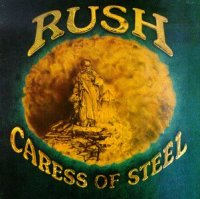 Caress of Steel dates back to 1975, back when Alex Lifeson was still listening to Led Zeppelin and hadn't yet floated off into the pastels of the mid 80s. According to Wikipedia, this album was a flop. It is dated and in many respects silly. The 20 minute Fountain of Lamneth idea just doesn't come off that well over 30 years later.
Caress of Steel dates back to 1975, back when Alex Lifeson was still listening to Led Zeppelin and hadn't yet floated off into the pastels of the mid 80s. According to Wikipedia, this album was a flop. It is dated and in many respects silly. The 20 minute Fountain of Lamneth idea just doesn't come off that well over 30 years later.
But it's good for a short, up tempo run. The interplay of these three guys jamming provides a solid metronome. The Necromancer, though a corny idea, still sounds effective. The sort of Lord of the Rings aura, Geddy Lee high nasal vocal, blown dry hair, and goofy bell bottom pantleg ambiance balances out how heavy Lifeson seemed to think he was. Thankfully these guys took themselves less seriously than Metallica later did with their extrapolation of what was going on here.
Plus, Neil Peart grooves his way through. His grace-under-pressure percussion motivates well during a run.
Posted by Mark at 03:48 PM | TrackBack
Heavy rain coming
Metcheck.com's predicting ugly weather coming up this weekend in Paris, where Stu, Luke, and I are going to be running.
What I look forward to most when I'm out there running 21 km (13 mi) are the expected 39 kph (24 mph) winds out of the southwest. Maybe I should pack a parachute. At least I'm not trying to qualify for anything or expecting to run a particular time.
Posted by Mark at 01:38 PM | TrackBack
February 27, 2006
Top of the housing bubble perhaps
According to a headline at WSJ.com, new home sales fell 5% in January. That's probably just for the US right now, but maybe it's headed this way.
Would be a good time to sell our house no doubt, but global warming has not yet advanced to the point where we can live outside here in the winter. Nor is free wireless Internet available to everyone living out of cardboard boxes under bridges.
Posted by Mark at 06:22 PM | TrackBack
February 25, 2006
The Structure of Scientific Revolutions
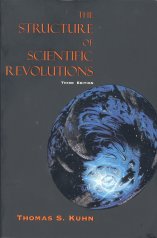 Thomas Kuhn published The Structure of Scientific Revolutions in 1962, which I think of as being five years after the 1957 Soviet launch of Sputnik encouraged the US to react by pushing science in schools over some other subjects. A few years later when I was going to school, history had been almost left out of the curriculum. We no longer studied Latin either.
Thomas Kuhn published The Structure of Scientific Revolutions in 1962, which I think of as being five years after the 1957 Soviet launch of Sputnik encouraged the US to react by pushing science in schools over some other subjects. A few years later when I was going to school, history had been almost left out of the curriculum. We no longer studied Latin either.
Kuhn examines the history of science, in particular what we thought of in school as physics and chemistry, to disclose how science evolves from one paradigm to another, passing through periods of relative calm "normal science" punctuated by crises provoking revolutions, when scientists' consensus worldview moves from an older, well-explored paradigm to a newer paradigm, one which does a better job of resolving the problems that led to crisis. It is, according to Kuhn, the rigidity of the scientific approach that forces scientists from paradigm to crisis. The trained scientist notices interesting anomalies when the current paradigm is well understood, and the methods of measurement it suggests turn up data that do not fit the paradigm. In a way the best creativity arises when the most rote and disciplined application of the current consensus is accompanied by a capacity to drop the current way of looking at the problem and try other approaches.
This book was not for me a page turner. I had to force myself to read it. Yet it is worth reading. I wonder about its implications for the study of history. I wonder how it applies to things I do. It ends with Kuhn comparing his explanation to Darwinian evolution in biology, which is to say that science does not progress towards a goal, but instead evolves to more and more complete and specialized explanations of observable facts. For some reason that's a calming thought.
Posted by Mark at 09:45 AM | TrackBack
February 23, 2006
Interlocking theories and gibberish
Over at Wikipedia.org, I found an article that draws Castaneda and Thomas Kuhn together, concerning chaos magic:
The idea is that belief is a tool that can be applied at will rather than unconsciously. Some chaos magicians think that trying unusual, and often bizarre beliefs is in itself an experience worth having and consider flexibility of belief a form of power or freedom in a cybernetic sense of the word.
At one end of what I'm reading this week lies Castaneda, to whom applies what Borges's narrator of the story of Tlön observes of his friend, Bioy Casares, who seemingly comes up with the encyclopedia article on the imaginary land as, "a fiction devised by [his] modesty in order to justify a statement." At the other end stands Kuhn, explaining The Structure of Scientific Revolutions by means of scientists' dependence on paradigms.
Funny how the most entertaining stories are the fake ones. Kuhn knocks me out like melatonin. Yet he doesn't knowingly introduce fictions to justify his statements. Once you start introducing the fictions, where do you stop?
Posted by Mark at 10:10 PM | TrackBack
February 22, 2006
The Active Side of Infinity
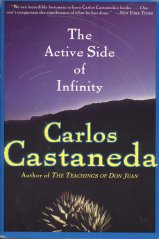 Who is more Yoda-like, Juan Matus or Peter Drucker? Picture Peter Drucker wielding a green light saber.
Who is more Yoda-like, Juan Matus or Peter Drucker? Picture Peter Drucker wielding a green light saber.
Carlos Castaneda apparently died the same year The Active Side of Infinity was published. This particular book covers a period preceding don Juan's departure with his coterie on the next part of the trip.
I still don't know what to make of Castaneda's work. It runs the gamut from slapstick comedy to spiritual fiction, leaving the sneaking suspicion that perhaps he's not in fact making all of it up. Although the italicized concepts like seeing, dark sea of awareness, and so forth leave the alert reader surprised that such nonsense still remains a pleasure to read, there's a sort of gestalt that holds together quite well, and a few ideas, such as flyers, almost too far out to fake.
In the end this book is a relief. Maybe I should read more fiction.
Posted by Mark at 08:46 PM | TrackBack
February 21, 2006
False Prophets
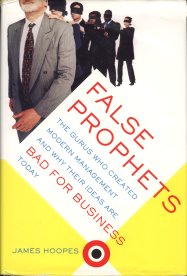 Rob lent me this book, False Prophets, in which James Hoopes, a history professor, retraces the lives and works of American management gurus Taylor, both Gilbreths, Gantt, Follett, Mayo, Barnard, Deming, and Drucker. Hoopes sees the gurus as wanting to skirt around and finally in this century striving to downplay or even eliminate the role top-down power must play in the hierarchical organization, eventually suggesting to managers they should be showing the way through some inspired form of moral leadership.
Rob lent me this book, False Prophets, in which James Hoopes, a history professor, retraces the lives and works of American management gurus Taylor, both Gilbreths, Gantt, Follett, Mayo, Barnard, Deming, and Drucker. Hoopes sees the gurus as wanting to skirt around and finally in this century striving to downplay or even eliminate the role top-down power must play in the hierarchical organization, eventually suggesting to managers they should be showing the way through some inspired form of moral leadership.
As Hoopes observes, this suggestion serves mainly to prevent those at the tops of the orgcharts from confronting the top-down power they exercise whether fully consciously or not. This missed confrontation may ease the conscience of those who believe in democracy and also function as corporate dictators. Yet Hoopes argues that in the end it not only further alienates those subjected to disingenuously wielded power, but also prevents those at the top from correctly interpreting situations in which they must lead those beneath them.
Hoopes offers his criticisms from near the center of mainstream corporate America. On the one hand, his book therefore could be read by folks at the tops of the heaps, encouraging them to face their top-down power head on, and to use it without obfuscation. On the other hand, the gurus worked hard to establish their apology for tyrannical power in the midst of what's supposed to be a democracy. Once we started being honest with ourselves, there'd be more explaining to do. A public works program for management guru/apologists, anyone?
Posted by Mark at 07:54 PM | TrackBack
February 19, 2006
Amazing speed
Diane and I watched some speed skating before it was time to take her bath. The best woman in the bunch did 1 km on skates in less than 1:17. That's as fast as the guys riding in the Tour de France!
We were both impressed, though somebody liked tickle matches more than the Olympic games.
Posted by Mark at 06:00 PM | TrackBack
More online robbery
Now that I'm looking into things at Free.fr, I also see that despite their posted tarifs for telephone calls, they've been charging us for calls they say are no additional cost.
It's not much money, but needs to be corrected. Since it's going to cost me time to fix their mess, I wonder what I can do to cost them as much as possible. Maybe some letters to editors would help.
Update: Aha! The thieves seem to have protected their theft on a technicality. They don't propose the offer, but I have to go read 20 pages of fine print again to find the differences between what they proposed to me at the end of December and what I'd have to accept now that I'm signed up. Hmm. So if I'm going to get a fair shake for my work, it's going to need to cost them dearly.
Another update: It's not 20 pages. It's 41.
Posted by Mark at 01:03 PM | TrackBack
February 18, 2006
The end of sleep
According to a digg on Sky News, sleep may soon be a thing of the past. Scientists are finding out how to medicate us so we hardly need to sleep, with the expectation according to Russell Foster at Imperial College London that:
"In 10 to 20 years we'll be able to pharmacologically turn sleep off. Mimicking sleep will take longer, but I can see it happening."
Great for taking care of sick kids, surfing late into the night, or meeting impossible project deadlines. Maybe that'll reduce our life expectancy enough that we won't have to work through age 85.
Posted by Mark at 04:09 PM | TrackBack
February 17, 2006
Intuition justified provided advance notice
New Scientist has a Slashdotted article covering research findings that suggest you'd do better not weighing your options too long on complicated decisions. Of course this is great news for the INFJs among us who typically reach conclusions before we're sure what the issue is.
Or is it?
It seems you have to give your unconscious mind a chance to mull things over while your conscious mind is occupied elsewhere. According to the findings, it doesn't help to make a quick decision if you haven't primed your unconscious mind beforehand.
Posted by Mark at 10:03 PM | TrackBack
February 16, 2006
Capitalism for Beginners
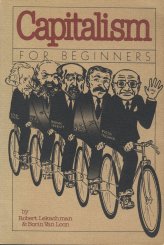 Capitalism for Beginners is another of Antonia's comic books from about 1981. I read this one last night instead of watching Combien ça coûte ? with Nath.
Capitalism for Beginners is another of Antonia's comic books from about 1981. I read this one last night instead of watching Combien ça coûte ? with Nath.
You can perhaps see the characters on the "business cycle" starting with Adam Smith and finishing with Milton Friedman steering. At the end of the second oil crisis in the west, this book has Friedman and the monetarists appearing on the scene to send the Keynesians packing. I didn't get as much out of this one as the one about Marx's work on the subject.
Milton Friedman's book, Capitalism and Freedom, has been in my Amazon wish list since I read Hahnel's book on economics. Friedman's book seems like it might be the canonical text on how markets set you free, even though he was writing against central planning by a commissar class. (Note to rhetoreticians: Always set up a straw man.) Furthermore understanding Friedman seems fundamental to understanding how we see capitalism.
Posted by Mark at 08:20 PM | TrackBack
What are the facts
On France Inter this morning Stéphane Paoli interviewed Ali Larijani, who claimed IAEA inspectors and their cameras were on site in Iranian enrichment plants.
On BBC News this morning, Douste-Blazy says Iran has a secret weapons program.
According to a short resolution the IAEA is not able to prove that there are no undeclared nuclear materials or activities in Iran, and that Iran has been less than perfectly cooperative:
(f) Recalling that in reports referred to above, the Director General noted that after nearly three years of intensive verification activity, the Agency is not yet in a position to clarify some important issues relating to Iran's nuclear programme or to conclude that there are no undeclared nuclear materials or activities in Iran, (g) Recalling Iran’s many failures and breaches of its obligations to comply with its NPT Safeguards Agreement and the absence of confidence that Iran’s nuclear programme is exclusively for peaceful purposes resulting from the history of concealment of Iran’s nuclear activities, the nature of those activities and other issues arising from the Agency’s verification of declarations made by Iran since September 2002,
So for Douste-Blazy, they're guilty until proven innocent. I cannot find anything stating how well the US and France are complying with IAEA inspectors.
Posted by Mark at 11:25 AM | TrackBack
February 14, 2006
Notice a broken heart
According to a BBC News article covering a Dutch study, women are more likely than men not to notice their breaking hearts (when they have heart attacks). Women are more likely to attribute the symptoms to severe flu, and to experience pain in the shoulders rather than the chest.
Posted by Mark at 08:30 PM | TrackBack
February 13, 2006
Hegemony or Survival
Noam Chomsky wrote Hegemony or Survival about the time the US administration was making the case to invade Iraq. In a nutshell he's looking at the push to world dominance by the US state through recent history, and some of the dangers the push has caused and continues to cause for human survival. I listened to the audio book version, which is Brian Jones reading the text.
Chomsky's generally preaching to the converted. His criticisms cannot make it in the mainstream, though if you're flaky enough to hear him out, his criticisms hold together. He's even come up with a plausible explanation of why his stuff won't be able to make it into the mainstream. What he writes ends up being too well thought out and documented to attack frontally, but there are two forms of criticism easily adopted, and that you can recommend to keep everything he says from getting to 99.9% of people.
Attack the character, not the content. Chomsky is a crank from the lunatic fringe.
Ignore what McGeorge Bundy referred to as critical "noises." We don't have time to listen to every sore loser and disgruntled leftist who hates America.
Both of those techniques work well. Consider this interview on America Morning with Chomsky and Bill Bennett. Chomsky takes a rhetorical beating from Bill, who's better at the TV game. (Maybe Bill's book is good, too. I haven't read it.) On TV image is everything, and time is short.
If time isn't too short to listen, you may find Chomsky's perspective entertaining, and occasionally even useful.
He fills some holes left in what I'd learned about history (very little).
He demonstrates rules of thumb for evaluating policies and procedures. Facts and actions speak more clearly than rhetoric and pronouncements, so check what actually happens regardless of what is said. Evaluate your friends using the same yardsticks you use for your enemies. Don't confound the representatives with the represented. History is usually written by the victors. When reading news, recall that the press is privately owned, and the customers are advertisers, not readers. Etc.
His sense of humor is blacker than Kafka and funnier than Dilbert.
The trouble I have with Chomsky and Marx (not with Hahnel or Alpert) is that the well-designed criticism goes on and on, and then the solutions proposed at the end seem wishful and insubstantial, an exercise left entirely to the reader. In the end, maybe that's right, though. After all, both these guys are leading to the conclusion that what we need is all of us getting involved and contributing. If we rely on an elite to decide what's good for us, we'll end up dead. The first step is to take charge of ourselves.
Posted by Mark at 09:10 PM | Comments (2) | TrackBack
February 12, 2006
Kapital for Beginners
 Kapital for Beginners, a comic book by David Smith and Phil Evans published in the early 1980s, makes clear some salient points of Marx's theory concerning how capital and labor interact, and how the capitalist to prosper must extract surplus value, value that can be created only through labor. Since I have not managed to read even the abridged version of the real thing, I borrowed this one from Antonia.
Kapital for Beginners, a comic book by David Smith and Phil Evans published in the early 1980s, makes clear some salient points of Marx's theory concerning how capital and labor interact, and how the capitalist to prosper must extract surplus value, value that can be created only through labor. Since I have not managed to read even the abridged version of the real thing, I borrowed this one from Antonia.
This book and the book it dumbs down have at one level an hilarious ironic cast that reminds me of Kafka's parable of the gate or the Philip K. Dick's story, A Scanner Darkly, in which narcotics officer S.A. Powers investigates his own increasing addiction, eventually getting himself incarcerated and blowing his mind in the process.
In the US and probably much of the developed world, the line between labor and capital is blurry in the top quintile, where we'd expect to rely on equities for retirement. In other words, we aspire to finish our lives as capitalists, and indeed are so intent on getting there that we invest to ride big capital's coat tails as it exploits us while we work and aims to play us off against cheaper labor elsewhere. Our fathers and mothers working in the private sector eventually lose their jobs, but seem to make it to financial security, provided we keep the scheme going.
Most of my compatriots from the top quintile would likely remind me that Marxism has been proven to be bunk, with the collapse of the Soviet bloc being the ultimate demonstration. Interesting that this comic book points out (years before the implosion) that Lenin, Trotsky, Stalin, Castro, and dictators like them missed the point. Or maybe they got a different set of points, those made by Machiavelli. Quoted in this book Rosa Luxemburg wrote instead, "Only the working class, by its self-activity, can bring about socialism. That means workers control. Nobody can bring about socialism 'On your behalf.'" Guess the French "Socialists" didn't read Rosa Luxemburg either.
Posted by Mark at 04:23 PM | TrackBack
War Fever
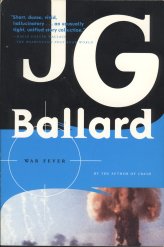 J. G. Ballard's collection of short stories, War Fever, is the only one of the author's books that I've read. In these tales Ballard's shows himself to as a master of extrapolation, in particular with the two stories that close out the book, one a set of 18 footnotes, the other an index for the imaginary autobiography of an imaginary 20th century mover and shaker.
J. G. Ballard's collection of short stories, War Fever, is the only one of the author's books that I've read. In these tales Ballard's shows himself to as a master of extrapolation, in particular with the two stories that close out the book, one a set of 18 footnotes, the other an index for the imaginary autobiography of an imaginary 20th century mover and shaker.
Rereading this one again I remain surprised by the construction, and wonder at the density of the final index-story, feeling like I ought, one of these days, to figure out the story alluded to though the choice of page numbers.
If you write software manuals, you may aspire to the terse but pregnant style of K&R, despairing over ever reproducing it given how much less you understand your material than Kernighan and Ritchie did C. If you write short stories, perhaps you feel the same about some of Ballard's stories.
Posted by Mark at 04:09 PM | TrackBack
February 10, 2006
Defeating Feature Fatigue
Janetta suggested I read Defeating Feature Fatigue, an article that appeared in Harvard Business Review of this month. Roland T. Rust, Debora Viana Thompson, and Rebecca W. Hamilton studied the effects of featuritis on short-term to long-term sales, finding that although feature richness attract folks who haven't yet tried a product, too many features reduce long term sales as even expert users suffer from the complexity of a single product with so many capabilities.
How well does something clearly true for telephones and DVD players map to software? Probably quite well for end user software, like browsers, mailers, and web applications. But what about the software used by people making that end user software or the software and hardware to support its use?
Probably a lot of the same findings still hold. Eric S. Raymond wrote up The Art of Unix Programming, including Basics of the Unix Philosophy, which has perhaps too many rules (17), though they all seem to have the same basic flavor. One that fits the context of this article is the, "Rule of Parsimony: Write a big program only when it is clear by demonstration that nothing else will do."
When we create without knowing what is needed, it makes sense to take a shotgun approach to features. After all feature richness attract folks who haven't yet tried a product, all other things remaining equal. Perhaps the way to Defeating Feature Fatigue for software lies in knowing precisely what it needs to do, and focusing on that. Easier said than done, especially when you're competing rather than cooperating.
Posted by Mark at 09:45 PM | Comments (1) | TrackBack
February 09, 2006
Managed identity hell
In a world of no privacy and full management of your identity by your creditors, we'd end up like this guy who wants to order a pizza, the link to which Lana sent around. Thank goodness I work in software so I know nothing so seamless will every work. Right?
Posted by Mark at 08:27 PM | TrackBack
February 08, 2006
Long time, no book reviews
You probably are not wondering about this, but there's a reason why I've not published many book reviews lately. No, I'm not watching TV instead. I'm rereading the books I have.
Posted by Mark at 09:33 PM | TrackBack
February 01, 2006
2003 UB313 needs a better name
Scientists found what may be considered the 10th planet in our solar system, a Kuiper Belt object larger than Pluto, which they've called 2003 UB313.
The folks naming our products at work must share common ancestry with these guys.
"It can't get an official name until it has an official status and right now it doesn't have an official status, so it can't get a name," he said.
2003 UB313 lies 97 astronomical units away from the sun. TV reception must be awful out there.
Posted by Mark at 10:18 PM | TrackBack
January 29, 2006
Staline et la révolution
 Jean-Pierre Juy who I met through Antonia, my colleague, lent me Staline et la révolution: Le cas espagnol by Pierre Broué. Pierre was a fairly well-known French historian, an expert on Trotsky, revolutionary history of Europe in the 20th century, and so forth. According to Jean-Pierre, most of Pierre's work has not been translated to English. Indeed Amazon seems only to have his book on The German Revolution in English. The rest is in French.
Jean-Pierre Juy who I met through Antonia, my colleague, lent me Staline et la révolution: Le cas espagnol by Pierre Broué. Pierre was a fairly well-known French historian, an expert on Trotsky, revolutionary history of Europe in the 20th century, and so forth. According to Jean-Pierre, most of Pierre's work has not been translated to English. Indeed Amazon seems only to have his book on The German Revolution in English. The rest is in French.
Pierre passed away recently. Jean-Pierre helped set up a retrospective yesterday and this morning at the Institute for Political Studies over at the campus in Gières. I'd never heard of Pierre Broué until Antonia suggested I go to to the retrospective. I went to a couple hours of that. It turned out to be geared for people who know European 20th century history better than the average American (me). Tim and Diane told me they wanted to go along. I think it was a wise decision to leave them at home.
This book gave me the same trouble as the retrospective. If I understand this correctly, part of Pierre's contribution to analysis of events from the historical materialist's point of view is that you fail to tell the full story when you examine history abstractly, outside its social context. In other words you need to know the people you're writing about. So he apparently investigated his subjects quite thoroughly, writing about them when he felt he'd understood the context. (Although one of his colleagues yesterday said his knowledge was both wide and deep enough you had to be pretty good to catch him out when he was extrapolating or making something up to support an argument.)
What I glean from Staline et la révolution is a weak version of what went into writing it, as somebody who doesn't know C at all reading K&R in a hurry. Still Pierre paints a convincing picture of how Stalin's bureaucracy managed in mid 1930s Spain to crush the very sort of thing the communists were supposed to be trying to hasten, according to Marx et al. I put the book down thinking that idealism mixed with organized violence, even "resistance" is probably almost always a poison cocktail.
Posted by Mark at 11:21 AM | TrackBack
Hamas wins Palestinian elections, part V
Yes, I saw the BBC article about Hamas wanting to form an army, "defend our people against aggression," according to the Khaled Meshaal quote. The article gives me the impression the report is digging for ways to see Hamas as unreasonably agressive, although none of the factual content so far points to that conclusion.
Posted by Mark at 11:12 AM | TrackBack
It could be worse
As you can perhaps guess, I read BBC News mainly because of the latest headlines, feed-reading bookmark in Firefox. If it were another source, I'd scan those headlines, like a kid with a TV watches the ads.
Today BBC News is posting that race organizers in Lahore, in the east of Pakistan, are going to have 6000 riot police on site for their mini-marathon. Two members of the police for every five runners. It's not totally clear, but it seems to be a 1 km race. (So somebody should win in less than 3 minutes.) Apparently muslims want to prevent women from participating with the men, and the police are around to prevent disruption of the race. If I understand correctly, under Islam women and men are not supposed to run together. There must be a lot of folks who are upset if organizers think they need that many cops.
I'm glad we only need a few cops when we run here. They're not riot police, either, but instead around to help direct traffic, so runners can concentrate on their races, and drivers don't accidently run anybody over.
The cops I have seen at races are very hands off, very tolerant. Near the end of the Grenoble marathon when I was cramping up so severly I literally couldn't walk, I was physically next to some folks from the police there to direct traffic. They must've thought people like me were completely nuts to be putting our selves through that, almost to the point of needing a representative of law & order to step in and prevent us from harming ourselves, like I'd imagine they'd do if you tried to jump off a tall building for example. Yet they all remained very polite and restrained. Maybe they see lots of suffering.
Posted by Mark at 06:53 AM | TrackBack
January 28, 2006
Hamas wins Palestinian elections, part IV
BBC News has yet another one in this saga. It's primarily a reprint, but there's some that's new and newsworthy:
Israel has indicated that newly elected Hamas legislators will not be granted free access between Gaza and the West Bank.The BBC's Richard Myron in Jerusalem said it means Hamas MPs in Gaza will not be able to travel to the Palestinian parliament in Ramallah in the West Bank, as they would have to cross Israeli territory.
Our correspondent says if Israel does chose to confine Hamas legislators to Gaza, it will make governing the divided territories even more difficult.
So the democratically elected representatives, one of whom in the last article was saying they want a unified government, is going to be prevented from governing, probably for security reasons. In your mind, you can transpose that for your country. Imagine a nearby powerful nation steps in after your election and says, "Sorry, the elected representatives cannot meet because they pose a security risk to us."
Surely Israeli authorities are in good faith, doing this only to protect their population.
I wonder if Richard Myron's going to get in trouble for having stated the obvious.
Posted by Mark at 01:10 PM | TrackBack
Hamas wins Palestinian elections, part III
BBC News is now reporting on clashes between Palestinians. The reporter has done a pretty good job of twisting the English language into giving the reader the impression that Palestinians are a naturally violent people -- the photo helps here, too -- and that Hamas is somehow to blame, although no actual facts in the article point to that interpretation. Instead the Hamas quote this time concerns senior Hamas official Ismail Haniya's views on how their organization wants to build a government:
"When we are calling for unity and partnership it is not because we are afraid or weak or incapable of facing the challenges ahead, but because we believe in unity."
Hey, them's fightin' words! Or at least they sounded that way to whoever in Fatah got upset (or paid) enough to pick up a Kalashnikov.
That must be why the rest of the article is devoted to how the US administration, the European Commission, and Israeli authorities have taken a tough stance on Hamas's election win.
I don't know Hamas from any other political party. Their management is probably like management everywhere, and it'll no doubt all end in tears. On the other hand, it seems like there's still the possibility to prevent breakdowns before negotiations which could save lives, and bring a measure of security and peace to the place.
Maybe in the effort to help that happen a few journalists and editors could step across the normal editorial line. If they were to lose their jobs at the BBC, they're still obviously good at twisting facts around to appear say what they don't. Marketing organizations everywhere are hurting for those vital skills.
Posted by Mark at 10:42 AM | Comments (1) | TrackBack
January 27, 2006
Cold, cold, cold, part II
BBC News has articles today about a Russian gas pipeline into Chechnya that was damaged and left Chechens freezing. This one is reportedly an accident.
Italian authorities are accusing the Ukranians of siphoning off Russian gas.
An interview covers Gazprom's global ambitions:
We would like to transform our company from being the world's leading gas company into a world leading energy company.
If you were a potential Gazprom investor, you might admire management's tough negotiating style and singular focus on getting the most out of their customers. You might however worry that your investment might end up in somebody else's Swiss bank account, too.
Posted by Mark at 08:39 PM | TrackBack
Hamas wins Palestinian elections, part II
BBC News is running a follow up piece to the Palestinian election results story. Israeli authorities apparently declared they won't deal with a Palestinian government including Hamas. That would apparently be seen by Israeli authorities as negotiating with terrorists. It's understandable that if you see an organization as existing mainly to threaten you, you wouldn't want to collaborate with its members, no matter how clearly they got elected.
Interestingly, the BBC News reporter doing this story copied and pasted precisely the same quote from Mahmoud Zahar used in the previous article I cited yesterday. In fact a lot of the new article is a rewrite. Reuse is one way to keep your costs down.
The Israeli position does however hold out what looks like an olive branch. From great distance behind the recycled news I've read in the last 10 hours, it looks like Hamas could come out with a formal statement like, "We don't want Israel's destruction, especially not harm to the Israeli people. In fact, we want to live in peace and freedom with our Israeli neighbors. We renounce all violence except the reluctant violence of self defense. We look forward to negotiating with the Israeli people a end to this longstanding conflict between us, an end to the conflict that protects the safety, dignity, and democracratic rights of everyone on both sides."
On the one hand, it might take amazing faith on the part of Palestinian authorities to hope that Israel, the US, and others would be willing to give the results of the election a chance. On the other hand, I wonder if many cool headed people on both sides don't already feel that way.
Update: According to Aljazeera.net, Zahar is already talking about extending a year-old truce with Israel. Hmm, why wouldn't that get reported by BBC News?
Posted by Mark at 06:46 AM | TrackBack
January 26, 2006
Cold, cold, cold
Another article about a contentious situation in the BBC News concerns how they're freezing in Georgia. Russian authorities maintain that the explosions damaging natural gas lines were perpetrated by terrorists. Georgia's president has another view, expressed in an earlier article:
Mr Saakashvili said the gas pipeline was blown up in "an area fully under Russian control... with a heavy presence of Russian border guards", where there were no local insurgents."They happened at the same time, and basically they didn't affect supplies to Russia proper, so we can conclude that it was a very well-organised and very well-co-ordinated act.
"We've received numerous threats by Russian politicians and officials at different levels to punish us for basically for not giving them pipelines," the Georgian president said.
Not so far away, the Ukrainian government got a vote of no confidence after partially caving in to price hikes for Russian gas. Russian gas producers had cut the Ukraine off for 3 days in the dead of winter to soften up the negotiations.
This all happened after gas prices were doubled, "As part of a series of recent price hikes for former Soviet countries." I'm writing this from the comfort of my (Russian?) natural gas heated home, where it's only a bit below freezing outside.
Posted by Mark at 09:18 PM | TrackBack
Hamas wins Palestinian elections
The BBC News reports that Hamas won a 76/132 seat majority in the parliamentary election there, with 77% voter turnout.
Palestians being probably a lot like the rest of us, statistically speaking, I find this an interesting fact to hold up in comparison to media coverage of the situation in Israel and Palestine. Specifically, if Hamas really is a terrorist organization, why would they get almost 58% of the seats in parliament?
Observers praised the election process, with EU monitoring team leader Veronique De Keyser saying the poll was "free and fair under severe restrictions", referring to Israeli measures to limit voting in East Jerusalem.
So apparently this was a democratic election. Logically then either:
- Palestinian voters on the whole feel so desperate about their circumstances that unlike normal people turn out en masse in free elections to get themselves represented by terrorists.
- A majority of Palestinian voters don't see Hamas as a terrorist organization, but instead as the least bad choice on the ballot.
The article does have one quote from a Hamas representative, co-founder Mahmoud Zahar:
"We are not playing terrorism or violence. We are under occupation," he told BBC World TV."The Israelis are continuing their aggression against our people, killing, detention, demolition and in order to stop these processes, we run effective self defence by all means, including using guns."
Maybe there's a mix of desperation and a different point of view.
Posted by Mark at 08:35 PM | Comments (4) | TrackBack
January 24, 2006
Tour de France to start in London
BBC News says the Tour de France will be starting in London in 2007. They expect a huge turnout.
I wonder how much media coverage there will be for Dana if he rides across the middle of the US from south to north.
Posted by Mark at 08:26 PM | TrackBack
Wireless access at home, part II
Slashdot.org ran an article about the State of WLAN Support on Linux. Somebody out there bought a USB adapter and couldn't get it to work with whatever distro and software was installed.
True, wifi support seems to have come late. Maybe people had to reverse engineer the drivers. Yet with PCI and PCMCIA cards and recent Ubuntu, I've had no problems at all. Matt was working with Fedora something or other and reported success as well. It's working right here on a laptop with some sort of built-in device. I don't know about USB adapters.
My point is this: If you're still using Windows because you're afraid your wireless adapter won't work under Linux, your argument may be outdated. You can probably get your work done with the GNU stack on Linux.
Posted by Mark at 06:58 AM | TrackBack
January 22, 2006
Nexenta OS
 This morning I booted Nexenta OS which is the Ubuntu GNU stack of applications running atop OpenSolaris.
This morning I booted Nexenta OS which is the Ubuntu GNU stack of applications running atop OpenSolaris.
It runs fine on this laptop, though I couldn't find the wireless Ethernet configuration tools, so didn't get on the network. It recognized the Ethernet card, no problem, but I didn't feel like sitting next to the router, nor did I want to root around for a longer Ethernet cable while everyone else is asleep. Had I been able to get to Google, I'd've found this page about wificonfig.
In any case, Nexenta OS looks good, and seems like a brilliant idea for folks who'd like to run Solaris underneath and benefit from features like ZFS, but yet also benefit from tools like apt or Synaptic to manage the software installed on the system. I wonder how well Nexenta OS and Ubuntu would live together on the same disk.
Posted by Mark at 07:04 AM | TrackBack
January 21, 2006
Dapper Drake flight CD 3
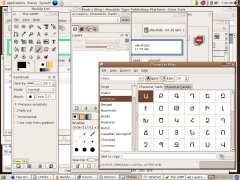 A few days ago the announcement went out that Ubuntu 6.04 (aka Dapper Drake), slated to release in April, was in more widespread alpha testing. Although I figure they wouldn't do what they call "flight CD 3" without first doing flight CDs 1 & 2, I downloaded the LiveCD version to boot and run the system from CD.
A few days ago the announcement went out that Ubuntu 6.04 (aka Dapper Drake), slated to release in April, was in more widespread alpha testing. Although I figure they wouldn't do what they call "flight CD 3" without first doing flight CDs 1 & 2, I downloaded the LiveCD version to boot and run the system from CD.
(Do we do a LiveCD with OpenSolaris? I guess the answer is yes, again yes, and wow! this one looks cool, as long as we means "the set of hackers out there on the Internet." Better review that soon.)
The LiveCD works well out of the box. The only bugs noticed so far are that the network icon seems stuck with a "do not enter" icon, despite the fact that I have wireless Ethernet running fine, and that the device manager won't start. If this LiveCD is a good indicator of what's going to come out in April, the upgrade should be smooth.
Posted by Mark at 08:28 AM | TrackBack
Wired in print
Yesterday I read through the December issue of Wired magazine, which Ludo brought back from the US.
You could say that it's normal for what is essentially the last-minute Christmas shopping issue to have extra ads. This issue was almost nothing but ads, though. Even the articles themselves were infomercials. I found some content between ads, but not much. The message of this medium seemed to be, "Consume! You gotta have more stuff! More!"
No, I don't, and neither do you.
There were a couple of articles aiming to get you on the paranoia bandwagon. They're sort of tongue in cheek, however, with the following quote from Chris Sleat, who works as CEO of a company making software that helps determine whether a patient has been infected with a bioterrorist agent:
"A lot of people are kind of glomming on to this [homeland security] market," he adds, laughing as he pours himself a cup of coffee. "That's capitalism."
There were also a couple of articles on the great things capitalism-fueled, high R&D spending might bring, like substitutes for petroleum, and carbon structures with characteristics that make them better for certain things than steel or plastics (though they're also practically indestructible waste once you've finished using them). Interspersed one finds nerd culture articles. (Somebody's remaking Star Trek again.)
In the end, it's probably pretty cheap if you subscribe. The advertisers have already paid for your copy. Of course you get what you pay for.
Posted by Mark at 06:52 AM | TrackBack
January 19, 2006
What podcasts are you listening to?
Ludo asked today. He suggested the Gillmor Gang, but I haven't tried it.
The last podcast I listened to carefully was an old speech from Martin Luther King (last Monday) that he gave one year to the day before he was shot. The Reverend first explained why he thought the US should end the war in Vietnam, and then described his vision of a revolution of values. The second part is probably why they shot him.
I've also found a series from the Center for Economic and Policy Research covering mainly basic economics and statistics. (Bias: left of US center)
An interesting podcast was an interview with Nicky Hagar, a New Zealand activist, about PR. Cannot recall where I got it. The file I have is NickyHager-PR.mp3. Also listened to Robert Fisk pitch his new book.
I tried balancing that out with some libertarianism. I listened to one show from Against The Grain, an interview with a guy's name I cannot recall talking about FEMA and Katrina and various other aspects of US society that run better under free markets than central planning. I tried listening to the Canadian libertarian candidate interview downloaded from Radio4All.net, but it wasn't vary satisfying. Dad suggested somebody better but the name must be stowed away somewhere in my work mail.
I don't feel like listening to anything that reminds me of work. Both Libertarianism and Gillmor Gang would do that. Maybe I'll try Escape Pod, which Andy suggested. I've downloaded one, but haven't listened yet.
Posted by Mark at 08:43 PM | Comments (1) | TrackBack
January 18, 2006
Not music for running, part II
 Tried listening to Live/Dead while running today. This is the one that starts with a drawn out jam on Dark Star. Geoff Arnold called it, "one of the three greatest live rock recordings in my collection."
Tried listening to Live/Dead while running today. This is the one that starts with a drawn out jam on Dark Star. Geoff Arnold called it, "one of the three greatest live rock recordings in my collection."
The performance itself isn't bad, though somewhat uneven. But somehow it's not for running, or running's not right for this music. It's not something I can put my finger on exactly.
Maybe I should go the other direction entirely, try listening to Glenn Gould.
Posted by Mark at 09:15 PM | Comments (2) | TrackBack
January 13, 2006
In Praise Of Idleness
I ran across this paper in a blog Andy suggested. Bertrand Russell appears to have written In Praise Of Idleness in 1932, at which time he seemed aware of potential problems in the USSR, yet also a little too hopeful about a society that had already by then been divided into the bureaucratic commissar class and the rest, instead of the rich and the rest. Furthermore, Russell defines work either as physically moving stuff, or as directing stuff to be moved. I sort of do the latter in that I instruct machines what to do and write recipes for sys admins and developers. His categories seem to ignore what Drucker called knowledge work, but then he wrote this before Drucker wrote all that.
Anyway, Russell's argument still holds some water. What if he's partly right? Where specifically is he wrong?
Posted by Mark at 08:45 AM | TrackBack
January 11, 2006
Star network, part II
Apparently my guess about a hub-based network at La Poste was right. My package is now in Saint Laurent de Mure, east of Lyon.
UPDATE: If you examine their site, you can see on the popup map of France that they have a delivery office in Grenoble. Saint Laurent de Mure is a hub.
Hope the people sending packages across Nice don't have to have them go through Cavaillon.
Posted by Mark at 06:06 PM | TrackBack
Tough year for constitutions, part IV
2005 was, as I wrote before, a tough year for constitutions. Yet I didn't mention the Kenyan draft constitution voters shot down in November.
BBC News online is now running an article covering opposition leader Odinga's claims that he fears for his life. Sounds a bit rougher than what happened in France.
According to the BBC, Kenyans also voted against the draft constitution because:
Although it was not a vote of confidence on his three year-old administration, there is no question that many Kenyans will have voted "No" in part because they are disillusioned with the government which has been mired in corruption.
That would then explain why Kibaki sympathizers would like to shut down the opposition. The only other thing you have to assume as an ignorant outside observer like yours truly is that politics in Kenya are handled by violent strongmen. The CIA doesn't put it that way, though their article does mention corruption, Kibaki's nearly 2/3 majority victory during elections (significantly smaller margin than Chirac if you remember), and that the Kenyans in 2003 had made progress against the corruption.
Unlike the French news media, the BBC doesn't entirely discredit the idea that some Kenyans might, unlike busy legislators who represent their constituency, might actually have read the text and come to their own conclusions.
Posted by Mark at 07:23 AM | TrackBack
Star network
The other day I ordered some stuff from a store in Grenoble. Perhaps I should've avoided the shipping charges and ridden over there on my bike, but it's inconvenient and shipping the box from the store out to Montbonnot (10 km) shouldn't be an expensive big deal.
Except the French postal Colissimo service appears to be organized as a star network, with the hub being far away in Lyon. That's where online tracking says the package is now.
Maybe something more peer-to-peer is just too hard for the post office to organize. The package is identified at pickup and assigned an ID, so it seems like they have the information in the system by the time they start physically taking anything anywhere.
I wonder if they put everything on a train. Seems like if they transported it by rail, at some point it would have to loop back across precisely the same tracks, as there wouldn't be a large number of stations. Maybe they truck it all the way over there so they can truck it back over here. It reminds me of those flights where you start out in the opposite direction so the airline can take you to the hub.
Maybe the package hasn't moved at all. Only the ID is stored in Lyon.
Posted by Mark at 07:07 AM | Comments (2) | TrackBack
January 08, 2006
Alice in Wonderland & Through the Looking-Glass
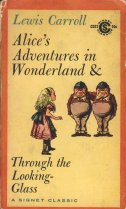 This was the first time I'd read Lewis Carroll's stories Alice in Wonderland & Through the Looking-Glass in their entirety.
This was the first time I'd read Lewis Carroll's stories Alice in Wonderland & Through the Looking-Glass in their entirety.
The paperback is old and full of brittle paper. The stories run on like someone's dream, but the jokes do not seem dreamlike. Were Dogdson's dreams full of language games and little girls? Apparently he also wrote whimsically about non-Euclidean geometries, and found them inferior to the original.
When they give me the MMPI and ask me whether I liked Alice in Wonderland & Through the Looking-Glass, I'll tell them I preferred Borges's Circular Ruins. Borges also sometimes found originals inferior to copies.
Posted by Mark at 08:01 AM | TrackBack
January 07, 2006
Minor hacks
Most of the things I claim to repair are insubstantial. This afternoon, I managed to fix to tiny but real broken possessions: a rake with a broken handle, an under-the-seat bike bag for carrying what you need to change an inner tube.
The workspace downstairs is set up in a functional way, because Michel did all the organizing. It's like getting on a Linux system or Solaris at work. All the tools and materials you'll need are close by and quick to hand. (For OpenSolaris.org to make it with a wider crowd, lucky there's such a thing as the GNU stack.)
The rake now has a thicker, longer handle. The metal raking fingers all seem to be in relatively good shape, despite abuse, and despite the rake being quite cheap.
The under-the-seat bag broke after I started using it with the mountain bike, riding off road. It fastened under the seat with a thin plastic piece, attached by a plastic post. The bumping and occasional crashing led to the post snapping off. It's now fastened with a couple of screws and bolts.
Posted by Mark at 06:23 PM | TrackBack
Online robbery, part III
Well, it's not broken, at least as far as the Internet connection is concerned. I'm going to put in a wireless network at home, however. My hope is to be able to add systems without having to add wires.
I called the telephone number. The program that responds says the number hasn't been assigned yet. I'm curious what has to be done for the number to be assigned. Do they rebuild the database every few hours? Do they have to run a series of test programs? Does Free have to submit some sort of formal request to the telephone company?
Posted by Mark at 01:23 PM | TrackBack
Online robbery, part II
Okay, Free.fr only stole a week, apparently.
The Freebox came this morning. The initial hookup ended in the modem showing ERR 1. The good thing about working in software is that you never expect anything just to work until you've jiggled it a little. Free's help line is reputed to be crap, but they had even thought to send troubleshooting doc! I didn't find ERR 1, but I did find a short section on hard reboot (6 power cycles), and the system seems to have come up all right.
Had to go pick the children up from school, so I haven't tried the Internet connection, yet. Will give it a whirl.
I went online here with the old connection and selected a telephone number. They say it takes 48-72 hours. I hope that's worst case. Theoretically calls to land line phones in France, Germany, the US and several other places are now officially paid for as part of the subscription.
Posted by Mark at 12:11 PM | TrackBack
Third guitar
When I had a new neck pickup put in my electric guitar a couple of years ago, I also bought strings. I was hoping to play more at the time. Since then I have not played much.
The strings were packed in a plastic bag with a label telling me it was made with:
Corrosion Intercept Technology, developed by Bell Labs.... Each Corrosion Intercept bag employs a plastic which contains a gas neutralizing barrier in the polymer matrix. This barrier reacts with an neutralizes gasses which cause materials to tarnish.
It works better than the old waxed paper envelopes. The two year old strings I put on last night sound like new.
Posted by Mark at 10:33 AM | TrackBack
January 03, 2006
The Minority Report
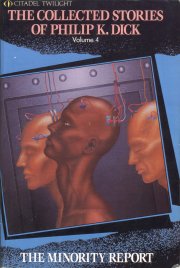 The Minority Report is one of the stories in this fourth volume of short stories from PKD. I'd read it once or twice before, but had forgotten many of the plots. Not his best work, yet the pages keep turning.
The Minority Report is one of the stories in this fourth volume of short stories from PKD. I'd read it once or twice before, but had forgotten many of the plots. Not his best work, yet the pages keep turning.
Most of these stories seem almost within reach compared to later work like Valis. By that I mean it seems that through hard work, dedication, relentless revision, someone could actually write stories this good. Maybe Dick wrote them as fast as he could type. He claims in an appendix to have seen the Perky Pat story in one quick flash, watching his children play with Barbie dolls.
This is going to show my incompetence and complete hopelessness as even a minor creative force, but I'm not sure I even know what he means.
Posted by Mark at 09:36 PM | TrackBack
Surf your weight down
According to a C|Net story:
An About.com online survey of more than 1,500 adults found that losing weight is at the top of the list for nearly half of people who make New Year's resolutions. Of those, 42 percent said their best weight-loss tool will be the Web, where they participate in support groups, subscribe to online diet sites and gather other relevant information.
Gerard Depardieu, when an interviewer remarked how much weight he'd lost, said something like, "Yes, in the last 15 years I've lost about 300 kg."
My brother does IT infrastructure for a business based on this sort of thing, though they get people directly involved in the support for weight losers. Guess those are good stats for the company where he works.
Posted by Mark at 05:42 PM | TrackBack
January 02, 2006
Genuine laughter correlates with superiority
According to the Discovery Channel online, genuine laughter emerges involuntarily and uses a different part of the brain than fake laughter.
The study on which the article is based led researchers to guess that perhaps, "people who spontaneously laugh more are genetically superior to those who hardly ever chuckle."
Fake laughter develops later than genuine laughter. You don't get really good at it until you have to laugh at your boss's jokes. At which point it's obvious that fake laughter correlates with inferiority. How else do you explain having sunk to a position where you have to laugh at those jokes?
Posted by Mark at 09:51 PM | TrackBack
December 30, 2005
Michel's new toy
Michel bought himself a DVD burner for Christmas. He had me install it with some software to capture video and burn DVDs.
A DVD burner is an investment we'll have to make soon as well. They're no longer very expensive. The picture quality is about as good as a mobile news report, which is to say that it looks like regular television rather than home movies.
He's going to start editing the footage when everyone's out of the house and he has some time.
Posted by Mark at 12:36 PM | TrackBack
December 26, 2005
Not music for running
 Although a fire left him with a slightly handicapped fret hand, Django Reinhardt played amazing guitar. His fingers seem to dance around sighing bends and elegant vibrato when he takes the lead. His rhythm is almost more like backup piano in terms of richness of color. The album I have, Autour de minuit, also features Stéphane Grappelli's lyric fiddle. Those guys made great music together.
Although a fire left him with a slightly handicapped fret hand, Django Reinhardt played amazing guitar. His fingers seem to dance around sighing bends and elegant vibrato when he takes the lead. His rhythm is almost more like backup piano in terms of richness of color. The album I have, Autour de minuit, also features Stéphane Grappelli's lyric fiddle. Those guys made great music together.
But it's not music for running. I listened to that whole album of songs between 3 and 4 minutes long one Wednesday while running long. It's better than Christmas carols any day. Yet it saps your strength somehow, like the violin on Vous et moi, plaintive, resigned, lonely. Even the upbeat parts are somehow melancholy. Now what you need as you struggle along in the cold on wooden legs.
Posted by Mark at 04:22 PM | TrackBack
December 22, 2005
The Straight Dope
Mom sent email about The Straight Dope. Slug Signorino, the illustrator, lives in the neighborhood from which Mom just moved. Apparently you can sign up there to receive jokes by email. Their claim to fame:
Fighting ignorance since 1973
(It's taking longer than we thought)
The curious coincidence is that while reponding to Dad in an email discussion, I looked up the US military budget at Google... and one of the top hits was this answer from Cecil of The Straight Dope. Here's an excerpt:
Top ten military budgets. The U.S. spends the most by far, but matters aren't as lopsided as your letter suggests. The WMEAT list (in billions): (1) U.S., $281.0; (2) mainland China, $88.9; (3) Japan, $43.2; (4) France, $38.9; (5) UK, $36.5; (6) Russia, $35.0; (7) Germany, $32.6; (8) Italy, $23.7; (9) Saudi Arabia, $21.2; (10) Taiwan, $15.2. The U.S. military, therefore, spends as much as the next six countries (not 16) combined, with just about enough change to cover Greece ($6 billion). To put it another way, the U.S. accounted for 33 percent of world military expenditures in 1999, a modest increase since Cold War days (28 percent in 1986). Sorry, no breakdown on percentage of the military budget used to suppress dissidents or otherwise deal with internal security.
Cecil's source (WMEAT) "is World Military Expenditures and Arms Transfers, published by the U.S. Department of State," which covers 1989-1999 and was published in 2003. According to the CIA World Fact Book entry for the US, est. 2004 military spending outlays were over $370 billion.
Posted by Mark at 09:29 PM | TrackBack
Peak oil podcast
Another interesting community radio podcast is the Dec. 1 recording of Professor Ken Deffeyes speaking about his prediction for world peak oil production. Deffeyes, a geologist, examines production trends contending, "The methods which M. King Hubbert used to predict the peak of United States oil production can now be applied to world production." (Source is the writeup at Radio4All.net, not perhaps Deffeyes exact words.) It seems Hubbert managed with his methods to predict the peak in US oil production years before it happened in the early 70s. Deffeyes is predicting the peak in world production happens on Thanksgiving Day, 2005 +- 3 weeks.
The most interesting part of Deffeyes's talk comes in the suggestions he offers for softening the impact of a peak in production. He's much more engineer than idealist, looking first to technologies like high-mileage diesel engines, coal gas, and fission-based nuclear energy sources rather than hydrogen fuel cells, solar, nuclear fusion, or drastic lifestyle changes that keep us from moving around. Furthermore, he suggests plausible ways for presently rich oil companies, who because production is peaking don't want to sink all their resources into new exploration and drilling, to get in early on these markets that will grow and should grow as alternatives to oil. His seem like ideas that fit current conditions and systems. Maybe some of them will help stave off serious recession and worse.
An interesting observation Professor Deffeyes makes in response to one of the audience questions is that combination fission/fusion reactors are probably possible today. His take on pure fusion sounded like the way we look at real-time voice translation software. It's been just around the corner for about 50 years. Perhaps an engineering compromise in that area would be a good one.
Posted by Mark at 07:49 AM | Comments (2) | TrackBack
December 20, 2005
Free as in libre
Over on ZNet there's an interview with Richard Stallman, in which he explains the difference between free software and open source, and why he's for free (as in liberty) software even if in the beginning it seems tougher to use.
From a certain vantage point, he's a stranger encouraging a society of heroin addicts to dump the pushers and the dope. In the beginning it might be a little rough, but you'll get over it.
The interviewer admits ZNet runs on non-free software, has a hard time believing they'll be able to kick the habit. This is ZNet, "The Spirit of Resistance Lives."
Somewhere there's a fortune cookie that sums it all up. Some people look at the most amazing things human beings know how to do, and they see us making progress. Pushing the envelope. In fact that sort of progress is slow and fraught with setbacks. Real progress comes when we know how to do something so well we don't have to think about it. There's a lot of real progress we still have to make.
Posted by Mark at 09:46 PM | TrackBack
December 19, 2005
Community radio podcasts
After dropping mom off, I listened to a podcast from New Zealand in a series called "Under the Radar." The interview was with Nicky Hager, an author who's written on a number of issues including PR campaigns and tactics employed.
As I listened, Nicky said if you end up in a situation where you expose underhanded political action by paid PR professionals, their first tactic will be to paint themselves and their clients as victims. Their second tactic will be to move to discredit your work by getting "impartial" third-party testimony aimed at weakening whatever you've said based on your evidence. Almost never will they examine the actual evidence itself to argue directly with the logic of your argument.
The first time I went to Radio4All.net was to get some of the Wizards of Money episodes, but it was mentioned by the folks who recorded Robert Fisk talking. Interesting idea. They have all manner of podcasts there. Some are better than others. Seems like they must have a sort of "more the merrier" approach to uploads. I guess you just ignore the noise.
Posted by Mark at 09:02 PM | TrackBack
December 18, 2005
Vitamin D as a potential ergogenic aid
BBC News online is running an article about findings that suggest higher levels of vitamin D correlate with healthier lungs. It's not clear yet whether taking in more vitamin D by eating foods high in vitamin D or taking supplements would help.
It's also not clear whether high levels of vitamin D would help you run faster. Has anybody even been looking into it?
Well, I noticed something at the end of the article about vitamin D. Not only is it produced by the body exposed to sunlight, but:
It is also contained in a few foods including oily fish, fish oils, butter and eggs.
So I'll volunteer for the study where you sit around eating smoked salmon and cookies, then run on the treadmill.
Posted by Mark at 10:12 AM | Comments (2) | TrackBack
December 16, 2005
Wave of dementia
According to a BBC News article, the wave of dementia is coming as the population ages. The editor picked a photo of old Chinese folks to illustrate the growing trend, because China is expected to be hardest hit.
According to Wikipedia, dementia is:
Progressive decline in cognitive function due to damage or disease in the brain beyond what might be expected from normal aging. Particularly affected areas may be memory, attention, language and problem solving.
Like, Dude, I know some people who caught this wave early, Dude.
Posted by Mark at 08:32 AM | TrackBack
The Daily Drucker
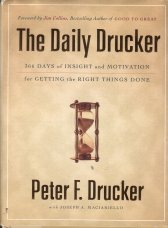 Dad has given me several books by Peter Drucker, described in the jacket of the The Daily Drucker as "the top management thinker alive today." (He was alive when the book was published.)
Dad has given me several books by Peter Drucker, described in the jacket of the The Daily Drucker as "the top management thinker alive today." (He was alive when the book was published.)
Peter Drucker certainly wrote and thought a lot about management, from the 1930s until the end of his life this year at age 95. He saw some trends apparently long before others, like the post WWII transition of the economy from being propelled primarily by physical industrial activity to being pushed ahead as well and perhaps primarily by what Drucker calls knowledge work.
Those who see themselves as managers would do well to read Drucker's work, but I doubt they should buy this particular book first. Each day's entry comes without its original context. Drucker can be tough to follow out of context, because his arguments build on observations and things he worked out in the past. These pieces may be forceful, but they're not parables. (In fact, it was the bookmark ribbon that made this book really hard to start. Even my NRSV Bible has no bookmark ribbon.)
Furthermore, the content is marred by the ACTION POINT summary suggestions on each page. Granted, the executive no doubt should do some of the activities suggested, but quite a few of them overinterpret what you just read, weakening the very Yancy-like effect Drucker is supposed to have on you. If you leave your thinking up to someone else to the extent proposed, you're a very dangerous manager indeed. Shut down your IM and your email, turn off your phone and your television, and give yourself time to think.
All that aside, The Daily Drucker provokes thinking. You cannot help but think when reading Drucker, which is why I missed the context. When he advances, as in the November 18 entry, "Like every other institution that coordinates human efforts to a social end, the corporation must be organized on hierarchical lines," enquiring minds want to know how he came to that conclusion. When he talks about a "free and equal society," do I just gobble that down, despite the evidence that my interactions under capitalism -- mainly working, investing, buying, selling -- are governed by feudal rules? The answers aren't in here.
As a survey of Drucker's thinking, I presume this book is not too bad, however, meaning it's very good. There is a lot to work with here, a lot of challenges posed.
Posted by Mark at 08:02 AM | TrackBack
December 13, 2005
Music for running, part VI
 For a lot of the uphill part of today's run there was a strong lactate burn in the top of my stomach. When I got to the peak of the shortcut most of the way uphill, I was also gasping. They've been feeding me cheese at home, first raclette, then pizza.
For a lot of the uphill part of today's run there was a strong lactate burn in the top of my stomach. When I got to the peak of the shortcut most of the way uphill, I was also gasping. They've been feeding me cheese at home, first raclette, then pizza.
You figure a lot of Jerry Garcia's suffering was in the downhill parts of whatever he did to himself. Whatever it was there's a certain relativism in the face of discomfort that comes through the music. Most of the songs are inspired as well.
Posted by Mark at 10:10 PM | TrackBack
December 12, 2005
Music for running, part V
 Icy cold air, gray skies, this album. There's something about the bell-like Stratocaster sound that lends itself well to that atmosphere.
Icy cold air, gray skies, this album. There's something about the bell-like Stratocaster sound that lends itself well to that atmosphere.
The Wall, in particular Comfortably Numb, reminds me not of seeing the concert in Berlin, but instead of raking leaves in the dead of Terre Haute winter at Rose-Hulman.
This one's less despairing, and less exhausting than The Wall, less cynical, and less polished than Animals. A little too smooth, still, but easy to listen to as you jog along.
Posted by Mark at 10:18 PM | Comments (1) | TrackBack
Google transit
Google Transit looks like a cool idea. Unfortunately it's like Google Maps. Doesn't work in France.
Posted by Mark at 08:37 PM | TrackBack
December 10, 2005
The Quanity Theory of Insanity
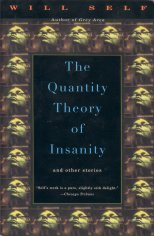 Casting about for lighter reading as I trundle through The Daily Drucker, a collection of excerpts from writings of the late management guru Peter F. Drucker, I went back to Borges (of course), then to briefly to Lewis Caroll, and came around again to Will Self's short story, The Quanity Theory of Insanity.
Casting about for lighter reading as I trundle through The Daily Drucker, a collection of excerpts from writings of the late management guru Peter F. Drucker, I went back to Borges (of course), then to briefly to Lewis Caroll, and came around again to Will Self's short story, The Quanity Theory of Insanity.
This fictional autobiographical account of how Harold Ford painstakingly lumbered towards the Quantity Theory, and how he then recoiled from its shameless exploitation by what he clearly sees as lesser and more compromising intellects. Besides the clinical brillance with which Self demolishes the protagonist in his very own words, the story fits quite well with each of the five others in the book, meanwhile poking great fun at researchers everywhere. Next time you see this in the public library, sit down for an hour and enjoy yourself.
Posted by Mark at 07:04 AM | TrackBack
A man's gotta do...
...what a man's gotta do. Some of it may not be palatable. I got up from the dinner table last night to empty a mouse trap. The mouse had gone for the bit of reblochon. Its head had been partly crushed by the thick wire of the spring, just above the neck. Its dark eyes were wide open. They seemed to look into mine as I took the trap outside in the dark to toss the limp body into the bushes.
But may there are things a man's gotta do that on reflection he doesn't really gotta. Take for instance this BBC News story of a guy who shot a 73 year-old nun dead. It was in self defense, according to the guy who did the shooting. Dorothy Stang said, "The weapon I have is this," and pulled a Bible on him.
This was not the first explanation advanced by the defense, however. According to the story, the killers first said they shot her several times close up while she was reading from the Bible. Furthermore:
Many landowners in the area have openly argued that Sister Dorothy's murder was in legitimate defence of property.
So maybe there was a bit more going on behind the scenes.
Posted by Mark at 06:47 AM | TrackBack
December 06, 2005
A Widow for One Year
 A Widow for One Year by John Irving is another one Ludo lent me. This book was sitting on my night table for a very long time, probably because the cover and title somehow made me uncomfortable. Once I started reading, I finished the 668 pp. book in less than a week.
A Widow for One Year by John Irving is another one Ludo lent me. This book was sitting on my night table for a very long time, probably because the cover and title somehow made me uncomfortable. Once I started reading, I finished the 668 pp. book in less than a week.
Must give up reading novels by good writers. Borges's short story on Tlön, Uqbar, Orbis Tertius finishes with the author revising "an uncertain Quevedian translation (which I do not intend to publish)" of a minor work by Sir Thomas Browne. I went back to man pages covering replica and replication agreement configuration.
Irving, as much as Kingsolver a couple weeks ago, shows me even his minor characters are more alive than I am. Then as if to rub it in, he's writing about writers writing about writers writing, demonstrating the difference between telling a story and recounting your own life. (In this sense his book, with it's infuriatingly well-placed parenthetical summaries of people's motives, things you should've figured out for yourself already, is even technical documentation, telling the reader how to write.) If only the same sick impulse that lets me run many miles a week could force a man to write!
Anyway, the book left me turning the pages, glad the train was delayed this morning so I had more time to read. Sorry, Ludo, for taking so long with it.
Posted by Mark at 11:01 PM | TrackBack
Jammin' in Jamaica
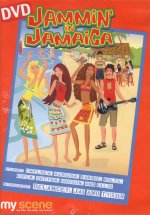 Diane's favorite movie of the moment. This one took over from Disney's Mulan and Robin Hood.
Diane's favorite movie of the moment. This one took over from Disney's Mulan and Robin Hood.
In this 2002 short DVD film, Jammin' in Jamaica™, Mattel™ has Barbie™ in a quandry: how does she get her parents to fly her to Jamaica where her boyfriend's band is playing in something called the Beat the Beat™ contest, so they can win a recording contract with some groovy record guy (who I suspect is the return of the son of one of those executives from Joe's Garage).
Anyway Diane is so into the intrigue, wherein Barbie gets to Jamaica to hang at the beach, party (no sex, no drugs, just rock & roll), and do some cool shopping with her friends who are all shaped like her and dress more or less like her although they ostensibly belong to various strains of the human race, as do their boyfriends who look more or less alike. Some of them even have accents, but of course no one is overweight and every adolescent's skin is immaculate.
Could you guess it has a happy ending? Diane watches this one about twice a day lately.
Posted by Mark at 10:25 PM | Comments (1) | TrackBack
November 29, 2005
Worldaround electricity, etc.
Jon Udell's radio blog from today suggests Web 3.0 activities like negotiating your own electicity sources and your own air taxi to wherever you're flying. He'd written about these things way back in 2004 and 2002.
Bucky Fuller proposed a solution in his 1980 book Critical Path. Back then we weren't all going to have to run personal Enrons. The idea was more that we already had the technology, 25 years ago and earlier, to build a worldaround electric grid with infinitely more upside than being free, "To expose my electricity consumption to price-sensitive management both by me and by a management service."
Posted by Mark at 09:10 PM | TrackBack
Robert Fisk on the Middle East
Miguel de Icaza posted a link to a talk by Robert Fisk, who covers the Middle East for The Independent. (Bio from Wikipedia)
Unlike NGF proteins, the topics are such that everyone has an opinion or two. Most of us have lots of opinions on whole ranges of subjects. The corresponding value of those opinions due to the law of supply and demand is predictably low. Fisk however seems to have spent considerable time and effort examining some situations up close. What's good is that most of what he provides in this talk are facts, i.e. he's a revisionist.
Posted by Mark at 05:40 PM | TrackBack
November 28, 2005
Broadband subscriptions up in Europe
BBC News has an article about the boom in home broadband access in Europe. Apparently the boom's predicted not to last, with saturation coming when 60% of households have broadband. Maybe wireline services will top out at that sort of penetration.
This morning I was sitting across the aisle in the train from a teenage boy watching a music video on his mobile phone. My guess is that if we get to accessible wireless broadband, then the saturation point won't be 60% of households, but closer to whatever the penetration rate is for mobile phone-style devices, of which people may have several, such as a phone, a video device (personal TV set), a webtop, maybe a small digital music device, and things I've not thought of yet.
Posted by Mark at 08:22 PM | TrackBack
November 27, 2005
Double or nothing
The New York Times online -- registration required, with some constraints that render it impossible for me ever to recall either my ID or my password -- is running an article about pension funds starting to push real money into hedge funds. If you thought having your index fund manager buy GOOG was a problem, you must not have money in a pension fund. According to the article, pension funds account for "40 percent of all institutional money," and their investments in hedge funds are growing exponentially.
Of course the author has to write something about how safe this all is, but it's driven by reasoning like that of the managers at General Motors:
The company is using hedge funds, along with other unconventional investments, in hopes of getting something close to stock market returns without the market's volatility, Mr. Dubrowski said. To pay out the $6.5 billion G.M. owes to its retirees each year, the pension fund must produce annual returns of a little more than 7 percent. Otherwise, G.M. will have to dip into the fund's principal. At current interest rates, G.M. cannot get those returns with bond investments, and if it tries to juice returns by betting on the stock market, it will have to cope with market swings.
Translation: We didn't know how to manage our pension fund, so now we're playing Ponzi games and buying lottery tickets in the hope that we'll be working somewhere else when stuff hits the fan.
My guess is that hedge funds play an appropriate role when they're used as hedges. In other words, when they're used to balance the risk of other investments supposed to provide the expected gains. Inevitably though they've given off the strong scent of tulip bulbs, and that scent has been blow into the noses of people "managing" your retirement money. Watch what happens as a few of them come back with early high returns.
(Early large winnings correlate with addiction to gambling.)
Posted by Mark at 09:47 AM | TrackBack
La chanson de Colombano
 Ludo lent me this book, which is set in and around the village of Chiomonte over the Italian border from here. Alessandro Perissinotto wrote La chanson de Colombano after investigating this odd mountain song about Colombano digging a high canal, narrowly escaping lynching for the alleged murder of a family. Investigating the folklore of the mountains around here, Perissinotto'd heard an old woman sing the partially forgotten stanzas, and wanted to know more.
Ludo lent me this book, which is set in and around the village of Chiomonte over the Italian border from here. Alessandro Perissinotto wrote La chanson de Colombano after investigating this odd mountain song about Colombano digging a high canal, narrowly escaping lynching for the alleged murder of a family. Investigating the folklore of the mountains around here, Perissinotto'd heard an old woman sing the partially forgotten stanzas, and wanted to know more.
His investigations eventually resulted in this detective story. A young judge named Ippolito investigates the murders, then the reasons why some powerful folks might want Colombano dead. The perfect story for late fall, with winter descending from the mountains.
If you want to find out what happens, you'll have to read the Italian or the French translation. Amazon.com lists only two books by Perissinotto, Il testo multimediale and L'anno che uccisero Rosetta.
Posted by Mark at 09:12 AM | TrackBack
November 26, 2005
Music for running, part IV
 In the dark and the cold, either you listen to music that takes you away from the conditions outside, or you listen to music that takes you even deeper into the dark, the cold, the winter nightmares. Larks' Tongues in Aspic is music of the latter kind.
In the dark and the cold, either you listen to music that takes you away from the conditions outside, or you listen to music that takes you even deeper into the dark, the cold, the winter nightmares. Larks' Tongues in Aspic is music of the latter kind.
Bill Bruford is reputed to have left Yes for King Crimson to explore the darker side of music. For a long time this album would've been classified as progressive rock, but it always strikes me as regression back to the time of Hieronymous Bosch and the inquisition.
What does that have to do with running? In normal, pleasant running conditions, probably nothing. It fits, however, with cold, stumbling, fog, gray light, and the general menace of early winter snow.
Posted by Mark at 03:04 PM | TrackBack
November 23, 2005
Taxing frequent flyers
BBC News online has an article mentioning French government approval of Jacques Chirac's plan to add a tax to plane tickets "to boost aid for the world's poor."
According to an earlier article:
The tax will contribute to the International Finance Facility for Immunisation, a body set up by donor countries to buy vaccines.
There doesn't seem to be anything long term in view. I wonder which pharmaceutical company's going to be selling those vaccines. Maybe people at Air France and KLM should've contributed more to Chirac's last campaign for reelection.
Posted by Mark at 10:15 PM | TrackBack
Dumping the shopping cart
Granted I live in France and want to read books in English, which makes me unusual. But I just dumped out my shopping cart at Amazon.com. The cost of the books was about $49, but the cost of shipping -- to receive things in 36 days -- was $23. It just seemed like too much.
Amazon.co.uk may be a better choice, though they seem to have an expensive shipping scheme for Western Europe. And banks are starting to award themselves commissions for currency trading done on your bank card.
For some reason the books I was looking at could be had in English at Amazon.fr... except that you pay double. Maybe it'll all be good to Amazon shareholders, since they'll eventually make money in shipping and handling. Doesn't make me want to buy their stock, at a P/E of about 40, nor buy anything from their stores.
Posted by Mark at 09:55 PM | Comments (2) | TrackBack
November 20, 2005
Parecon
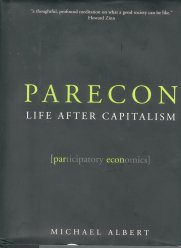 You can read Michael Albert's book, Parecon, online. Although you probably won't when you see the subtitle is Life After Capitalism. Just ignore this blog entry.
You can read Michael Albert's book, Parecon, online. Although you probably won't when you see the subtitle is Life After Capitalism. Just ignore this blog entry.
Albert's book discusses his vision of a participatory economic system, parecon. Parecon relies on planning, rather than markets, to drive production and allocation. But not central planning. A parecon has every participant involved directly and iteratively in requesting, allocating, producing, and planning. Albert starts from the premises Hahnel reaches in ABCs of Political Economy about what we want from the economy, applying the principles to arrive at parecon. He further compares parecon to market, centrally planned, market socialist, and bioregionalist economies to demonstrate how parecon better fits the principles from which he went forth. Of course if you don't agree on the principles, you'll reach a different conclusion, but the principles themselves are fairly well defended in this book.
Albert then explains parecon for the non-economist covering ownership, councils, job complexes, remuneration, and allocation, also providing a hypothetical parecon to give body to the abstractions. This vision, like an external specification in software, doesn't describe everything. Indeed, since participation is the the core of the system, participants are not expected to follow the vision exactly, but instead to adapt it to their circumstances and preferences. So long as an implementation fits the vision (external specification), it's still a parecon. Another way of looking at it is to say there are lots of different recipes for pizza.
Finally Albert rebuts criticisms of parecon that he's encountered, addressing questions about productivity and efficiency, but also about whether parecon would be too invasive, too inflexible, out of touch with basic human nature, or somehow generally impossible to implement.
The very last point addresses my own criticism. Albert's proposing a significantly different economy from the ones we have today. In software, you'd say some of the backwards incompatibilities are going to put the brakes on widespread deployment. For example, from the chapter on ownership in a parecon:
In short, we simply remove ownership of the means of production as an economic consideration. Property in the form of means of production becomes a non-thing.
Not that the rest of parecon wouldn't, but getting to the point where means of production are not owned would probably be hard to achieve in practice. Not because it would in fact be hard to switch, but that people who stand to lose their existing privileges of ownership would likely resort to force to return to the former circumstances, and the people who own the means of production have overwhelmingly more force to apply.
At least coming up with a realistic implementation would be interesting work. I wonder how it's been prototyped.
Posted by Mark at 06:33 PM | TrackBack
November 17, 2005
Pigs in Heaven
 Barbara Kingsolver's book, Pigs in Heaven, tells the story of several people who lost family struggling through many difficulties to get back to it. After all the non-fiction, science fiction, detective stories, stories by guys, it seemed like the story got off to a very slow start. Kingsolver spends a lot of time getting you involved in her characters.
Barbara Kingsolver's book, Pigs in Heaven, tells the story of several people who lost family struggling through many difficulties to get back to it. After all the non-fiction, science fiction, detective stories, stories by guys, it seemed like the story got off to a very slow start. Kingsolver spends a lot of time getting you involved in her characters.
Kingsolver does such a good job, however, at making you believe her characters and at getting you to appreciate them that you get drawn in anyway. You keep reading to find out how Annawake's going to help resolve Turtle's custody, whether Taylor's going to fight so hard she ends up putting her and Turtle's lives into jeopardy, whether Alice is going to declare herself Cherokee or not.
There's a strong family message amidst the characters, showing one case where the family can work out a thorny legal problem and save the emotional day in a way that allows potential adversaries to live happily ever after together. At the same time the family is getting exterminated by the legalistic, individualist, anti-family tendencies in the surrounding society.
You don't have to go all the way from white America to the Cherokee nation to see that sense of family disappearing. It was obvious the first time I met my wife's parents in their home town, that family looks quaint already to my generation. The episode I recall was years ago. We were eating at the kitchen table in Nath's parent's house. Michel and Colette were catching up with the gossip about everybody they knew in Desvres. They seemed genuinely interested, eager to know who was up to what. For a male American of my background, it was a visit to an alternate universe. So was this book.
Posted by Mark at 09:54 PM | TrackBack
November 15, 2005
Surfing the anti-empire wave, part II
BBC News is running another story on the Chavez-Fox tiff. According to the article, only 5 of 34 nations' representatives are opposed to turning the Americas into a free-trade area.
Posted by Mark at 08:51 PM | TrackBack
November 14, 2005
Daisy Miller
 Henry James, Mom once said, was her favorite author. Maybe she's changed favorite authors since then. When I saw the opportunity at the bibliothèque anglophone to read just a little Henry James, I decided to pick up Daisy Miller.
Henry James, Mom once said, was her favorite author. Maybe she's changed favorite authors since then. When I saw the opportunity at the bibliothèque anglophone to read just a little Henry James, I decided to pick up Daisy Miller.
Daisy I could not understand. Nor could I understand Winterbourne, the young American who falls in love with her, though he can hardly admit it that way to himself. All the cast of characters seem fiercely corsetted by social circles that leave Winterbourne, "as stiff as an umbrella," although he's young enough to be at university. Are we any different today?
Henry James's manicured English leaves me thinking, Yes, I'm much coarser than people were in his day. Or at least in his writings. Perhaps his is the world my grandparents remembered when they hankered for the good old days.
Posted by Mark at 08:09 PM | Comments (2) | TrackBack
November 13, 2005
No music for riding
There won't be any music for riding. For the ride this morning I tried music without too much dynamic range. It was clear before I started that I wouldn't be able to listen to Glenn Gould playing piano, or The Planets, or King Crimson.
After only a few minutes out I realized however that only on steep climbs would I be able to hear the sounds as real music. For all the descents I'm lucky to hear some of the percussion. Even at my average speed of around 30 kph, there's no such thing as low notes. All subtleties are gone. Turning the volume up further would perhaps be bad for my hearing. Maybe I need to download some of the stories from that SF podcast blog Andy recommended.
Posted by Mark at 02:30 PM | TrackBack
November 11, 2005
Music for running, part III
 I've been listening to some old music. 1968 was in a way the apex of what Hendrix seems to have left in terms of studio work. And I don't think it's because he didn't get perhaps even better. Granted, Axis: Bold As Love includes music that still sounds good even after the hippies cut off all their hair, got married, eventually had grandchildren, and now watch that little stock ticker at the bottom of the CNN window. Even most of the tunes that didn't become classics, unlike the title song, If 6 Was 9, or Little Wing, tunes like Spanish Castle Magic, Castles Made of Sand, or One Rainy Wish come off as masterpieces of casual brilliance. But it sounds like this guy could walk in the room, tune the guitar, and more than half the time come up with something you'd still want to listen to again and again more than 35 years later. As though he didn't have to work at it at all.
I've been listening to some old music. 1968 was in a way the apex of what Hendrix seems to have left in terms of studio work. And I don't think it's because he didn't get perhaps even better. Granted, Axis: Bold As Love includes music that still sounds good even after the hippies cut off all their hair, got married, eventually had grandchildren, and now watch that little stock ticker at the bottom of the CNN window. Even most of the tunes that didn't become classics, unlike the title song, If 6 Was 9, or Little Wing, tunes like Spanish Castle Magic, Castles Made of Sand, or One Rainy Wish come off as masterpieces of casual brilliance. But it sounds like this guy could walk in the room, tune the guitar, and more than half the time come up with something you'd still want to listen to again and again more than 35 years later. As though he didn't have to work at it at all.
Great for easy jogs and short outings like this morning.
 So what's disappointing about Electric Ladyland must not really be Hendrix. I've concluded that by that time these guys were taking drugs long before finishing the job, mixing down to the master in a kind of purple haze that led away from tightly scoped content into a world of slack-jawed awe where even recording hiss sounds prophetic. Case in point: 62 seconds of mildly interesting tape noise called Moon, Turn The Tides... gently, gently away. Yes, he's a Voodoo Chile and a merman, but you wish you had a better recording than this one made on somebody's portable cassette recorder left to run in the back of the garage. And they claim the version I bought is remastered (presumably by someone sober and focused).
So what's disappointing about Electric Ladyland must not really be Hendrix. I've concluded that by that time these guys were taking drugs long before finishing the job, mixing down to the master in a kind of purple haze that led away from tightly scoped content into a world of slack-jawed awe where even recording hiss sounds prophetic. Case in point: 62 seconds of mildly interesting tape noise called Moon, Turn The Tides... gently, gently away. Yes, he's a Voodoo Chile and a merman, but you wish you had a better recording than this one made on somebody's portable cassette recorder left to run in the back of the garage. And they claim the version I bought is remastered (presumably by someone sober and focused).
Posted by Mark at 05:32 PM | TrackBack
Our Friends from Frolix 8
 Philip K. Dick published Our Friends from Frolix 8 in 1970. A couple of hundred years in our future, the struggle for power pits humans with giant brains against humans with psychic powers. They split the spoils in a sort of two-party system that leaves most of earth's 6 billion people, those who haven't evolved, out in the cold, in danger of getting locked up for crimes like drinking a beer, jaywalking, or reading subversive material.
Philip K. Dick published Our Friends from Frolix 8 in 1970. A couple of hundred years in our future, the struggle for power pits humans with giant brains against humans with psychic powers. They split the spoils in a sort of two-party system that leaves most of earth's 6 billion people, those who haven't evolved, out in the cold, in danger of getting locked up for crimes like drinking a beer, jaywalking, or reading subversive material.
One man has left on a spaceship to find alien help, which he eventually does. Yet the real story revolves around the shambling interpersonal failures, and in particular the doomed relationships of a regular guy named Nick, a tire regroover by trade who gets mixed up almost by accident in the drama of the world being more or less rescued.
Not PKD's best, but more mildly Kafkaesque commentary and an odd look at what it's like to be human. The loser's story is always as interesting as the winner's, and even most of the winners are losers.
Posted by Mark at 04:49 PM | TrackBack
November 07, 2005
Why torch your neighbor's car?, part II
 BBC News has published yet another article on French youngsters burning cars and endangering the police officers sent in to stop them. They don't seem to mention what some guy from Le Monde was saying on the radio, which is that all the violence came to a halt last night during a televised soccer match.
BBC News has published yet another article on French youngsters burning cars and endangering the police officers sent in to stop them. They don't seem to mention what some guy from Le Monde was saying on the radio, which is that all the violence came to a halt last night during a televised soccer match.
Journalists don't seem to be able to approach the kids Sarkozy has called racaille. But they have been able to get this from the authorities:
Some countries, including the UK, urged their citizens to use "extreme care" if travelling in the affected areas.
That's right. If you're a retiree from the south of England planning a holiday this week in the ghettos of Paris or Toulouse, you can still go, but use "extreme care."
Other people are talking about "civil war." The same guy from Le Monde joined in with other journalists who've heard kids are breaking all the stuff to get their neighborhoods into the "Top 10."
Since the moral standards of those who bring us our newspapers, TV shows, and radio programs could never be called into question, they must simply be too busy to notice what they're actually saying. Thus journalists are battling each other to bring you exclusive, up-to-the-minute coverage of kids with questionable judgement competing violently for a spot on the Top 10 list of Gangstas in the News.
Posted by Mark at 08:26 PM | Comments (1) | TrackBack
November 06, 2005
The Blind Watchmaker
 The Blind Watchmaker is another book by Richard Dawkins. In The Blind Watchmaker, Dawkins looks at how good a job Darwininan theory does at explaining life on earth as compared with alternative explanations.
The Blind Watchmaker is another book by Richard Dawkins. In The Blind Watchmaker, Dawkins looks at how good a job Darwininan theory does at explaining life on earth as compared with alternative explanations.
One of the things he did on his early 80s Macintosh was create a little program to generate when he called "biomorphs" and through a sort of not-so-natural selection whereby the user chooses a favorite at each alternative step. (Click here for Frits Beukers's Java applet version.) The biomorphs start as a single segment that grows by branching symetrically, with the branching governed by formula that can mutate a little for each generational branch. Dawkins originally expected to grow trees this way, but it turns out that all manner of stuff evolves. The critter on this blog entry is an example.
Dawkins gives fine arguments of how eyes, echolocation, and even DNA can evolve according to natural selection, and how it makes more sense statistically speaking to explain what we observe by natural selection than by any alternative he mentions, creationism being the most well-known, though a range of other alternatives have been taken more or less seriously from time to time.
Theories that hold up as well as natural selection, yet explain quite a bit, seem rare. If we define theory narrowly as, "a well-substantiated explanation of some aspect of the natural world," few -- quantum field theory, relativity, maybe plate techtonics -- come to mind that look as defensible.
Looking at this the other way around, an enormous amount of our beliefs arises from something other than very defensible theory. Of course some beliefs come from logical extensions of other beliefs. That's how we got to the fundamental theorem of calculus. That's also how we can follow a flying bird as it goes behind the house and then reappears on the other side. But I guess that most of our thinking falls in between understanding Leibniz and following basic motion. And most of that thinking is on shaky ground.
One aspect I liked of The Blind Watchmaker is shared by The Selfish Gene. Both books give a sense that even today's certainties are probably soon going to be a silly as yesterday's now seem. I'm hoping we can look back and laugh, rather than groan.
Posted by Mark at 05:21 PM | TrackBack
The doc is out there
This morning I've rebooted under Ubuntu 5.04 because I already have an rsync script set up there. What it does is gets the latest version of mcraig.org including this blog copied to my local disk. That way if anything goes wrong at mcraig.org, I can just copy the whole thing back up there.
So I run my script and boom:
ssh_exchange_identification: Connection closed by remote host rsync: connection unexpectedly closed (0 bytes received so far) [receiver] rsync error: error in rsync protocol data stream (code 12) at io.c(359)
If you're like me, you have no idea what might have happened at line 359 in io.c. But you do have Google. Two clicks later, I get to an email answer from last Thursday:
I've noticed that somehow rights of some directories are changed during rsync-ing. So I've tried to reset rights (added write access for owner) in all directoris recursievely after each rsync try. I don't know if this was the reason but this is 1st time for more than 2 weeks now it succeeded!
Ah! Yes, it's true that I've probably been in there as a different user. A quick chmod -R and it works like a charm. Don't tell my boss I could be replaced by a web browser and Google access to the world's mailing lists. On the other hand, every time this happens I'm more convinced our internal mailing lists would be a big help to sys admins and developers everywhere.
Posted by Mark at 11:19 AM | TrackBack
November 04, 2005
Lexxe search engine
Stu sent a link for something called the Lexxe search engine, which is supposed to answer natural language questions. It's Friday afternoon and I'm getting tired of this, so I asked it, "When will I retire?"
At the outset of a page full of useless and unrelated results, I got this:
Tip: Lexxe is not a dialogue machine. Please ask questions about facts.
About 25 years to go. Right, Kurzweil?
Posted by Mark at 05:57 PM | TrackBack
October 30, 2005
Info value increases with sharing
According to Reuters, IBM is linking it's software for enterprise search with Google's desktop search tool. IBM's VP of content management claims the IBM software helps employees get at content that's not posted:
Typically, it is hard to reach inside a company except by trawling through many different programs.
That makes me wonder how much Google indexes of Sun's internal email archives would be worth. At Sun the formula for the elixir of eternal youth is probably right next to somebody's recipe for the philosopher's stone about 8 indentations down in some email thread that nobody can search out because that alias only got archived on individuals' machines.
The expansion of open source software grew with web search capabilities. That correlation could be like ice cream sales and deaths by drowning. Ice cream sales and drownings go up with temperature. Open source and web search usefulness go up with network accessibilty. But mere network access isn't going to result in heavy sharing for all sorts of new stuff. You have to be able to find out about it.
Today it's still often easier to learn about things going on outside the company, because you can stumble over them in a search. There's a tendency to want to protect intellectual property carefully, in the same way you do your financial information or customer relationship data. Perhaps there's a portion of that data in a state where you don't want to share it too openly. (Not sure what.)
But are we really benefitting for example from people posing (and then of course answering) the same question multiple times on widely read internal aliases because they couldn't easily find it with an intranet search? Are we benefitting from people tending to start their own solution to a problem doubtless already solved internally by someone else because they couldn't find it with an intranet search?
The value of the information in these solutions clearly increases with sharing. And those are just two things I can think of off the top of my head with the children fighting in the background and Tim wanting to push me away from the computer so he can use it.
Posted by Mark at 09:22 AM | TrackBack
October 29, 2005
Symphony no. 5
 Strange melodies from the 5th symphony by a guy with bad eyes. What I like most about Shostakovich's symphony no. 5 is the first movement. You can almost see the violent weather, the rain falling and thunder crashing.
Strange melodies from the 5th symphony by a guy with bad eyes. What I like most about Shostakovich's symphony no. 5 is the first movement. You can almost see the violent weather, the rain falling and thunder crashing.
Somehow the whole thing calmed me down quite a bit. I've been running so little lately, and dreaming about bad things happening Monday night. In one dream version, a huge earthquake topples building all along the course. We end up having to stop and help the injured, then run through rubble while trying to make up for lost time. I finish in 4:30.
At the end of the allegro non troppo fifth movement, I was thinking of leaving my watch at work.
Then the loud bit at the end seemed contrived, self-mocking. I wonder why Shostakovich ended it like that. But I didn't wonder long. Diane got up from her nap and wanted me to read Dumbo to her.
Posted by Mark at 03:05 PM | TrackBack
Don't knock 'em, join 'em
This is not a review of the original smear work -- because I'm too lazy to find my login, and BugMeNot.com doesn't do it for me here -- but a sort of grin and shake of the head at the virulent BoingBoing response.
Apparently a journalist named Daniel Lyons's piece called Attack of the Blogs got published at Forbes.com. Surprise, surprise, on the hard-to-completely-censure WWW some folks are saying things about companies, and not all of it is hagiographic. Furthermore, it's not all from the lunatic fringe which comprises about 98% of the Web:
Some companies now use blogs as a weapon, unleashing swarms of critics on their rivals. "I'd say 50% to 60% of attacks are sponsored by competitors," says Bruce Fischman, a lawyer in Miami for targets of online abuse.
Nicely placed free ad, Bruce. (You now owe me part of 1/1660 of $0, which is what my blog is worth.) I agree that you should position it that way, because if it's just customers idly dissing companies who potentially accidentally gave them bad goods or services, there're no deep pockets to sue.
Stepping back, why does this sort of stuff get Slashdotted, BoingBoing'd, etc.? Who cares? I mean, journalists evidently do, because if blogging gets more interesting than journalism, it's going to be hard to keep getting those same writing jobs. Think reality TV, cheaper for the same audience. We'll all have Google ads down the sides.
Companies perhaps care a little bit, because whereas they can count on journalists to censor themselves effectively, bloggers have less to lose (unless they misstep and say something nasty about their own bosses).
So there's potentially some reason for companies to want to keep the gossip under control, especially given how flaky investors can be. Perhaps Sun actually did do the right thing, by encouraging it's own employees to blog about work. Employee bloggers will be sure to censure themselves. Once in a while someone forgets, but it's usually pretty mild, like not being in a complete mind meld with whatever tack management just took while you had your head down, working. Most of the time it's free advertising and page rank. Once you let people go internally like that, you also have a potential army of bloggers saying good things for each malcontent out there. A no brainer.
Posted by Mark at 02:36 PM | TrackBack
October 28, 2005
Boys and misshapen ears
According to Dr. Sax, boys don't hear as well as girls. That's perhaps why the default volume level on my MP3 player is too soft. But the original headphone wire inevitably broke next to the plug, so I bought a pair that clips onto the ears.
Two problems:
- Whoever's ears served as a model do not correspond to mine. Although the phones fit to some extent, I lose everything below about speaking frequencies, and I the max volume on the MP3 player is barely enough.
- The phones I bought tend to lose the capacity to play lower frequencies when filled with sweat, making the first problem worse still.
That said, the design of having headphones clip over the ears is the right one. Run with phones that wedge in the ear and you'll start to lose them if you sweat much. But which pair should I have bought?
Posted by Mark at 07:50 AM | TrackBack
October 27, 2005
$0.00

My blog is worth $0.00.
How much is your blog worth?
Yes, I'm at the opposite end of the spectrum from Google and members of the Technorati.
UPDATE: According to this thing, the blog of the guy who maintains the Hall of Technical Documentation Weirdness is worth about $80K more than the esteemed weblog of Jonathan Schwartz.
Way to go, Darren! I'm virtually certain $200K of that is the infamous fridge, speed bump, and ill-fitting belt no-no combo.
Posted by Mark at 05:53 PM | Comments (4) | TrackBack
More tulip bulbs
In a CBROnline.com article about the base.google.com thing, whatever that was, I read:
Just days before the partial launch, when Base was still in rumor form, eBay's market capitalization lost about $2bn. The company got lucky - Microsoft lost $5.6bn of market cap due to speculation about a non-existent Google service earlier in October.
I want to be able to whip that out the next time someone argues investors are rational.
Posted by Mark at 01:41 PM | TrackBack
October 26, 2005
Letting CIA employees torture people
WashingtonPost.com has an article following up on the Bush administration threat to veto an anti-torture amendment. Apparently:
The Bush administration has proposed exempting employees of the Central Intelligence Agency from a legislative measure endorsed earlier this month by 90 members of the Senate that would bar cruel and degrading treatment of any prisoners in U.S. custody.
It strikes me that this sort of thing might go through quietly if it were coming from another administration. The Bush administration is no doubt reflecting something close to the naturally prevailing approach to this area of national security.
Even in the rule of law there's a threat of coercion. Once you build that in, the end always justifies the means, doesn't it? There's a Führerprinzip right in the middle of it.
When I look up fascism in my Gnome dictionary client, I see:
A political theory advocating an authoritarian hierarchical government; -- opposed to democracy and liberalism.
So fascism is, for example, what you have at work. Democracy would be:
Government by the people; a form of government in which the supreme power is retained and directly exercised by the people.
Liberalism gets me:
Liberal principles; the principles and methods of the liberals in politics or religion; specifically, the principles of the Liberal party.
The thing is, democracy is also:
Government by popular representation; a form of government in which the supreme power is retained by the people, but is indirectly exercised through a system of representation and delegated authority periodically renewed; a constitutional representative government; a republic.
In other words, it's theoretically what we have. What is the word for a system where coercion is absent? (I think it's anarchy, but the 1913 Webster's didn't like anarchists.)
Posted by Mark at 09:16 PM | TrackBack
October 25, 2005
Tough year for new constitutions, part III
BBC News reports the official vote in the Nineveh province as being 44% in favor, so the constitution passes. The victors have the UN stamp of approval.
An interesting aspect of this is the full results by province, at the bottom of the article. Some of the provinces have truly extreme positions in favor or against, 97% to 3% and thereabouts. It leaves the suspicion that after the US pulls military personnel out of the country not everyone is going to be content to settle down and work under this constitution without further discussion.
Of course the editors at BBC News title that, "Iraq voters back new constitution."
Posted by Mark at 08:21 PM | TrackBack
October 24, 2005
Tough year for new constitutions, part II
BBC News is running another article about the vote counting in Iraq of the constitutional referendum. According to the article, the attention is currently focused on the Sunni province of Nineveh:
In the immediate aftermath of the referendum, election officials in the provincial capital, Mosul, were quoted by an international news agency as saying the "Yes" vote had won by a huge majority.Most impartial observers were perplexed and perturbed, the BBC's Richard Galpin reports, as the word on the street seemed to be that the majority had in fact voted "No".
But it was not clear, our correspondent adds, if the "No" voters had mustered two-thirds.
Now the investigations are underway to determine whether proper voting procedures were respected. What's Iraqi for hanging chads?
Posted by Mark at 09:38 PM | TrackBack
October 23, 2005
Foundation and Empire
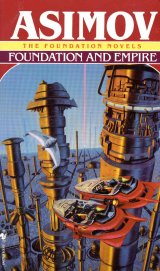 Today despite more interruptions, I managed to finish Foundation and Empire. Asimov's tells a good story, but sometimes I got the impression he was in such a hurry to tell more story that he didn't go back to edit the earlier parts. The dialogs in the second installment of the trilogy that went on to at least six books already started getting on my nerves by page 50.
Today despite more interruptions, I managed to finish Foundation and Empire. Asimov's tells a good story, but sometimes I got the impression he was in such a hurry to tell more story that he didn't go back to edit the earlier parts. The dialogs in the second installment of the trilogy that went on to at least six books already started getting on my nerves by page 50.
Somehow it seems I ought to read Second Foundation if I come across a copy, because the whole thing is a classic of science fiction. Is there something that happens in the third one that makes the first two more worth it?
Next up: Pigs in Heaven by Barbara Kingsolver, which is another title from the Bibliothèque anglophone in Le Touvet.
Posted by Mark at 02:46 PM | Comments (2) | TrackBack
Gcompris, part II
Tim's been playing gcompris. I haven't been able to get at the computer since he started. He's been interspersing bouts of PlanetPenguin Racer, which is the new name for what used to be Tux Racer, the penguin going for bobsled runs on his belly. I also installed TuxTyping and TuxMath, but he hasn't tried them, yet.

Tim likes gcompris partly because it has been localized into French, so he never needs to ask me anything. He started playing with simple mouse and keyboard skills that he already had, on little games like navigating a labyrinth or kicking a soccer ball into the goal. But the latest game consisted of arranging numbers with the four basic arithmetic operations to arrive at a particular number. So he's perhaps doing himself some good.
UPDATE: Screenshot of Tim's game.
Posted by Mark at 02:39 PM | TrackBack
October 22, 2005
Hiding from biometrics
 You perhaps already skipped over this one that got Slashdotted, but the Visions of Science awards organized by Novartis Pharmaceuticals found some interesting pictures.
You perhaps already skipped over this one that got Slashdotted, but the Visions of Science awards organized by Novartis Pharmaceuticals found some interesting pictures.
This one, called Hiding, shows someone who seems less sanguine about identity management than folks at work. I'm still getting over the fact that I have no privacy.
Posted by Mark at 08:33 PM | TrackBack
Wizards of Money
While running and commuting, I've been listening to music, but also to an old podcast by an actuary who goes by the pseudonym of Smithy. She's done 22 almost hour long episodes of the Wizards of Money, a show explaining how the economy works.
Smithy covers some of the basics, like how money is created, what markets are, how risk is managed, and so forth. She basically delivers the same content as professor Siegel probably does in the classroom, but comes at it from the opposite direction.
The points in Smithy's podcasts are a little harsher than Siegel's, because she's working to convince the listener that the economic system we have leaves some things to be desired, while Siegel's writing for the investor who needs to keep those thoughts "compartmentalized" as Ellroy called it. In the end, it's clear that the very highest returns go to investors who approach the business of making money like a Count Dracula and Charles Ponzi hybrid.
Posted by Mark at 10:28 AM | TrackBack
October 21, 2005
GOOG P/E: almost 100
 Don't take this wrong, I use the search engine all the time. But isn't the stock at least slightly inflated? According to Yahoo Finance, Google's P/E is nearly at 100, with the market cap at about $100B after they announced an upside earnings surprise.
Don't take this wrong, I use the search engine all the time. But isn't the stock at least slightly inflated? According to Yahoo Finance, Google's P/E is nearly at 100, with the market cap at about $100B after they announced an upside earnings surprise.
This move apparently also lifted the whole NASDAQ by lifting other stocks as well.
Posted by Mark at 10:24 PM | TrackBack
Tough year for new constitutions
BBC News is running an article about how long it's taking to count the votes in the Iraqi referendum on the proposed constitution there. It appears there were some irregularities, and even the officials were unclear on what exactly the predictions should be.
Provisional results indicate that two Sunni Arab-dominated provinces have rejected the constitution, but that a third province did not apparently reach the two-thirds threshold needed.Two-thirds of voters in three provinces must reject it for the constitution to fail.
During a visit to London last week, US Secretary of State Condoleezza Rice said initial information from the field indicated the constitution had been backed, though she later retracted her statement.
The deputy speaker of the Iraqi National Assembly, Hussein al-Shahristani, announced in a speech in Najaf on Wednesday that the draft constitution had been approved.
My bet is that the constitution will eventually be approved, although it'll take the authorities some time to get the count straight. Especially if the initial count turned out wrong with respect to the way it was supposed to turn out.
Posted by Mark at 10:13 PM | TrackBack
October 17, 2005
Safer war
BBC News is running an article about a report from a place called Human Security Centre that says wars are becoming less frequent and are killing fewer people.
Although the Human Security Centre concludes the UN has been instrumental in this trend, BBC News found someone too play that down. The same guy, Mr Greene, is quoted on why wars lately are less deadly:
The fall in the number of deaths per conflict is due to a change from large-scale war between huge armies with heavy weaponry to low-intensity conflicts that "pit weak government forces against ill-trained rebels."
This is one case where you hope they don't make too much progress. The report also doesn't cover the latest numbers from the conflict in Iraq, but the conclusion is that those numbers would materially change the conclusions.
Posted by Mark at 09:29 PM | Comments (1) | TrackBack
Comparing *n*x
OpenSolaris.org is running a short article on the similarities and differences in Solaris, Linux, and FreeBSD kernels.
It makes sense that Solaris and FreeBSD would share features, since Solaris grew out of SunOS. But there are also lots of synonyms in Linux as well. It's all *n*x I guess.
Interestingly, Linux gets some of it's speed for handling page faults by being less platform independent. From my 30000' idiot's view, that makes it look like the way to support more hardware is less through hardware abstraction, and more through open source. So that would mean we're doing at least one thing right by getting Solaris out there.
I wonder if the gatekeepers in the Solaris model of development will enable innovation as fast as in Linux. After all, on Linux, you expect things to change when you get a new kernel. With Solaris, we've been trained to expect the API to remain solid no matter how big the upgrade.
Posted by Mark at 10:08 AM | TrackBack
October 15, 2005
Ubuntu, part XV
For DSL, I used pppoeconf. That took about 30 seconds. Strange that the network-admin app doesn't help you fix that.
For Xorg, I followed the instructions on the Ubuntu Wiki. Another couple of minutes. You have to install a package, play with xorg.conf, and restart Xorg.
Haven't taken the time to do more.
UPDATE: xsane works right off the bat now. No need to sudo.
Posted by Mark at 10:06 PM | Comments (2) | TrackBack
Ubuntu, part XIV
Well, I installed 5.10. Ubuntu still doesn't offer to let me configure DSL at install time. It hairs out configuring the network, and even the manual config doesn't offer to help me get DSL going. It's either DHCP or static.
Next, no nvidia driver for Xorg. So I'm stuck in 640x480 until I figure that out. I must've done something under 5.04, where I am now, and forgotten about it. Couldn't Nvidia just let that stuff be open by now? This chipset is 2003 technology, or maybe 2002.
The desktop is slightly cooler, in that the partitions got mounted and came up right away.
I did have some trouble getting everything going in the beginning.First I had the printer turned on. It was doing it's flake-the-BIOS-out routine, and the installer got hung twice, once while I was trying to create file systems. After I turned that off, things went smoothly until I got stuck in 640x480 without network. It's not that I'm really stuck to be sure, it's just that it's not smooth enough.
Posted by Mark at 05:41 PM | TrackBack
New bike, part II
Slightly irritated today with the folks at Decathlon.
When I found time to carry out Dana's suggestion and tighten the cable to the front derailleur, I notice the guys who put my bike together were either too lazy or too cheap to snake the front derailleur cable through the housing designed to hold the cable on the derailleur. They had cut it short, pinching it only at the tip of the derailleur. There's not enough cable to set it correctly within the housing. No wonder it came loose so soon.
When I more or less managed to pull the cable tight enough anyway to fix it temporarily again, another flaw made me frown. Two of the teeth on the large front chainring are nubs, and at least one other is ground down. That couldn't be me. Granted I've ridden off road a little, but I've had the bike less than three weeks.
Next week I'm going to take it back to them and demand they fix this stuff. I hope the guy who sold me the first bike is working then. He seemed to have more pride in his work than do his colleagues.
Posted by Mark at 03:12 PM | TrackBack
October 13, 2005
How do you go DITA together?
There's a blogger over at O'Reilly writing on Going DITA. The idea seems to be catching on to the extent that DITA's a buzzword elsewhere besides OASIS and IBM. Everything now has a lot of SGML flavor, as in Sounds Good Maybe Later.
Seems like what's missing are the tools and the frameworks for building tools that make it easy to come up with your own document classes. Would the Linux Documentation Project move to DITA if the tools to do so were freely available?
Posted by Mark at 11:55 AM | TrackBack
October 12, 2005
Counter-Clock World
 Counter-Clock World was the first of the three Philip K. Dick paperbacks I've read. What an ugly cover.
Counter-Clock World was the first of the three Philip K. Dick paperbacks I've read. What an ugly cover.
After 1986 the Hobart effect sets in on Earth. Time flows backwards compared to the way it flows today. The old-born awake from their graves and must be dug up. Sebastian Hermes does this for a living, bringing people back to life at his vitarium. When he discovers Anarch Peak, nearly messianic preacher, is about to be old born, Sebastian digs up the body, and the rough stuff starts. Lots of people don't want great figures to come back into the world of the living.
Counter-Clock World strikes me as classic PKD, when he was casting around for a novel on par with Ubik or Man in the High Castle, but hadn't yet reached the VALIS summit. His characters are so easy to believe, having all the foibles of real human beings. No heros, just real people stumbling through particularly difficult lives. The scatalogical ironies of time running backwards lighten up the story, which the despair might otherwise flatten. Not his best, but worth more than the 50 cents I paid.
Posted by Mark at 08:59 PM | TrackBack
October 09, 2005
Miserable in the middle
That company Granddad didn't understand, Yahoo, was running an article about people in midlife being unhappy despite their doing financially fairly well. The writer says studies have found people's happiness is U-shaped over their lifetimes:
It isn't clear why we become grumpy in middle age. It could be that we become increasingly disenchanted through our 20s and 30s as we realize our lives won't be everything we hoped. Eventually, however, we adapt, which is why our happiness rises as we grow older.Alternatively, it could be that midlife unhappiness reflects the pressure of time, with folks in their 40s caught between family demands and long hours at work.
That sounds simplistic, but looks essentially right. A couple of mechanisms account for much of the drop in midlife. One is aging. The other is disillusion.
Sometime after 30, you notice that you're aging. It's not that you weren't aging before. But you weren't forced to recognize it. You could still feel immortal, and now you cannot. It is clear that you are going to die at some point. This is perhaps tougher to handle these days emotionally speaking than it has been in the past, since we are more alone than people have probably ever been. So the end of the self you spend so much of your time absorbed in may seem like a bigger deal than it necessarily is in the grand scheme of things.
Anyway, the visible aging, confronting your mortality, helps you get the full effect of the second mechanism, which is disillusion. This is not your adolescent or young adult disillusion, however. This freeing from false belief releases you from more than the realization that "Our lives won't be everything we hoped." Unless your standards were pretty low, you realized that before you got out of high school.
You used to think you could fix some things or at least end up doing more good than harm. Yet in your mid-30s, you realize not only that you're now closer than ever before to being able to do something about it, but that also you won't manage to do anything about it, and moreover as you grow older and weaker, your mind will end up letting you think it was all right -- "We adapt" -- that you did about as well as you could under the circumstances. So you can see that your children will grow into roughly this same realization, probably under similar or perhaps slightly worse circumstances, that you'll have done nothing to make those circumstances better, and that you'll be diminished into job-well-done contentedness at that point.
Posted by Mark at 05:16 PM | TrackBack
October 08, 2005
The Future for Investors
Dad sent Jeremy J. Siegel's recent book, The Future for Investors. Siegel had previously written Stocks for the Long Run, advising investors to buy index funds as a low cost way of beating many actively managed mutual funds. New research has led Siegel to this book, in which he proposes a D-I-V (dividends-internationalization-valuation) strategy over straight indexing for higher returns.
According to Siegel's research, you can beat the market investing in tried-and-true, high-value, high-dividend stocks that the market's not excited about, and you improve your portfolio by diversifying internationally using the same mind set about countries that you would about companies. The Future for Investors seemed to me full of echos of Dreman's contrarian strategies, where you tend to look for what has fallen out of favor, yet is still producing real profits and sharing them with investors.
The Future for Investors has its share of dark humor. Siegel starts out explaining the growth trap, which is what investors get stuck in when they pay too optimistically for high growth prospects. Then he shows the best performing stocks for investors from 1950-2003:
- National Dairy Products (Kraft Foods)
- R.J. Reynolds Tobacco
- Standard Oil of New Jersey (ExxonMobil)
- Coca-Cola
In other words, the best returns for investors came from companies that made it possible for Americans to eat lots of processed food, wash it all down with Coke, drive everywhere, and get addicted to smoking cigarettes. To paraphrase Keynes, capitalism is nasty, but it's the best we've got so far.
More black humor, Siegel's Future for Investors comes with his global solution to the demographic crunch in Europe, Japan, and the US. In a nutshell, these countries have approaches to paying for retirement that are basically Ponzi schemes. When the population is growing there are more young people joining the scheme than older people collecting payouts, so it all works. The danger for the Ponzi scheme retirement plans is the baby bust that came after the baby boom. If there aren't enough people buying into the scheme, eventually confidence runs out and things go sour for those left holding the bag.
Siegel says we shouldn't worry though. Developing countries with high growth rates will be there to buy our assets in exchange for their goods and services before the former get devalued. Demographics still look good for these countries. (For now, with so many not yet integrated into the industrialized economy and with probably a high proportion of uneducated women.) I guess you have to be a professor of finance at Wharton to bring forward a proposal to replace a dangerous Ponzi scheme with essentially the same one, except on a global scale, and then write:
As we look ahead to our and our children's welfare, there is no other economic goal that should have higher priority. We must embrace this future.
Overall, in addition to the humor, there's a lot of sound investment advice here. Not sure I'd know how to exploit all of it today without further investigation and thought. If you're a relatively serious investor, maybe you can use it immediately. Enjoyable reading, too.
Posted by Mark at 02:30 PM | TrackBack
October 06, 2005
Your next executive summary
On Ludo's suggestion, I watched Dick Hardt's Identity 2.0 keynote. The content's fine, and he seems right about what he's calling Identity 2.0. But his presentation is almost like a TV commercial. You watch intently and very little sticks. It's even more a monologue than most presentations. Dick's singing over a playback. Better than most karaoke, luckily.
It's no doubt what our managers will soon be asking for in terms of presentations. Inherent in the idea of executive summary is that the consumer doesn't have to think deeply about what you have to say. (Does Scott Adams have a trademark on executive summary?) You can enjoy Dick's presentation without thinking at all.
Posted by Mark at 10:04 AM | TrackBack
October 03, 2005
Turkey and the EU
BBC News online is running a story about the official start of talks between Turkey and the EU nations for Turkey to be included in the European Union. This has been a hot topic in France, where politicians are always on the lookout for something to say that can eat up lots of news program time while keeping internal problems off the table.
The BBC appears to be in favor of Turkey's inclusion in the EU, but at the same time shows a graph of popular support for Turkish EU membership. Hungary is the only country listed with the majority of those polled in favor. The EU average appears to be around 35% in favor. Less than 10% of Austrians are in favor.
Austrian Foreign Minister Ursula Plassnik said her country was "listening to the people" by questioning full membership for Turkey....after a series of meeting with UK Foreign Secretary Jack Straw, it appeared she gave way.
Thank goodness Mr. Straw is there to prevent Ms. Plassnik from listening to the people. Where would Europe be if politicians actually tried to represent the people who theoretically voted them into office?
That article doesn't show what percentage of Turkish people want their country to belong to the EU. I found a Sunday Times article stating that "57% of Turks wanted to join the EU," though the number has dropped from over 2/3, and is lower than half among workers.
For European and Turkish investors, having Turkey in the EU is most likely a good thing. European firms will be able to outsource inside the economic space to a low cost work force, and EU finance rules will force Turkey to tame inflation.
Posted by Mark at 09:02 PM | TrackBack
Amakudari
Dad sent a link to a collection of reader suggested words from BBC news, which is the follow up to a previous article on words borrowed from foreign languages. My favorite candidate for inclusion in English:
In Japanese, amakudari, literally descent from heaven, describes the phenomenon of being employed by a firm in an industry one has previously, as a government bureaucrat, been involved in regulating.
Posted by Mark at 01:52 PM | TrackBack
September 30, 2005
Ubuntu, part XII
C|Net has another article I read today, this one on Ubuntu.
Quantifying Ubuntu's gains is difficult. For example, it doesn't show up in IDC's revenue charts, since it's available for free, even for those who want installation CDs sent to them.
Yes, they're going to run out of money, or maybe they're going to get some investors convinced free as in beer is one step away from huge financial gains.
I doubt it. But they could leave stuff lying around as a wrapper for Debian installs. Debian's the one we want, as long as it supports the cheap hardware I bought and doesn't take as much patience to install. ("Debian GNU/Linux ... comes with over 15490 packages..." and most of the time I use fewer than 100.)
Posted by Mark at 10:48 PM | TrackBack
Garbage in, garbage out
C|Net has posted an article about some guy that posted a draft of his article on Wikipedia to prove that lots of eyeballs and keyboards would not fix all bugs.
He posted a crummy, error-laden draft of the story to the site. .... The idea is that, despite the fact that anyone can work on any article, Wikipedia's content is self-cleaning because its community keeps a close eye on the accuracy of articles and, in most cases, acts quickly to fix errors that find their way into individual entries.
Huh? That's like saying open sourcing stuff doesn't work because not all of the projects we started on SourceForge have grown into software industries. Why would the rest of the world suddenly have infinite time to clean up your valueless mess?
Posted by Mark at 02:34 PM | TrackBack
September 28, 2005
New bike
Nathalie gave in and let me buy what I think of as a boy's bike, compared to my man's (road) bike. She said it's her anniversary gift to me. I took delivery today, left my car at work, and rode this and the train home.




They guy who sold it to me said I need to wear the disc brakes in by breaking hard the first hundred or two hundred stops, rather than breaking slowly, a good excuse to get the rear wheel in the air, and skid like somebody Tim's age.
The mud on the front tire in the bottom right photo comes from trying to ride up the trail on the hill in front of the house. The gearing's right for that, but you'd have to be more expert than I am to keep the bike upright on the trail I took. It got so steep and bumpy I couldn't keep the front tire on the ground. And I couldn't keep my feet on the pedals. Had to walk the bike up part of the way.
Decathlon sold me the bike with platform pedals that your feet do not adhere to. I suggested to the sales guy that didn't make sense, but he only wanted to sell me additional pedals or a more expensive bike with SPD pedals. So I took the SPD pedals off the road bike and put them on this one, putting the Look pedals back on the road bike. That makes the road bike even more serious, and (I hope) let's me keep my feet on the pedals of this one.
Actually riding on this thing is hard work on the road, but great fun when you get off the road onto trails. Decathlon hardly inflated the tires for me, leaving them at about 2 bars, so coming home it felt like I had two flats. I pumped them up higher after changing the pedals. Hope everything still sticks when I try that trail again.
Posted by Mark at 08:58 PM | Comments (2) | TrackBack
September 22, 2005
La Société du Spectacle
Ouf.
 Getting to the end of La Société du Spectacle was straightforward. I just kept going through the fields of words I could pronounce and recognize without understanding. Debord might simply turn up his nose and mutter something about ces dupes who haven't even read Hegel, much less understood him.
Getting to the end of La Société du Spectacle was straightforward. I just kept going through the fields of words I could pronounce and recognize without understanding. Debord might simply turn up his nose and mutter something about ces dupes who haven't even read Hegel, much less understood him.
I gradually realized my reading was simply to fill time, the mental equivalent of watching television or getting drunk. Certainly Debord wouldn't have written in that stupor. He was aiming to make sense, or at least to get a leg up on other guys who read Hegel and thought they understood it, at least well enough to make the appropriate vocalizations.
It seems like there's more to it that that. Mathematics exposes findings by starting with a defintion of terms, then a logical argument, to arrive at a conclusion consistent with the definitions and the rules of formal logic and of earlier conclusions based on the same approach. When properly applied, the mathematical approach leads to conclusions you can count on within their context.
Much of the real crap I read looks like a caricature of mathematics. The worst of it usually starts with reams of definitions. The author redefines the world as much as possible instead of describing the existing world as economically as possible. Then woolly and jargon filled argument attempts to lead from the multitude of definitions to pithy, but perhaps unjustified conclusions.
In fact you cannot necessarily put your finger on exactly what was wrong or right. Allez, au hasard :
Le temps pseudo-cyclique consommable est le temps spectaculaire, à la fois comme temps de la consommation des images, au sens restreint, et comme image de la consommation du temps, dans toute son extension.
I don't own an authorized translation, but let me try to render that as: "Pseudo-cyclical, consumable time is spectacular time, both as time for consuming images in the restricted sense and as a representation of the consumption of time in its fullest extension." It reminds me of a book I once tried to read, The Condition of Postmodernity by David Harvey. Reviews are rave at Amazon. Gee, this stuff must be good because somebody else says it is.
Posted by Mark at 08:16 PM | Comments (2) | TrackBack
September 21, 2005
EU constitution, part VI
The BBC News is running an article, EU admits constitution is on ice, in which they quote the European Commission President as saying he doesn't expect to see the EU constitution go through soon.
The Commission spent Tuesday "brainstorming" at a chateau in southern Belgium about the future of Europe.Mr Barroso insisted on Wednesday that the EU should not be nostalgic for the constitution, but should make the most of the existing treaty framework.
In a democracy if people don't vote the way they're supposed to, the best thing for the elected leadership to do is ignore the election results. Paying any attention to the people you theoretically represent is a complete waste of time.
Posted by Mark at 10:08 PM | TrackBack
September 20, 2005
Back to the moon
The BBC News has an article about NASA's plan to send people to the moon as a first step to put people on other planets.

It looks like they're using the same models they used before I was born. Either that technology was pretty good when they first came up with it, or else they're not spending much on the sexy new look.
Posted by Mark at 08:37 PM | Comments (2) | TrackBack
September 19, 2005
MovableType upgrade, part II
3.2 seems to build faster that 3.1x now that I've turned on dynamic whatever it is. It really makes a difference. If you do use MovableType, upgrading to 3.2 seems to be a good idea.
Posted by Mark at 08:56 PM | TrackBack
September 18, 2005
StyleCatcher nevermind, part II
It works after I upload the themes. Always wanted to have a black web page, so it'd look like I play a lot of video games. (Folio theme from the styles library)
Posted by Mark at 10:01 PM | TrackBack
AdSense makes sense?
Good grief, it seems to be showing up more and more. AdSense on your blog? Does Google have so much money from selling stock they can pay people to post blog entries?
Posted by Mark at 05:42 PM | TrackBack
The Daily Drucker
Dad gave me an survey of Peter Drucker's work called The Daily Drucker.
I had a tough time getting started, as the book has these annoying action points after each of the daily Drucker readings. Of course the actual texts from Drucker are all quite good. Even if you don't necessarily agree with his editorial line, you cannot deny Peter Drucker's capacity for seeing the big picture, usually at the expense of some generally accepted banality that doesn't fit the facts.
A moment ago I finished the 15 February reading, "Salvation by Society," in which Drucker wonders what comes out of the collapse of Marxism. I guess he wrote that when it was happening. Drucker sees people casting around for another savior from outside, but hopes the collapse, "May even lead ... to a return to individual responsibility." As in other cases, it appears many of us still haven't caught up with the management guru's hopes.
Posted by Mark at 02:57 PM | TrackBack
September 17, 2005
Chinese economy
The BBC News is running an article about the OECD report on the Chinese economy. According to the article:
[The OECD] predicts that China will overtake most Western economies in the next five years.
Presumably that's not on a per capita scale yet. Interesting.
Posted by Mark at 05:50 PM | TrackBack
Cynismes
Read Michel Onfray's Cynismes out of curiosity, and because I ought to read more French. Onfray's book was easy for me to read although I know little about ancient Greek philosophy.
Diogenes of Sinope and other Cynics after Antisthenes had "great disdain for the ... artificiality of much human conduct." (Source: Wikipedia) Onfray draws parallels between what those philosophers are reported to have said and done, and how we perhaps ought to let ourselves speak and act these days.
When I was 12, I probably would've loved Plato's Republic. Now that I'm 35, stories about Diogenes appeal to me. When I'm 58, will I be back to loving the Republic? Probably. I'm already far too lazy to bring my life into line with what I recognize as right and wrong.
Cynismes tells the stories of a few philosophers who didn't give in and conform, be the best they could be, obey, or align with management. Looks like an honest way to live, but a very hard way to live. I wonder how Onfray's doing.
Posted by Mark at 10:59 AM | TrackBack
September 16, 2005
High blood pressure
This morning I went to see my doctor to give him the podiatrist's prescription for the orthotic inserts and get my doctor's prescription. It's worth it to me, because it enables me to get reimbursed. (In this particular case it costs the Sécu, my insurer, and me extra money and time, but the idea is that in the general case in France, you always go to your doctor first before going to a specialist to save money overall. The system of course runs huge deficits because the population is aging and living longer, and therefore needs more medical care for longer, whereas fewer people are paying in compared to the number of people getting reimbursed. But apparently too many people were going to specialists they didn't need to see.)
Anyway, my doctor took my blood pressure, which was 14/7 in both arms. He says that's a little bit too high, but that it could be caused by fatigue. That fits with the quantity of training and work I have right now. Haven't had headaches or anything like that.
Posted by Mark at 04:14 PM | TrackBack
September 12, 2005
Another flat, part II
On Dana's suggestion, I looked at rear wheels when we made a shopping trip Saturday. I saw one without a freewheel for 39 euros. It looks like I might have to adjust the brakes if I get a wheel of a different sort. Of course I already have to change pedals if I want a sportier ride. My SPDs are not nearly as smooth as the Look pedals that came with the bike.
I also saw what looked like more fun, but is an order of magnitude more expensive. That is getting a mountain bike. The mid range bikes looked sturdy but fun. Bring on the tramway construction, rivers downs mainstreet, glass, etc. I'd be goofing off all the way to work.
There are more responsible things to do with the family's income, however.
Posted by Mark at 06:37 AM
September 11, 2005
More music
Listening to Calogero, who Nathalie had me go see with her back around Emma's birthday in Grenoble.
 The guy definitely sings better than I do, is richer, better looking, speaks better French. His approach to the music reminds me of Pearl Jam years ago. Not sure exactly what it is, but a sort of smooth effort that lasts through a song.
The guy definitely sings better than I do, is richer, better looking, speaks better French. His approach to the music reminds me of Pearl Jam years ago. Not sure exactly what it is, but a sort of smooth effort that lasts through a song.
There's also a sort of decay in there somewhere. Like what happens when you go over your limit in a run and end up hanging on for dear life. Hard to describe.
Posted by Mark at 09:44 PM
Jake rips it up
Andy blogged about this Quicktime flick of Jake Shimabukuro ripping up While My Guitar Gently Weeps on the ukelele. Somehow .mov files don't automagically come up in something that can read them on my home system. Totem must be lacking a Quicktime codec. Anyway I didn't download the thing at first, because it's 28 MB, and I have a slow connection and a short attention span.
In the end I downloaded it. Jake's amazing. I think he forgot the gently part, though. I'm not sure about the weeping either. It's more like, While My Ukelele Catches Fire and Burns the House Down.
Posted by Mark at 03:28 PM
September 10, 2005
Enemy combatants
Granted if what they print about him is true, Jose Padilla has plotted some nasty indiscriminate killings and is not the kind of guy you want going about his planned business. But if it's true, why don't we charge him with something?
There's an article about the court decision on WashingtonPost.com. It's interesting that our laws led the court to conclude with judge Luttig that:
the President of the United States possesses the authority to detain militarily a citizen of this country who is closely associated with al-Qaida, an entity with which the United States is at war
Presumably they don't have enough to accuse this guy with breaking the law. Maybe it's like that guy that ran from the British police after the bombings there: He looks suspect. They've therefore locked him up for three years. Hey, if you're him, maybe that's better than getting shot.
Padilla was arrested at Chicago's O'Hare International Airport in 2002 after returning from Pakistan. The federal government has said he was trained in weapons and explosives by members of al-Qaida.
Al-Qaida. We're not at war with something identifiable by people outside the fighting. Think about that. Everything you know about al-Qaida originated either with either freaks who think blowing up people will make the world a better place, or with people you have absolutely no reason at all to distrust, namely politicians. It's like being at war with the Illuminati.
WashingtonPost.com says only two citizens have been designated as enemy combatants, so I guess there's not much reason to worry. Especially if you're pretty obviously not part of al-Qaida or the Illuminati.
Posted by Mark at 08:04 PM
Music for running
My MP3 player has been nice to have on days I don't have to concentrate on running fast. Both of the albums I've been listening to the most are Nathalie's, and they're both out of date (last century).
Sting's a witty guy. He has some pretty good musicians on Ten Summoner's Tales:

That one's somehow good for forgetting about the run and enjoying the music.
The other one is The Hush by Texas. The musicians are fine, and the music probably used to be trendy, but the main reason is for Sharleen Spiteri's voice.

It's headphone music, better if you can listen carefully. When Sharleen does those things that always sounded a little effeminate coming from Prince, they just sound feminine, infinitely more pleasant than, "My legs hurt," or, "I cannot breathe deeply enough."
Posted by Mark at 11:09 AM
September 06, 2005
Magic fingers
The Register is running a piece about car seats that give your hind end a shake when you appear to be nodding off at the wheel.
Apparently the technology can improve reaction time a couple of tenths of a second. That currently can prevent up to 15 per cent of rear-end crashes. Experts are working on ways to give drivers an extra half a second, thereby reducing "rear-end crashes by as much as 60 per cent."
Kind of makes you wonder how the engineers came up with this idea in the first place.
Posted by Mark at 08:57 PM
September 05, 2005
The Book of Lies
On my bookshelf are a few books so far beyond my reach that I should've admitted defeat before buying them. One of those is Aleister Crowley's Book of Lies.
There's very little I can say for certain about it. Moreover, as I look at my bookshelf this evening, all the jackets seem forbidding, everything from post WW II Hörspiele to Less Than Words Can Say, the latter title neatly describing most of what I write, including what I write for a living.
Crowley apparently first published The Book of Lies in 1913. He wrote, "Do we not find that the most robust of men express no thoughts at all?"
O!
Posted by Mark at 09:05 PM
September 02, 2005
Dangerous
According to the BBC News, Venezuela's government is planning to force banks each to allow two state representatives onto their boards. They've also been aiming, "to ensure 20% worker representation in their board rooms."
Seems like they've been getting onto the radar. According to facts from the CIA World Factbook, that might be a dangerous proposition. Venezuela spends 1.5% of its GDP ($1.687 B) on its military. The US spends 3.3% ($370.7 B).
Speaking of the CIA World Factbook, there's an interesting factoid in there about the US under the heading "Illicit drugs:"
consumer of cocaine shipped from Colombia through Mexico and the Caribbean; consumer of heroin, marijuana, and increasingly methamphetamine from Mexico; consumer of high-quality Southeast Asian heroin; illicit producer of cannabis, marijuana, depressants, stimulants, hallucinogens, and methamphetamine; money-laundering center
The whole first part I was ready for. But I'm surprised the CIA characterizes the US as a money-laundering center.
Posted by Mark at 10:13 PM
Paper's a drag
Well, I found an appropriate USB cable at Super U in Pontcharra this evening after work. They seemed to be out of stock. The guy at the counter thought so. But some of their stock was on another shelf next to the printers and scanners.
We bought a Samsung ML-1610, and it was delivered yesterday, but as I wrote, I was waiting for the cable to set it up. The cable and printer work fine.
The drag was that Samsung folks had their driver installation work through a graphical tool that requires you provide the root password. Of course, Ubuntu uses sudo and never shows the root password to you. I think Eric told me OS X does that as well.
So I had to work out the driver thing manually. I didn't manage to do it through the gnome-cups-manager wizard. Ended up selecting the ML-1710 driver and going with that. It works, and I have this sinking feeling that to do better I'm going to have to read a book of man pages.
Posted by Mark at 08:38 PM
September 01, 2005
More flooding
I've not been following what's going on lately, but according to the BBC News, folks in New Orleans are having real trouble following the severe weather. Sounds like some people are taking advantage of the situation to steal other people's stuff. And then:
Medical evacuations from the Superdome stadium have been disrupted after a gun shot was fired at a rescue helicopter.
Indeed it looks several orders of magnitude worse than what happened here in Domène and Lancey. Dad sent email about reporters who are already assigning blame to various officials for what appears to be a very unfortunate, but natural disaster.
Posted by Mark at 09:21 PM
Cheepnis
We got the printer this afternoon. They've gone so far to save money it comes without a cable. Hey, you get what you pay for.
I have an extra USB cable lying around, but of course USB has multiple connectors. This was one of those underpublicized features of the standard. As described on the web, the USB committee members learned from the past:
The connectors which the USB committee specified were designed to support a number of USB's underlying goals, and to reflect lessons learned from the varied menagerie of connectors then in service.
One of the lessons no doubt learned by USB committee member companies, such as "Apple Computer, Hewlett-Packard, NEC, Microsoft, Intel, and Agere," was that people reuse cables if they're too universal, so it's important to cable manufacturers to have lots of standard plugs and sockets that require the consumer purchase extra cables.
Posted by Mark at 08:59 PM | Comments (2)
Lore of Running
While I wouldn't recommend Tim Noakes's Lore of Running to anyone who has not yet tried to figure out how they can improve running speed, distance, or both, I also don't think anyone relatively serious about running should go without this book.
In over 900 pages, Noakes covers all the key aspects of running from physiology, to training, to what to look for in a pair of shoes. Although he's writing primarily for the runner without medical training, Noakes always references the scientific literature when making an argument he doesn't preface with a disclaimer that this is only his impression after years of running, studying running, and giving runners medical treatment.
Although it's written like a textbook, I find Lore of Running easy and mostly fun to read (for those interested in running). Highly recommended.
Posted by Mark at 09:41 AM
August 31, 2005
Cosmic Encounter
I picked Cosmic Encounter by A. E. Van Vogt off the shelf at work because of the pulp fiction cover of robots with lasers boarding an 18th century pirate ship.
It tells the story of Nathan Fletcher, ex-Baron of something-or-other, who fell out of favor with the Tories due to his stance vis-a-vis free enterprise. (If I remember that right.) Fletcher turns to piracy for his livelihood. When we meet him at the outset of the story, he heartlessly offers a captured young Lady the choice between gang rape and drowning, hoping she'll accept the rape after which he'll drown her anyway. Not a bleeding heart type of guy.
After that time itself collapses into 1704 AD, and flops around some subsequently. The young woman dies and is reincarnated by 83rd century technology. Robots from the 25th century lose their Universal Mind and end up finding it in the voice of Nathan Fletcher. He eventually gets zapped, which makes him telepathic and starts him on the road to becoming a nicer guy, though he ends up clubbing a New Yorker from the 23rd century who, by virtue of his anti-gravity duds and other standard 23rd century gear, had set himself up to force the reincarnated Lady into becoming his mistress.
In other words, a romp of a story, Cosmic Encounter absolutely lived up to its cover.
Posted by Mark at 08:53 PM
Google Maps envy
Google Maps doesn't really cover France, yet. Gilles's theory is that the French authority who makes the best maps, IGN, would not be able to make money if Google posted their work.
Here's the current Google Maps satellite view of our house. Leaves something to be desired, doesn't it?
Posted by Mark at 12:15 PM
August 30, 2005
Honesty in advertising
After reading the fine print, I got around to signing up for the marathon in Grenoble this Halloween. But I hadn't read the best part, yet.
It turns out we need to send copies of our medical certificates beforehand. That's the paper your doctor signs declaring he doesn't expect you to drop dead. I'm not sure why they aren't collecting copies of those when we go in to get our numbers, which is what they did in Lyon and even in Pontcharra. Seems like extra work for the organizers to keep track of it all.
In any case I was looking around for a fax number, and landed on a page covering the atouts (advantages) of the marathon run they're organizing for us. My confidence is slightly shaken by the statement right at the top that they're holding it in, "Grenoble, la ville la plus plate de France" (Grenoble, the flattest city in France).
Let's hope the rest of organization is a little less fast and loose than the advertising. Maybe I should carry a 10 euro bill in my shorts in case I need to buy my own drinks along the way.
Posted by Mark at 10:10 PM | Comments (2)
August 29, 2005
Productivity way up
BBC News has an article about Afghan opium production nodding off:
The area under cultivation for opium has dropped by 21%... But the actual output has not changed much and Afghanistan is still the largest producer of opium in the world, accounting for almost 90% of supplies.
Apparently "the international community has spent millions" on the war on drugs there since the war on Taleban in 2001. I wonder if the crime fighting international community has spent as much as the smack shooting international community tying off in dirty bathrooms for an Afghan fix.
Posted by Mark at 09:38 PM
Risk management
Paul Graham has an essay he posted recently on Inequality and Risk, in which he writes, "Decreasing economic inequality means decreasing the risk people are willing to take."
He means to say that if you raise taxes, less folks will want to do startups. That's no doubt true. Running a startup is probably as bad as raising a family of small children on your own. Of course the potential payout is much larger than anyone raising a family of small children on his (probably her) own, but since if I have to pay for them, your kids do not amount to a good investment for me, though your startup might be, I agree with Paul. Tough luck to single parents.
Anyway, Paul's a hacker, so I figured somewhere in there he would say he did it for the love of creating something, not for the financial power. I read along until I got to the financial security argument:
Like many startup founders, I did it to get rich. But not because I wanted to buy expensive things. What I wanted was security. I wanted to make enough money that I didn't have to worry about money.
Hmm. So what would you have been doing if you didn't have to worry about money in the first place, Paul? Bucky Fuller's been telling us we don't have to since at least Critical Path. What if you just didn't have to worry about it at all? What if you could do the startup thing, but it were like raising children, in that you get something out of it, even though it's hard work?
Posted by Mark at 09:01 PM
August 27, 2005
Cannot remain paperless
This whole week Nathalie's wanted me to buy a printer. Usually I make quick decisions, but this one seems virtually impossible, even though I was almost instantly certain we want a black and white laser printer.
I've studied the suggested printers at LinuxPrinting.org. I've examined various reviews. I've checked many printer descriptions and corresponding toner costs for those printers. I'm only a bit worried that I'd buy a printer not really supported through free software, but that's only a tiny worry these days.
My estimation is that we'll print 1-2 pages per day, that we will thus have to buy toner in 1 1/2 to 3 years, probably after the guarantee wears out on a cheap printer. But then the replacement toner on a really cheap laser printer is such that you'd usually do better to replace the whole thing. (A problem at least as bad with ink jet printers. Never buy an ink jet printer. In fact, never buy a printer if you can avoid it.)
So do I buy a somewhat more expensive printer and hope to keep it? Or do I buy a cheap printer and hope it doesn't break just after the 1 year guarantee runs out? Maybe I've already wasted too much time thinking about this.
Update: Just ordered the cheapest Samsung. I'm sure it'll break down like the other two printers I've bought in my life. I just hope the breakdown happens before the guarantee runs out.
Posted by Mark at 04:39 PM
FAT stuff that hangs around
When I delete a file on the MP3 player using the file browser on Ubuntu, the system "moves it to the trash," which appears to mean that it marks it as deleted in the File Allocation Table but leaves the file there on the device. You cannot see it in the file browser, but it's still there. You don't reclaim the space.
Great idea for big hard drives. But then you have to "take out the trash" even on your MP3 player. Maybe it should go ahead and prompt me when the media is a little flash over USB.
The real problem I see is in the trash itself. When I "empty the trash," the system throws out (permanently deletes) everything referenced as trashed. So I do this for my USB-connected, tiny flash memory at the same time doing it for the stuff on my relatively huge disk. It's like the natural way to clean up your desk being to throw out everything in the house you intend to remove some day.
Posted by Mark at 10:01 AM
August 26, 2005
From 104% to 49%
The BBC News claims Internet growth has slumped, from 104% the year before last to 49% last year. Quite a crumple.
Only 5 years ago I remember Ed Zander saying Internet use was doubling every 4-6 months.
Pictures, people. Streaming home digital video of vultures settling behind starving young girls. Amateur peer to peer, DVD quality porn. We'll just be waiting patiently for a better opportunity in the stock market.
Posted by Mark at 10:13 PM
Kevin Carter's photo
When I dragged myself back from eating my lunch today, having listened to Tony talk about the wonders of grid computing for what seems like a long time, Luke had sent around the Pulitzer prize winning photo of a Sudanese girl snapped around 1994 by Kevin Carter, who later committed suicide.

The vulture appears to be waiting to eat the starving child. According to Wikipedia -- see the link -- the photographer had been "warned never to touch famine victims for fear of disease." But contrary to the story Luke sent with the photo, Carter's obituary on the web says the girl, "resumed her trek to the feeding centre. [Carter] chased away the vulture."
After the New York Times published the picture, it garnered Carter the Pulitzer Prize for Feature Photography:
"I swear I got the most applause of anybody," Carter wrote back to his parents in Johannesburg. "I can't wait to show you the trophy. It is the most precious thing, and the highest acknowledgment of my work I could receive."Carter was feted at some of the most fashionable spots in New York City. Restaurant patrons, overhearing his claim to fame, would come up and ask for his autograph.
It seems that Scott MacLeod, Time's Johannesburg bureau chief, wrote that. Then in the same article, on paragraphs later, we asks, "How could a man who had moved so many people with his work end up a suicide so soon after his great triumph?" MacLeod says it was basically drugs and bleeding heartedness.
Another writer, Charles Paul Freund, sets the context of the picture this way:
Carter, a white South African, spent only a couple of days in Sudan. According to Susan D Moeller, who tells Carter's story in Compassion Fatigue: How the Media Sell Disease, Famine, War and Death, he had gone into the bush seeking relief from the terrible starvation and suffering he was documenting, when he encountered the emaciated girl. When he saw the vulture land, Carter waited quietly, hoping the bird would spread its wings and give him an even more dramatic image. It didn't, and he eventually chased the bird away. The girl gathered her strength and resumed her journey toward a feeding centre. Afterward, writes Moeller, Carter "sat by a tree, talked to God, cried, and thought about his own daughter, Megan."
(Source still http://flatrock.org.nz/topics/odds_and_oddities/ultimate_in_unfair.htm)
That Carter one day saw himself in situations like that one, maybe multiple times, "Waiting quietly hoping to get a better shot," could never explain his suicide.
Posted by Mark at 09:29 PM
Manage yourselves
WSJ.com published an article about an initiative at Schlumberger to have knowledge workers govern themselves.
The creation of islands of democracy in a hierarchical capitalist sea was the solution to a business problem of significance to a company that primarily sells not things but services and expertise: managing and motivating technical professionals. In the late 1990s, then-Chief Executive Euan Baird "felt almost everything that had been tried had failed," says Schlumberger veteran Henry Edmundson.Engineers, physicists, geologists worked well on individual projects, but the company hadn't a clue how to help them develop the professional sides of their lives. "If you can't manage these people," Mr. Baird decided, "let them manage themselves," recalls Mr. Edmundson. He was ordered to implement the idea.
I cannot tell from the article whether Schlumberger got rid of any layers following implementation of this initiative. Maybe they're keeping those managers around for the same reasons we always tend to put things in the attic for years, finally throwing them out only when we get ready to move.
Posted by Mark at 11:13 AM
August 25, 2005
Less is more
Forbes.com is running another good one. This time it's about Intel marketing "performance per watt" instead of raw processing power. Less is more.
In case you didn't notice, and couldn't ask Gilles, chip manufacturers, especially Intel, have been having trouble increasing raw processing power lately. When they do manage to increase processing power, the chips get hot as the blazes, meaning they radiate huge amounts of electricity in the form of useless heat. As a result the marketing dudes' laptops burn fingers of people clicking to the next slide, and knock down battery life from hours to minutes. Even more seriously, they make it hard to cool labs and data centers, so big customers cannot use the chips.
Intel fought that for a while, because they'd worked so hard for so long to sell everyone on the need to have really high speed processors. Think planned obsolescence.
Now even their marketing dudes have capitulated in the face of stubborn reality. Unfortunately if you think about this whole thing for a nanosecond or two, the answer to this marketing campaign is for people to buy older chips, or hang on to the old ones they have for longer. (Chips used to consume less power.)
I get this picture of Otellini going to a meeting of Intel investors. The investors say, "Profits are down. You didn't meet your target. What are you doing about it?" Otellini says, "We have a new marketing campaign. Less is more."
Posted by Mark at 08:16 AM
Less shelter
Forbes.com is running an article that notes US prosecutors are increasingly implementing "deferred prosecution" against companies who break laws involving money. However:
The obvious losers in all this are individual executives. "The company is in essence working with the government to build a case against the officer or the director. In the old days, you were protected by the company," observes former Assistant United States Attorney Michael R. Sklaire, now with the Washington office of Womble Carlyle. Companies, he notes, need to ask, "What kind of environment are you creating among your employees?"
And a natural answer is, "We're creating the kind of environment that is good for investors." "Deferred prosecution" protects investors from executives who went a bit over the top in zeal to make their numbers. Protecting the errant executive would be protecting the employee at the employer's expense.
As an investor, would you protect the rank and file at your expense, especially if they'd broken the law? What sort of signal would you be sending to the rank and file (and everyone else), if you protect executives who break the law, especially since the executive's primary responsibility is to serve the interests of investors?
Posted by Mark at 07:49 AM
August 23, 2005
Annexation
Dana found that a sizeable proportion of Mexicans would like to live in the US. We wondered if they shouldn't petition congress to vote to join the US.
Dana figures it might be seen as a problem by many current Americans, who'd worry we'd have to pay like West Germany paid for East Germany. It doesn't look quite the same, however. Reunification joined a bunch of people who spoke the same language and who'd already thought of themselves as a nation from about the beginning of the 19th century until the middle of the 20th.
Emotionally, adding part of Mexico to the US would be like German reunification only for very few people.
Posted by Mark at 10:10 PM
1984
Out of cheapness I accidentally bought the Penguin Readers Level 4 version of Orwell's book. The flavor is still there, however.
The humor's even better, like when you're reading the no-more-than-1700-word version of how the newspeak dictionary writers like Syme are, "destroying words -- lots of them, hundreds of them, every day."
We have lots of executive newspeakers in the business world, but nobody working on the dictionary except for Rob and Luke, and theirs is a part time effort.
I don't mind rats. Not sure what I expect to find when they take me to Room 101.
Posted by Mark at 09:45 PM
August 22, 2005
Google rediscovers that paperclip
According to the BBC News, Google and is updating their desktop search software:
The revamped software will suggest web links, personal documents and images that might be relevant to whatever someone is doing with their computer.The tool also automatically subscribes to feeds from weblogs and news sites that a user visits.
Umm, didn't Microsoft already do that sort of stuff with the paperclip in their Office suite? ("It looks like you're writing a letter.") Didn't virtually everyone who'd ever used it for more than a demo already agree that was a bad idea? Maybe they've been working too hard selling shares and their engineers are getting outflanked by their marketing dudes and management.
Posted by Mark at 09:58 PM
S corps
Forbes.com is running an article on IRS investigations into potential tax evasion through S corporation structures. According to Forbes.com, the IRS says the tax shortfall was $300 billion in 2001.
In a nutshell, people set up S corporations to avoid double taxation of profits, once at the corporate level, once after dividends are distributed. S corporations don't get taxed at the corporate level, but instead all the tax is paid by owners on the gains made in dividends. Or the losses made, which are also passed on directly. Presumably if you're a big enough fish and wise enough, you can then use the losses to offset other gains you made. That of course logically doesn't do you any good... unless you need to reduce the size of the capital gains you have to pay tax on.
All of that is legit, although as Forbes.com recommends, "You will want an attorney." The laws get complicated. The investigations do not address the legitimacy of the legit part of course, but instead concern salaries and overstated losses. Some folks surmise there may be owners adjusting salaries to limit their tax burdens, and a few may even be claiming they lost more than they did to offset gains elsewhere.
Gee if I were an owner, I'd tend to see this as an advertisement rather than a warning.
Posted by Mark at 08:23 AM
August 19, 2005
Chomsky on Anarchism
My opinions have long been extremist. I tend not to fall in the middle of the spectrum. I recall being impressed at age 12 by the Third Reich and the level of control those guys had, even if they subsequently got demolished.
Later on in high school I believed in capitalism of the Ayn Rand variety, a meritocracy of loner individualists. My tendency until late 2001 was in that direction, though the older I got and the longer I lived in France, the more I "mellowed" from thinking the losers should get nothing to thinking the winners should act like guardians to the losers, keeping them from want, but without letting them get in the way.
At the same time, I was convinced we could have more winners by working within the system to improve our approach. Six Sigma was getting traction at Sun and looked like a great way to improve the processes that could lead even losers to deliver winning products and services. Capitalism was great after all, just look at my pay rises, at the price of SUNW, at how Telco Software was growing, and how excited we felt. Finally I got a chance to get involved in Sun's Sigma effort, getting training as a black belt.
In retrospect it was a rough time for an idealist to start learning about how great management can be. Sun was going through a first round of layoffs. The bubble had popped, yet we were all still in denial. People's bad sides started to show. Not only was the time ripe for politics, but I was completely green, working for an experienced manager in a difficult situation, a guy who even in the best of situations wasn't going to have lots of time to groom someone of dubious value.
I'm not, by nature, an eager manager anyway. By nature I'm a cynical dictator, partly because my own laziness and low motives are so obvious, partly because my patience is virtually inexistent. Management and parenting are for those reasons hard to appreciate. Put all that together with my idealism and I turned out to be a lousy fit for that black belt job.
Anyway, I found myself pulling up to work and having trouble getting out of the car. I might have been diagnosed as clinically depressed some of those days. I say that because I remember sitting in front of my screen in a panic, yet unable to move. I felt vaguely like killing myself, crying, storming out of there, but also felt completely out of touch with my emotions.
It reminds me of the summer I went to Richardson, Texas to sell books door to door. The worst part of that was one day late in the first week when my team leader took me around and I actually made a sale. This poor woman finally got her checkbook and signed. After that I got in my car and drove 22 hours straight back to my mother's house, almost falling asleep at the wheel near the end.
Finally, about the same time the World Trade Center buildings were getting blown up, I found a way out, going back into docs in the team where I still work now. Although the episode in Richardson turned me off to sales, it was only in late 2001 that I'd been turned off to hierarchy and authority. And the turn off was still not very clear.
Somebody, probably Rob, got me to read Howard Zinn's People's History of the US around this time, and also Chomsky's book on Year 501. Those hit an immensely receptive reader. Then I read the Art of War again, and Machiavelli's Prince, and a book on the GE way by Jack Welch. It was as though I could finally see everything that'd been written in invisible ink. The fnords were all there.
Someone watching from the outside would've laughed at my reversal, kind of like someone who quits smoking and then decides smoking is such a horrible thing, and how could anyone ever do it. Of course I'm very earnest and fairly stupid, so it took me a long time to see the irony, even though it's plain for everyone.
Only recently have I started to see the challenge we have to get ourselves out of this system based on heirarchies, authority, and coercion and alternately to get the system out of ourselves. In Chomsky on Anarchism, Chomsky makes the point that we might as well aim at this through gradual experimentation. Emotionally to be sure I have trouble with that, but I see the parallels in the real world, in software for example. Generally it takes one or more prototypes before you get it right, even if you do considerable thinking beforehand.
So the book is frustrating there, but encouraging in other areas. Chomsky has studied the history of people organizing non-coercive, non-authoritarian, participatory arrangements, and it looks to be getting easier. Years ago, people would get their heads bashed in, or would get starved out, or whatever. That's less likely to happen now, so there's probably more room than before for experimentation.
A funny thing about Chomsky's work, and Zinn's, and Hahnel's, etc., in fact about moving to more participatory, anarchic arrangements of social relations is how hard it is to start getting your mind around even the problems, let alone the solutions. A good place to start is any one of Chomsky's books on the subject. All these guys are teachers, though. They all make their points in very accessible ways.
For those who disagree with this stuff and see it as a load of bunk, I'd definitely recommend Chomsky's work, specifically Necessary Illusions. I'd like to see a reasoned rebuttal against that one, because it would be the start of an interesting and doubtless hugely instructional debate.
Posted by Mark at 09:19 PM
August 18, 2005
The cost of free, part II
I tried Nvu from Linspire, which I guess is part of the supposed reason for getting you to pay what you'd get for free with Ubuntu, for example.
Very 1990s static pages. Tough to use compared to specialized tools like MovableType. But also tough to use compared to a text editor or general purpose web page editor like bluefish.
Sometimes free (as in speech and software) can be better than paying.
Posted by Mark at 10:37 PM
August 16, 2005
Jobs in the US
According to an article at BBC News:
The health of the jobs market is vital for economic confidence in the US, with consumer spending remaining the biggest influence on American growth.
Wages however seem to have stayed flat. It's not entirely clear how that works when the "proportion of adults employed or looking for work which is at a ten-year low." Maybe some people leaving jobs are better paid than those getting jobs. That could definitely be the case as boomers move out of the work force.
Posted by Mark at 06:47 PM
Insuring OSS liability
Steve pointed us to an article at ChannelRegister.co.uk covering the news that Lloyd's is willing to insure open source IP risk.
Perhaps this will take us in the direction of medical insurance, where a non-negligible portion of the costs come from health providers paying lawsuit insurance. I guess we were headed there anyway, but one can imagine the largest cost to companies of OSS becoming intermediated indeminification.
Now that's a real economic value add.
Posted by Mark at 08:29 AM
At the library
Forbes.com is running an essay by Stephen Manes about the value of the information at the public library. Manes's:
biggest complaint is that some libraries' Web sites don't detail the amazing range of services they offer online until you cough up a card number. Memo to those insular institutions: Put the info in the shop windows out front and I bet you'll see a lot more card-carrying customers walking through the electronic doors.
In other words, his public library isn't public enough on line. Of course, Google had to put their library program on hold because publishers worried about their intellectual property becoming available for free.
As you might guess, I don't disagree with Manes. The value of good information grows as we share it. It's not entirely clear why the editors at Forbes ("Capitalist Tool") would run a top level article praising public services over the best the private sector has to offer.
Posted by Mark at 08:14 AM
August 15, 2005
Plug-in cars
Some researchers have build highly fuel efficient cars -- up to 250 mpg -- according to Yahoo news. Highly fuel efficient as long as you only count the fuel actually burned in the car, at least.
The cars plug in to fill up batteries with electricity, and also recoup energy as stored electricity when coasting and breaking.
But it a lot of the energy comes as electricty out of a socket, how efficient is that? Assuming 30-80% efficiency at the plant, and losses are on the order of 7.5% or more by the time it finally gets into the car, is it actually more effective to burn the fossil fuel at the plant instead of on the road?
Maybe it is, especially if that car spends lots of time immobile in traffic jams. I wonder what the actually rating for electric cars would be in mpg if you count the gallons (or cubic feet of natural gas, or tons of coal).
The most efficient is probably still my bike, but it sure takes a lot longer. And it's no fun in the rain.
Posted by Mark at 03:08 PM
August 13, 2005
Foundation
Following up on a comment from Andy, I finally read the first of Asimov's Foundation stories.
This must be a book for boys. The story has fewer women than Star Wars. But it kept me turning the pages. Some of the devices seem unfair, like having Mallow film the encounter for which, year hence, he gets taken to court. Yet none of those tricks prevented me from wanting to find out what's going to happen next.
Psychohistory sounds like magic more than mathematics, but I guess Asimov's contemporary, Arthur C. Clarke, would explain that away and allow it in science fiction. And I guess I'd like to read the next one in the series.
Posted by Mark at 02:14 PM
August 12, 2005
Back to school handout
After schools in Indiana signing for Linux support, we now have some French Linux club handing out CDs to "Thousands of secondary schools students in the French region of Auvergne."
The club handing out the CDs has this logo:

According to their site, the club's goal is "la promotion des logiciels libres en Auvergne." (to promote free software in Auvergne) I'm too lazy to find out exactly what the ulterior motives are.
Posted by Mark at 08:33 AM
August 11, 2005
Finding things in email, part II
I found a handy tool for loading mail into my Gmail account, written by Mark Lyon. Of course I wouldn't want to forward anything confidential, but it could be handy for stuff from my home account.
Posted by Mark at 10:31 AM
August 10, 2005
4.0G music
I've ripped about 75 CDs so far since installing Ubuntu. Even in MP3 format they take up enough room nearly to fill a DVD, 4.0G.
I'd like to find a CLI way to read the seconds of play for an MP3, but suppose it's just calculated as total size / KB/s. Don't see where that's stored, though.
Update: Rhythmbox claims I have "2 days, 19 hours and 56 minutes" of songs ripped.
Posted by Mark at 10:16 PM
August 09, 2005
Off the grid, part II
Found another one. This time it's Edgard Varèse. Here's the tiny album cover shot:

Not sure what to make of this one either.
Posted by Mark at 06:05 AM
August 08, 2005
Affordable weapons
I've been trying to come up with a witty remark concerning this one, but I cannot:
Cruise missiles have proven themselves in combat many times, but the U.S. Navy desired to drive down the cruise missile unit cost with a commercially-based, "cruise-like" affordable weapon missile�built entirely with off-the-shelf components and costing about a tenth of the cost of a traditional cruise missile.
Source: http://www.titan.com/products-services/abstract.html?docID=337)
Posted by Mark at 10:16 PM
August 07, 2005
Golden Heart
I'm ripping all the things I've wanted to listen to in headphones for a while. I'm almost glad to have those hedges to cut this weekend, even if I occasionally run into a nettle or two.

Just so you don't accuse me of listening to almost no music for adults, let me encourage you to get Golden Heart, an album Mark Knopfler released years ago for those of you who like the kind of clever lyrics you find in good country music, combined with understated humor, a touch of what some people would call the real blues, and lots of professional musicianship.
Posted by Mark at 01:47 PM
One Size Fits All
Oh, no, I don't believe it, another Frank Zappa album review.

While out there at the hedges, I'm listening to more music, reminded that if you don't have One Size Fits All in your collection, go to one of those places selling used CDs and get it. Or buy it used at Amazon.com.
Two versions of Sofa is perhaps more than enough, but how can you get through the day knowing you don't have a copy of Andy, Florentine Pogen, Inca Roads, Po-Jama People (that guitar solo alone explains why I'll never wear 'em), and San Ber'dino?
Posted by Mark at 01:37 PM
August 06, 2005
Joe's Garage
Every couple of months I relisten to Joe's Garage, that long and silly album Frank Zappa did on the theme of a guy going downhill into appliance fetishism, getting thrown into prison for sexual vandalism about the time music becomes illegal. The whole album remains very accessible for one by Frank Zappa, because he keeps a tight rein on excursions into music to which you must listen carefully, and you can get a lot of smiles out of the surface humor before you do start listening more carefully.

On the other hand, Joe's Garage brings together some "pretty good musicians," who go from one amazing song after another. Having the MP3 player means I could listen to that in the headphones while doing something fairly mindless. That's the first time I've been able to listen to Joe's Garage in headphones in a while. A feast for the ears.
Of course if my mind were prehensile I wouldn't be reviewing Joe's Garage, but since it isn't, I guess that's okay.
Posted by Mark at 02:52 PM
August 04, 2005
Hegemony or Survival
I started playing with Azureus again to download Gentoo, and was Googling for torrents for one reason or another. A link to ChomskyTorrents.org v.2 was on the first page, so I clicked through. Somebody had registered the audiobook version of Hegemony or Survival. Noam Chomsky gives us another hilarious, iconoclastic, well researched examination of the art of hegemony, also reiterating some potentially dire and likely consequences of the game.
According to Amazon.com, lots of people are buying Hegemony or Survival. But a whole lot more are buying Thomas Friedman's latest book about how you'd better get your butt in gear to compete in a global economy, one that will eventually bring prosperity everywhere at least for the winners. Even more are buying Harry Potter VI about "earth-shattering revelations that will have your head in your hands as you hope the words will rearrange themselves into a different story."
According to me, it's hard to listen to a book, especially one written by Chomsky. You can put Hegemony or Survival on the MP3 player and have it going in the car, but it's almost dangerous to follow along. I find myself fighting to keep up with the arguments and stay fully alert to road conditions. I can barely do stuff around the house and listen to an audiobook at the same time.
But I find most encouraging one of the citations Chomsky offers in the introductory chapter of his book:
The history of life on earth, [Ernst Mayr] wrote, refutes the claim that, "it is better to be smart than to be stupid," at least judging by biological success.
If that's really true, some of us have nothing to worry about.
Posted by Mark at 07:09 PM
August 03, 2005
Ubuntu, part II
Ahh, yes. This is Free Software, as in GNU and Debian.
Cannot play MPEGs, mp3s, no Flash, no Java, etc. out of the box. Not until you decide you want to install the stuff. I can see it's going to involve some more work. Looks very promising, though. Must sleep now.
Posted by Mark at 12:46 AM
August 02, 2005
Ubuntu
It took me longer to find the screws for the hard drive tray than to install Ubuntu. Only the iWork version of Java Desktop System installed faster, and that's probably because it reformats your hard drive without asking.

But Ubuntu also got me going almost right away with Nvidia setup, a pain two years ago. The only thing I had to figure out for myself was man -k dsl to find out how to set up PPPoE.
All in all, it seems easier than anything I've seen outside Sun's iWork CDs. I don't know if you can tell, but I have no terminals open in the screenshot, and the fonts look very nice.
Posted by Mark at 11:58 PM
Resistance
Forbes.com is running an article about drug-resistant bacteria hitting US troops in Iraq. It's a terrible thing, and apparently epidemic.
The article also mentions a civilian contractor who got infected, so it's not just the troops. And:
Lt. Cmdr. Petersen says that NNMC's annual bill for the kind of antibiotics Locker [an infected patient] received has increased tenfold to $200,000.
I wonder how many Iraqi civilians have been infected. Considering the per capita income there, it sounds like the treatment for this one infection might cost on the order of a person's total income for life. I take back my complaints about health care reimbursement.
Posted by Mark at 07:13 PM
July 31, 2005
If on a winter's night a traveler
With If on a winter's night a traveler Italo Calvino explores writing about you, the reader, reading, and many recursive eddies emanating from that premise. I'm having a difficult time referring to it without getting sucked into the story, or at least the flow of some of the ideas he exposes in the book.
The humor in Calvino's storytelling saves If on a winter's night a traveler from being an unreadable exercise in virtuosity. Multilevel put ons keep you reading along with a grin even as he holds you too up for scrutiny. His metaphors hit at such a tangent many never sink in at all; those that do come back into your consciousness hours later, where you seem to understand what writing really is only when you superimpose all the story's writers over each other and hold them in comparison to the readers.
I'm amazed I made it to the end again, but have already begun to forget.
Posted by Mark at 09:11 PM
July 30, 2005
Sweet Tea
I've been listening to Buddy Guy's album, Sweet Tea. Mr. Guy apparently has a club in Chicago, but I've never gone. The album cover shows some place you might not want to live if you have a choice.

He sure plays like he has the blues, and in listening you feel like you understand why Buddy Guy thought Eric Clapton was okay but some of the other white guitar players who based what they were doing on blues music were playing something that could only be called the blues from the standpoint of time signatures and chord progressions.
Posted by Mark at 06:00 PM | Comments (1)
July 29, 2005
The end of bookmark sync problems?
Ludo sent me to an internal Sun service that does what del.icio.us does for you outside the Intranet. I'm arriving very late to this party.
My hope is that this can be a real solution to the pain of bookmark synchronization, and of losing all your bookmarks when upgrading or mistakenly overwriting what you have.
It's not clear that I can actually use it yet. Of course the folder metaphor of bookmarks was not any better. We'll see.
Posted by Mark at 04:47 PM
July 23, 2005
Invisible tour
I cannot seem to watch the live version of the Tour de France from here, at least not from the official site. Or I'd need to register with someone, or try to find the Outdoor Life Network on TV.
It looks like Armstrong is riding another good time trial behind Ullrich. Should be finished in another few minutes.
Update: Ullrich's in first place right now, 01:12:09:090 for 55.5 km. Avg. speed: 45.74km/h. Yet Armstrong's still closing in.
Update II: Looks like Armstrong beat Ullrich and won, 01:11:46:030.
Posted by Mark at 05:20 PM
July 22, 2005
Why Gender Matters
Dad gave me a book called Why Gender Matters. The author, Dr. Sax, revealed things we didn't know about children, like the fact that girls hear better than boys, and that girls are biologically less prone to dangerous games. (It's not just learned behavior.)
I found the section on discipline most interesting and potentially useful. Given my own experience I tend to think people who act obediently without knowing why put themselves in a position to be manipulated most dangerously. But that's more clearly a problem for adults than for children. In fact children appear to develop their own capacity to remain independent in the face of social pressures if they have non-negotiable discipline while growing up.
Posted by Mark at 04:59 PM
July 21, 2005
Hocus Pocus
In the midst of several open books, Hocus Pocus by Kurt Vonnegut is one that's now finished. Hocus Pocus tells the story of Eugene Debs Hartke who meandered through life as a river flows downhill, ending up wisely travel worn but lower than he started out, at least in some ways.
I had the choice between Hocus Pocus and Paradigms of Artificial Intelligence Programming: Case Studies in Common Lisp, since Debra and Matt lent me these books. I've not yet tried the exercises in chapter 1 of the book on Lisp.
Hocus Pocus is one I no doubt read before. Another advantage of having such a bad memory is that you can enjoy stories whose endings you've already heard.
My favorite Vonnegut stories are the ones by Kilgore Trout, the ones Vonnegut only outlines, but then keeps referring to. Vonnegut manages that with science fiction stories as well as Borges ever did without science fiction. In Hocus Pocus, Trout's featured story concerns The Protocols of the Elders of Tralfamadore, "intelligent threads of energy trillions of light years long" who decide to spread life through the universe, and determine the best life to spread would be very tough germs, which could deal with the rough interstellar conditions. So the elders eventually get people on earth to set up hostile conditions for germs, preparing the germs for space travel, easily manipulating humans to do their bidding.
It's residually depressing to notice how Vonnegut, a smart cookie and a good writer, has his protagonists coming gently to the conclusion that we are a bunch of mental basket cases. I should've read the stuff on Lisp instead. At least when you read that book, you get the impression that although you are stupid, somebody out there isn't.
Posted by Mark at 06:27 AM
Broken camera, part III
Something's not right with the flash memory on Tim's camera.
C:\DOCUME~1\USER>format e: /fs:fat Insert new disk for drive E: and press ENTER when ready... The type of the file system is FAT. Verifying 10M Invalid media or Track 0 bad - disk unusable.
Notice the last line.
Posted by Mark at 01:10 AM
Broken camera, part II
Tim's little digital camera, the one we took to Chicago and then couldn't get the photos from, now seems to be partly broken. I can get it to work as a webcam and that's all:

Would you buy a used car from this guy?
Posted by Mark at 12:47 AM
July 18, 2005
Reference & editorial quality
I was wondering what business model would work for encyclopedias these days. Dana and I had been talking about the editorial quality of reference information published on the world wide web. Such information is almost always of dubious origin, and most Internet publishers have such little incentive to go to the same lengths as paper publishers such as Encyclopedia Britannica that unsuspecting readers not keeping caveat lector in mind may eventually consider everything on the web should be taken with a grain of salt.
From a macroeconomic standpoint, it seems like one solution might involve funnelling some library funding to folks with an established reputation in exchange for their publishing to Googleable locations. Would it end up cheaper for society to handle the problem the way it handles other public information services?
Dana thinks perhaps not. He says money is one of the deciding factors in getting reference publishers to maintain their reputations through careful attention to editorial quality. I'm still undecided.
The current business models for those guys do seem a bit ridiculous, however, even though the information they contain is doubtless of much higher quality than most things one finds while surfing.
Posted by Mark at 10:08 PM
Wabi-Sabi
My mother has a book called Wabi-Sabi for Artists, Designers, Poets & Philosophers. What got me reading it was the back cover claiming the author, Leonard Koren, got his start with a magazine about gourmet bathing. Koren's also apparently written a short treatise on How to Rake Leaves.
My encounter with Koren's book was like Dylan's Mr. Jones showing up at a party. It's tough to leave that experience without thinking of Russell and Whitehead, who on p. 362 of Principia Mathematica finally arrived at the staggering conclusion that, "From this proposition it will follow, when arithmetical addition has been defined, that 1+1=2."
We certainly have enough earnestness to attain enlightenment. Is enlightenment close to seeing all the levels of irony superimposed?
Posted by Mark at 03:42 PM
July 14, 2005
DH Day campground
DH Day's not nearly as nice as the walk-ins by Platte River, but by the time we arrived all those had been taken. Where we ended up there was scads of poison ivy, and the toilets smelled quite disagreeably, but it could've been worse.

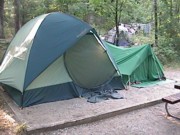

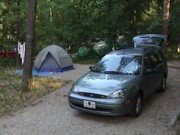
We had two sites adjacent to each other. Nathalie and I "slept" next to the three little ones. Emma had a sore throat and was coughing all night. They all claimed to have had a wonderful time. Nathalie just hopes she'll sleep well tonight.
Posted by Mark at 01:11 AM
July 12, 2005
At the library
I took a print out of my Amazon.com wish list to the Michigan City Public Library, where I hoped to browse the contents and determine what to buy while I'm within the perimeter of free shipping for US books.
The library only had 2 items of the 15. One problem for example is that I'm doing the wrong sport. The library had maybe one or two outdated books on marathoning, but full shelves of books on basketball.
Once I start browsing though, I find book after book that I'd like to read if only I had the time.
There were only a few books on being a librarian. The job looks mostly organizational with plenty of management of people and budgets. If you want to read for work, I guess you have to do research.
Posted by Mark at 02:39 PM | Comments (2)
July 11, 2005
Thunderstorms on the way
We're sort of expecting to go camping up by Traverse City this week. But Nathalie was watching the weather channel, and said we may have rain. Yahoo weather predicts a slight chance of "Isolated Thunderstorms" on Wednesday.
Not sure we want to be in a tent during a thunderstorm, but we'll probably go. We won't try to make fondue, but instead just s'mores and hot dogs.
Posted by Mark at 12:06 AM
Broken camera
Emma got a tiny digital camera for her birthday from Mom. I couldn't download the pictures. The camera itself is supposed to download over USB. Not only do you have to reboot XP to get the driver to load -- I thought USB was supposed to make it easier to get around that -- but the software also doesn't notice the pictures that the camera itself seems to have noticed.
I guess Mom'll have to take it back, see if we can get one that works like the one Tim got.
Posted by Mark at 12:01 AM
July 07, 2005
Plane seats and kids
We flew from Lyon to Paris, then Paris to Chicago yesterday with Air France. There were lots of Polish speaking people in our area of the long flight. There were also lots of people with huge quanties of luggage. There was in fact so much luggage on the carousel the guy operating it kept having to stop it and let people pick off some of their bags. I had the impression most travellers had at least one piece of luggage they could barely lift.
In the plane we had difficulty with the girls. They weren't big enough to sleep in their seats, and in fact could not really get comfortable. That's a shame. The airlines are able to handle special meals for the children, but they haven't figured out how to do seat inserts or whatever would be needed to have children sleep through (part of) the flight.
They did sleep in the car on the way to Mom's from O'Hare. Then they caught a second wind until about 9:30 pm local time. I managed to sleep the following 6 hours until they started making enough noise at 3:30 am that somebody had to get up. So Mom and I kept them occupied.
Posted by Mark at 11:46 PM
July 06, 2005
Religious, part II
Thinking more about Crichton's speech, I guess I would sum up what bothers me as follows.
Crichton suggests people who think of themselves as environmentalists as religious nuts unwilling to discuss their views rationally. He makes a relatively convincing argument, so if you don't examine it critically, you can come away thinking Crichton has proved environmentalists are religious nuts, and therefore can reasonably be ignored. Yet Crichton himself visibly constructs the argument without fully examining the situation, arguing as a lawyer rather than a scientist.
Clearly some part of what motivates people who consider themselves concerned by our impact on our environment could be called aesthetics. Andy wrote about this in his blog.
Another part of what motivates people concerned about our environment may be common sense. If you have lived near a busy intersection as we used to in Strasbourg, have commuted regularly in traffic, or have biked during rush hour, you no doubt sense from time to time that although getting around and hauling stuff in cars and trucks can be handy, it's also noisy, smelly, and perhaps even unhealthy.
A small part of what motivates the environmentally concerned may in fact be understanding of research results. Crichton may not in fact overgeneralize about this in his speech, but his approach works to help the reader overgeneralize. Even inconclusive findings could lead cautious scientists to suggest we take action to prevent potentially catastrophic impact from some aspects of our lifestyles, but the speech doesn't leave you thinking about that as a possibility.
Some part of what motivates environmentalists is also a sort of religious conviction. That helps Crichton's smear stick. It also causes what can be seen as overreaction when someone who feels conviction about wasteful or polluting behavior confronts someone doing the wasting or polluting. If the person wasting or polluting heard Crichton, of course he may already have decided he doesn't have to listen to this religious nut (particularly if Crichton helped him rationalize behavior that he himself half felt was wasteful or polluting).
In the end, because Crichton's suggested remedies seem so weak and hard to implement, because his argument seems to belong in the courtroom rather than the classroom, and because it encourages rationalization of potentially disasterous social behavior, leaving not only the resolution but even the consideration of the problem to experts, I feel an accomplished author like Crichton could do much better.
Posted by Mark at 04:22 AM
July 05, 2005
Globalization and Its Discontents
Joseph Stiglitz won the Nobel prize for economics in 2001, and the center left gave Globalization and Its Discontents one good reviews. What's telling is that a Nobel prize winning economist who spent years near the very center of power has to go on for 274 pages just to suggest that if economic policies were geared to increasing the low end and median share of the pie rather than improving the outlook for top end players in the financial markets, the fruits of economic policies would be more widely shared.
In other words, debate about the basic goals for a globalized economy ain't quick and easy.
Have readers learned anything of substance? Not sure.
Posted by Mark at 08:40 AM
July 04, 2005
To bloat or not to bloat
Paul Krugman of the NYT wrote a column called Girth of a Nation. Maybe this was for Americans having too much barbecued food today and feeling guilty about that.
The Center for Consumer Freedom, an advocacy group financed by Coca-Cola, Wendy's and Tyson Foods, among others, has a Fourth of July message for you: worrying about the rapid rise in American obesity is unpatriotic.
Center for Consumer Freedom? "Defending enjoyment is what we're all about!" Check out their Declaration of Food Independence.
Posted by Mark at 09:00 PM
Disagreement
The Register's running a story about Alex Hanff, who was fired by Aldcliffe Computer Systems for declaring, "that he is opposed to copyright and intellectual property laws." The employer concluded, "Since much of our business is based around the protection of our copyright and intellectual property, we consider our dismissal of Mr Hanff entirely justified and appropriate."
Huh? If I express views in public that are contrary to those of my employer, my employer reserves the right to can me. Now that's incentive for strategic alignment, right?
If you're an employer, do you believe that sort of strategic alignment is good for your business? Do you believe when workers kiss your butt it keeps them motivated, making them more productive?
You may have a more attractive butt than most of us, but I nevertheless tend to disagree.
Posted by Mark at 08:28 PM
June 28, 2005
Bugs, sweat, spinning
Tried wearing my normal sunglasses while biking yesterday afternoon. Everything went well for the first couple of kilometers, no bugs in the eyes, no squinting, although I had a somewhat distorted view of the road, which made me nervous cornering over what Dana calls chip seal, where they tar a patch of road and dump fine gravel on it.
But then I started sweating more. It was like looking through a swimming pool by the time I got to the train station, only about 8 km from work.
So this morning I went back to squinting. And bugs. Since late spring we've had the gnats that go for the eyes. Actually I'm not sure they go for the eyes particularly, but they stick there very noticeably. Now we also have the kamikaze bugs that dive bomb into your helmet and leave you wondering what species they are. Perhaps a wasp? Maybe I need to tape some sort of netting in there.
And I'm glad to be in France, where there are hardly any bugs. It must be much worse back in the midwestern US.
Also experimented with spinning faster than my normal 105-110 rpm target range. I find that above the top end of that range my legs jerk the pedals. At a sprint my max. cadence is probably only around 130, which explains why I've not yet gone faster than a little over 70 kph. Matt said cross-country cyclists aim for a cadence of 120, useful for not losing power over abrupt changes in terrain. That seems very fast indeed.
Posted by Mark at 01:45 PM
June 21, 2005
Abdominaux : arrêter le massacre
Shortly after I got the crunch trainer contraption, Karine lent me her book Abdominaux : arrêter le massacre. Dr. Bernadette de Gasquet says you're not going to exercise your way to a flat stomach by contracting your abdominals and squeezing them into lumps. The result of standard sit ups is unfortunate pressure that pushes the abdominal organs down and may push out the belly you're trying to flatten.
Instead, she offers this book of theory and exercises that rely on balancing the stomach muscles against those of the back, working with stretching, static tension, even breathing. But it's not because you're not moving that the exercises aren't tough. Halfway through chapter 5, "Des exercices pour aller plus loin," I was left behind. I just don't have the strength and flexibility yet to do the most effective exercises.
I have been working to keep my back straight while running and riding. Dr. Gasquet explains how good posture improves your capacity to breathe more deeply in addition to strengthening the muscles that make it easier to keep good posture. My hope is that it'll eventually pay off in terms of form. Form is the basis for being able to go longer and faster.
Posted by Mark at 06:35 AM
June 19, 2005
Last stop
Last week my brakes had worn down to the nubs. At the rear I was close to having the metal brake pad holder rubbing on the rim.

After I put the new brake shoes on, I carefully adjusted everything, taking my time. Michel brought me clips to hold things you've glued in place. They're great for calibrating brakes within about a millimeter of the rim, like having a third hand. It took a little while to get everything right, but it's nice to have the security of well-adjusted brakes.
As soon as I got on the bike to try them, the back wheel locked up.
I'm a terrible mechanic. So I put the bike down for a while. Later I came back to it. It seems the whole mechanism had rotated on it's axis. When I pushed the whole brake, everything came back into true. I coasted around inside the garage and it seems to hold.
Posted by Mark at 09:13 PM
Working
This book, written in the early 70s by Studs Terkel, was on the shelf at my mom's house, but I never picked it up there. I saw it again on the bookshelf at work where we've amassed English books.
I read it mostly on the train to and from work, sometimes in the morning before making breakfast for the children. Studs Terkel did many hours of interviews with people from all walks of life, having them all talk about their jobs, careers, work. It's not clear what generalizations you can draw from it all, except to say that lots of people had it a lot harder than I do.
If you work, worked, or know people who do, or did, you might want to read this one. It left me feeling that having a meaningful occupation is psychologically quite important, but just working is something we as human beings should be occupying ourselves with freeing each other from.
Posted by Mark at 03:41 PM
June 17, 2005
Drop out, part II
Tilly mentioned Cyril Fiévet had also blogged Steve Jobs's commencement address, concluding that Steve's ready to blog himself:
You have to trust in something - your gut, destiny, life, karma, whatever. This approach has never let me down, and it has made all the difference in my life.
And here's that quote I saw part of before:
Your time is limited, so don't waste it living someone else's life. Don't be trapped by dogma - which is living with the results of other people's thinking.
Think different. Buy an iPod. Sometimes I think there's more black irony in Silicon Valley than in all of German literature.
Posted by Mark at 10:16 PM
June 14, 2005
Faking it
The Guardian is running an article about a product for SUV owners who cannot find time to ride through the countryside: spray-on mud. Almost 8 pounds a bottle.
I wonder if the spray is safe for the ozone layer.
Posted by Mark at 02:19 PM
June 13, 2005
Solar
C|Net's running an article from TheDeal.com on venture capitalists investing in companies working in solar energy. According to one analyst, solar power costs are coming down 18% with each doubling in power output, whereas natural gas costs are increasing at about the same order of magnitude. They say solar energy, currently about $6-7 per watt, needs to drop to $1 per watt for the industry to take off.
Wouldn't it be great if the cost of solar power dropped so low it ended up being priced more cheaply than fossil fuels?
Posted by Mark at 09:01 PM
June 06, 2005
Portrait, part II
Mom sent me some drawings that I'd done a Tim's age. One of them was Darth Vador, not as well done as Tim's.
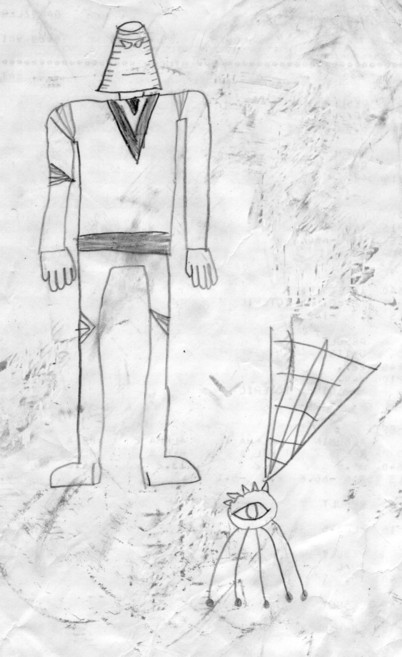
It's funny how George Lucas, after doing THX 1138 about a guy striving desperately to escape from a sort of consumer culture gone wildly fascist, makes six Star Wars movies, aiming to ensure they time it to sell useless figurines now to all the children of everyone in the whole cohort who saw the first film 47 times, bragged about that, and bought large and useless plastic Wookie figurines.
I prefer this other one, a guy with bigger front teeth than Scott McNealy.

That really reflects my inner life, in which I'm always ready to bite someone's head off.
Posted by Mark at 08:15 PM | Comments (2)
June 02, 2005
"Hormone Appears to Increase Trust"
According to HealthCentral.com, researchers found that by getting people to snort oxytocin, they can render them even more gullible and trusting than they already are. I can barely wait until we have to start sniffing oxytocin before each all-hands meeting led by a Director or above. Maybe we can find a way to broadcast it during quarterly earnings calls. Now there's a nice idea for a patent...
Posted by Mark at 09:00 PM
June 01, 2005
Le Challenge
Matt arrived in 81st place out of 371 finishers doing the long loop of the Challenge du Dauphiné Libéré as a race last Saturday, riding the 180 km in 6:09:03 chip time, 6:10:47 from the start. If you check that site out, you'll notice they did 8 cols, so Matt's avg. speed of 29.3 kph (18.2 mph) including drink stops is less than 5 kph (3 mph) slower than the guy who won (and who probably had people handing him water bottles).
Matt said he had two primary difficulties. First, he got stuck behind many, many other riders starting out, so couldn't draft on people going his speed. Second, he experienced unexplained but sharp foot pain 2:30 into the ride until the end. It was bad enough that it prevented him from riding as hard as he normally would.
He says he's not quite as light as he'd like to be for his power output, and that makes a difference on the uphills. He seems to make up for it however on the downhills where he corners much more efficiently than other riders, thanks to his background in off road cycling. With 8 cols and a couple thousand meters of climbing, good technique makes a difference.
All in all, it looks like he had a pretty good ride for a guy who spends so much of his time hunched over a keyboard.
Posted by Mark at 09:30 PM
To the Ends of the Earth
To the Ends of the Earth covers the Transglobal Expedition led by Sir Ranulph Fiennes, who then wrote the book. He and one other guy went round the earth over both the south and north poles from 1979-1982.
I read this primarily because Rob made it sound interesting. Fiennes is someone to admire but at the same time vaguely dislike without knowing why. In any case what he and his team did is beyond imagining. The writing is vivid, all action, yet reserved, leaving the reader sensing the impossibility of conveying in words how the preparation, then expedition must have been for the participants.
In any case it was much easier to read this book about people rising to frightful challenge than to make my way through Madame Bovary about everyday despair. Or the Old Testament, where from it becomes clear that in addition to everyday despair, there will be divine vengeance.
Posted by Mark at 11:25 AM
Sluggish, part II
The headache is mostly gone now. Slept badly again. Very dark frame of mind trying to fall asleep.
Posted by Mark at 11:23 AM
May 30, 2005
Headache, part XV
It was raining steadily in Chambery. The chiropractor had a portable air conditioner with an exhaust pipe snaked out the window of his office. The waiting room window had been wide open.
He asked me why I'd come back, so I told him my headaches had not gone away. He explained that it might be something not in my spine, but in my skull. He asked me when the headaches start during my runs. They don't start right away, but after a few minutes. I also told him how sometimes running harder makes the headache recede.
He concluded I have -- cannot remember the medical term for it, something like surtension arterielle cranienne -- a problem related to circulation, in that the blood has an easier time going into my head than leaving. As a result the pressure builds and gives me a headache. The reason it would recede at higher heart rates he didn't explain technically, but told me more valves open when the system's working harder, so the pressure could be released by going to the limit. In my experience it's also possible that the pounding and lactic acid you get when pushing hard make everything uncomfortable, so you notice the headache less.
He checked my spine and found it okay. Then he applied various squeezes to my head. That felt quite strange. I tend to imagine the adult skull as completely rigid, but it was evident from what the chiropractor was doing that the skull is slightly elastic.
Now that it's over I feel unusually tired. He said I would very likely be tired this evening and perhaps tomorrow as well. My hope is that the circulation problem is primarily mechanical.
Posted by Mark at 07:51 PM
May 28, 2005
THX 1138
Speaking of science fiction by George Lucas, I got THX 1138 from the CE videotheque at work yesterday. Friday night television is bad enough that Nathalie didn't mind my watching it.
It sent her off to read after about 15 minutes. THX 1138 is a sort of art film inspired by a mix of George Orwell, early 1960s America, and California as a life style. Unlike Frank Zappa's music however it seemed awfully sparse. Perhaps I simply didn't understand enough of it to get all the subtleties. Perhaps I should watch it in English.
Then I saw part of the bonus, which was George Lucas and Walter Murch (coauthor and sound guy) talking about how they didn't expect me to understand it. The film is copyright 1970. I guess since then Hollywood has become less experimental. How many films do they make nowadays where the unknown screenplay writers tell you up front they don't want you to be able to figure out what's going on?
You can probably get away with it, but you have to have done something comprehensible or at least commercially successful already.
Posted by Mark at 02:38 PM
May 24, 2005
Off road biking
When we went to Porquerolles, I had great fun riding around on a mountain bike, regressing back to a time of popping wheelies and jumping ramps built of scrap wood.
On a road bike you can have the fun of smooth high speeds, intense exercise, distance workouts. The difference with off road biking at least as we did it the other day is that with a road bike, I'm still riding to get somewhere. With a mountain bike I was riding mainly for entertainment.
Nathalie saw me looking at mountain bikes on the web and forbade me to get one for her birthday. She said she'd rather have a printer. I'll have to get her something silly instead. She's becoming too much of an adult for her own good.
Posted by Mark at 09:48 PM
May 20, 2005
Avignon
We'd never been to Avignon together so we stopped there for lunch.




After that we came back home. The kids were glad to see us.
Posted by Mark at 10:13 PM
Cassis
Nathalie wanted to see the cliffs, but we didn't feel like taking the boat.

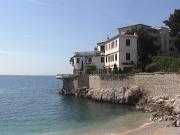
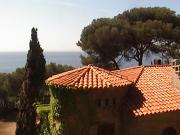
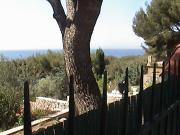
We saw a few shreads of beach, mostly lots of fences around beachfront property belonging to people who didn't want us looking in.
Posted by Mark at 10:02 PM
May 18, 2005
Driving through Toulon
Whoever said driving through Toulon around rush hour is bad... was right. We took a side road and still got stuck in traffic 10 km from the city center.
Posted by Mark at 09:54 PM
L'Ile de Porquerolles
We took the ferry from Giens to Porquerolles today. Porquerolles is a relatively small island. You can rent a mountain bike and see the main sites in a few hours, even taking it quite easy.



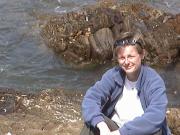






Nathalie and I managed to ride up to a pass, the Col du Langoustier. Cannot tell for sure -- I don't have the map -- but it seems that col is less than 85 m above sea level.
Posted by Mark at 09:41 PM
May 17, 2005
Thunderstorm
It's over now, but we had quite a thunderstorm roll in this afternoon.


The ground's so dry underneath the water just runs off.
Posted by Mark at 09:33 PM
Le Castellet
After breakfast Nath and I went to Le Castellet near Le Beausset, which is a touristy place, but it's not yet tourist season.




The vegetation down here is very different from home. In addition to the flowering cacti we saw lemon trees, wild figs already ripe, and so on.
Posted by Mark at 09:24 PM
Bandol
Last night we spent some time looking for dinner. There wasn't much open in Le Beausset. We ended up down the hill by the sea in Bandol.
Ate a Corsican sausage called a figatelli, which turned out to be tough to digest. But nobody interrupted our dinner at least.
Posted by Mark at 09:17 PM
May 16, 2005
View from Evenos




Posted by Mark at 09:14 PM
May 15, 2005
Headache, part XIV
Tried running this morning, though I felt bad before even going out. I ran 4 minutes. Everything hurt. So I gave up. Nathalie says I should call the chiropractor tomorrow.
Posted by Mark at 02:06 PM
May 14, 2005
Headache, part XIII
Not sure what it was. It started before the birthday party today, but I'd done nothing strenuous. Finally took two ibuprofen. They only worked for a couple of hours.
My neck hurts. I found one spot where pressure causes local pain. Maybe that's it. Maybe I worked out too soon after seeing the chiropractor. Maybe it's something more sinister than a little mechanical problem.
Posted by Mark at 06:30 PM
May 11, 2005
Weird sensations
At about 4h15 this morning I woke up and couldn't get back to sleep. My neck and back felt... not wrong, just odd. Another side effect of yesterday's visit to the chiropractor seems to be these periods of feeling slightly intoxicated.
My body must be relieved or tired or something. I've also had several attacks of laughter.
Posted by Mark at 01:27 PM
May 07, 2005
Headache, part X
The doctor taking x-rays concluded my sinuses are not the problem.

Too bad I couldn't get an acceptable scan of the x-ray showing my neck bones slightly out of joint at the base.
Posted by Mark at 04:29 PM
The Call of Cthulhu
In the summer of 1926, H. P. Lovecraft wrote The Call of Cthulhu, later published in Weird Tales. I read it again this afternoon.
Lovecraft adds depth to his fiction with the Elder Ones, R'lyeh, Abdul Alhazred's Necronomicon, the entire faculty of Miskatonic, the city of Arkham. In the same way as Stanislaw Lem, he easily pulls in references that hint at a whole world of the same scope as Tlön, taking over at the outskirts of the familiar. These guys were great liars.
Although The Call of Cthulhu fails to leave as lasting an impression of impending doom as At the Mountains of Madness, it's quite a classic. All of Lovecraft's stuffy New England racism bubbles to the surface, his nightmares blister over and ooze pus. All of his cold sweat shakes and starts resemble Thomas Mann, seasick and feverish, come to America, land of extremes.
Posted by Mark at 03:39 PM
Headache, part IX
Went in for x-rays of my head this morning. Dr. Rantz wants to use the x-rays to help determine whether it's sinusitis or misalignment in my neck bones.
Tuesday I'm going to see Nathalie's chiropractor, since part of the prescription is to visit a physical therapist, and Dr. Schuhwerker can do that. He may also be able to explain how the marathon threw my jaw out of alignment.
I'm considering laying off my regular running until I've seen Dr. Schuhwerker, perhaps going out on the bicycle instead in the meantime. Trouble is, the weather, which was beautiful this morning, has now turned colder and cloudier. Metcheck.com predicts no rain, but plenty of wind and 13-14 C (55-57 F), so I'll probably want to ride covered up.
Posted by Mark at 11:11 AM
May 06, 2005
The Colour Out of Space
Read The Colour Out of Space as a bedtime story yesterday. It's not clear why H.P. Lovecraft chose British spelling for the title, but use of "grey" in place of "gray" makes sense.
His stories seem so quiet, as though you drift off to sleep while reading them, sinking into bad dreams. Unlike other horror his doesn't seem to rely on surprise even for suspense. You can reread the better stories over again without dispelling the shadows. After putting the story down, the cold remains. You can go out in broad daylight and see darkness underlying sunlight, the quiet tension amidst weariness, the desperation felt when depression becomes tinged with paranoia.
H. P. Lovecraft seems almost Lutheran.
Posted by Mark at 08:53 AM
May 03, 2005
Nath's favorite
Maindru Photo was taking pictures of us in Lyon the day we ran. Nathalie likes this one.
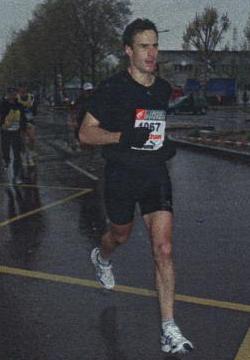
There's another one of me with a stride about 6 inches long. They took it in the park at about kilometer 38.
The photos are expensive, however. I'd be willing to get one if it showed me striding first through the tape at the end. Guess I'll have to train more.
Posted by Mark at 09:38 PM
Here I Stand
Janetta lent me Roland H. Bainton's Here I Stand: A Life of Martin Luther. The excerpts near the end of his sermons make you want to read those.
Don't read the cover blurb ("unshakable faith in his God") too quickly. Luther was tormented his whole life, suffering from doubt and depression, illness and controversy serious enough he had to hide out more than once.
Not sure how I feel after reading this book. On one hand, there's admiration of this brilliant man who worked so well not only on his own relationship with God, but also to lead the way for all of us sharing some of the Lutheran culture understand our relationships with God. On the other hand, there's nagging doubt, the sense that he somehow missed the point.
Posted by Mark at 09:49 AM
May 02, 2005
Headache, part VIII
Dr. Rantz prescribed x-rays and nose sprays in case the headaches come from sinusitis, he also prescribed neck massage in case they come from stiffness on the left side of my spine.
Sure takes a long time to go to the doctor. I arrived at 8:00 am, spent 15 minutes with him, and left at about 10:15.
Posted by Mark at 03:26 PM
May 01, 2005
Headache, part VII
Another pounding headache this afternoon. Makes me wince each time I make an effort that increases the blood pressure in my head. I'm going to have to take an hour off work tomorrow morning to see my doctor. This has been going on for a month now. It's getting harder and harder to train or work properly.
Posted by Mark at 03:31 PM
April 25, 2005
Headache, part VI
Yet another headache, this one almost incapacitating me for the afternoon. It seems unlikely that this would be activated by pollen alone, since it's rained on and off all day again.
Maybe I should go see the doctor about this. The last time I had recurring headaches like this, they resulted from sinusitis.
Posted by Mark at 07:16 PM
April 24, 2005
Headache, part V
The pharmacist suggested perhaps my headaches come from spring allergies. You can see the pollen as a yellow film on dark cars.
If it is an allergy, I wonder why I don't remember having them in previous years. Maybe there was less pollen.
Posted by Mark at 10:05 AM
April 22, 2005
Guide nutritionnel des sports d'endurance
Denis Riché told me more than I can recall and as much as I wanted to know about runner's nutrition.
Some of this may explain why I hit the wall early last Sunday, after only 30 km. I'd not carbo-loaded enough for one. The cold weather may have led to extra work, but I shouldn't have been worrying about my weight. Instead I should've been piling on the complex carbohydrates in the last 3 days. I also shouldn't have taken protein the morning before running a marathon.
In general, my diet probably doesn't include enough carbs, but does include too much fat for a distance runner. If I increase the running this summer, I should also increase the carbs. But not sugars. Complex carbs. I should also limit the fats and eat more green vegetables.
Riché suggests an ideal weight for the endurance athlete my size would be in the range of 79 kg, potentially a little bit less. He encourages readers not to diet nor to use vitamin and mineral supplements without the advice of a doctor. If I do want to lose some weight, it's okay to do it as long as it's gradual, and done mainly by reducing intake of extra fats and sugars, though Riché notes it's important to keep eating foods with high nutritive density, some proteins and good fats, with plenty of complex carbs.
Overall the book is too much to absorb in one sitting. I'll have to look more closely at a few of the sections concerning rations of various food types, and I should run through the questionnaires again to look for nutrients of which I may not be getting enough.
Posted by Mark at 09:57 PM
Rain, part VI

Everything's waterlogged. It's been raining off and on since we arrived.
Posted by Mark at 11:34 AM
April 20, 2005
Problems
I tried reading Flaubert, Madame Bovary. Too damning and depressing to keep the mind off life's little failures. A better way to handle life is to blot it out with detective novels, running, books about running, time wasted at work or on the computer. I concentrate on those and the frustrations dim.
I'm less worried about Nathalie's job hunt or our relationship than a few months ago. Seems like she's motivated to handle the first. For the second, we can make day to day progress. It's tough to have an intimate life with three small children.
Posted by Mark at 06:55 AM
April 18, 2005
Soreness
Yesterday my legs hurt as I just sat there, or lie there as the case may be. I woke up at 3:00 am, having sweat as if I'd had a bad fever. Hobbled down to the couch to read and then fall back asleep.
Here's what it looked like when everyone was fresh:

This afternoon I felt fine sitting down. My colleagues pitched in and got me a fine bottle of Champagne. How nice of them.
I'd avoided the stairs since this morning. Then I walked down a short little incline to get in the car and go home. Excruciating!
Matt and others say tomorrow should be worse. Guess I probably won't be able to run before Thursday.
Posted by Mark at 08:34 PM
Real time
I came in 585 out of 2841:
CRAIG Mark
Marathon - 17/04/05 - LYON (69)
Arriv�(e) 585 eme sur 2841 avec un temps de 3:16:56
Soit 253 eme sur 962 dans la cat�gorie SEM
Dossard n� 1067
The time is over a minute off. It seems like the only ways that could've happened is if either I'd not been picked up on the way out the chute, or the end of the race was really not the finish line, but the folks waving magnetic contraptions, who waved my number on my way out after I'd gone over to the side and had a bottle of sports drink to start recovering.
Maybe the elite of the elite were running in London this weekend. Or perhaps the horrible weather slowed people down. In any case, the elites weren't breaking any world records Sunday:
MARATHON HOMMES :
1er : Pasteur NYABENDA (BDI) � 2h18'55
2�me : David LAGET (FRA) � 2h19'30
3�me : Micah KIPROTICH (KEN) � 2h23'42
(Sources: http://www.occade.com/pagesasp/marathon.asp and http://www.sport-up.fr/lyonmarathon)
Posted by Mark at 03:49 PM | Comments (1)
April 16, 2005
American Tabloid
American Tabloid is another James Ellroy novel. This one covers the events leading up to the assassination of JFK. Ellroy makes it all sound plausible. To suspend disbelief, you need to accept his well-jaundiced view of social circles near the tops of the power pyramids. Once you do that American Tabloid not only entertains, but also starts to corrode your faith in society.
Janetta lent me Roland H. Bainton's biography of Martin Luther. That should wash Ellroy out of my system.
Posted by Mark at 07:37 AM
April 14, 2005
Cold rain, snow, and some wind
Metcheck.com currently predicts a low of 3 C and winds of 28 mph during the night from Saturday to Sunday with rain and snow. Yahoo Weather concurs, expecting a low of 5 C and a high of 12 C Sunday afternoon in Lyon.
Again, I'm crossing my fingers. If the wind could stay gentle, the rain hold off until the last few miles, and the temperature stay around 7 to 10 C, it might even be pleasant for the first half.
Posted by Mark at 08:46 PM
Shostakhovich, Symphony No. 5
It runs the gamut from bombastic sfz. brass and tympani to delicate pp. strings and woodwinds. With both bright and eerie melodies, harmonies that make your stomach flutter, dark thunderclouds, dances, Shostakhovich's No. 5 both reminds me of an unidentified black & white film soundtrack and of the kind of violent internal mood swings that come with falling in love.
Unfortunately I was listening to this in the Ax, driving down the autoroute. A better setting would be a dim, quiet room with a comfortable chair, perhaps high quality headphones.
Posted by Mark at 08:30 PM
April 12, 2005
Why not to run
Guardian Unlimited has an article, Running sore, with 10 reasons not to run the London marathon. Number 10 is my favorite, Delayed Onset Muscle Soreness (DOMS), "the result of micro-tears occurring in the muscle fibres."
DOMS is one reason why rest days are no fun. The other reason is that instead of being outside wearing out your body and calming your mind, you're either inside wearing out your nerves listening to children on the rampage, or outside wearing out your back noticing how over time you're going to lose the weeds-and-lichen-vs.-grass-and-fruit-trees battle being fought in your yard.
Posted by Mark at 09:49 PM | Comments (2)
Solaris 10 on the laptop
Although I haven't had time to look into getting the built-in wireless going, Solaris 10 on this laptop has at least one nice aspect I missed on Linux distributions: the fonts look good and are easy to read, even with applications I installed myself like Firefox and Thunderbird. What is finished seems very carefully done.
Posted by Mark at 12:59 PM
April 11, 2005
Music downloads
Although you've probably heard a lot about people getting in trouble for illegal music downloads, you might also know there's quite a bit of music available for free download. This evening I downloaded a few songs and burned a CD.
What's a shame is that I cannot show up with some sort of proof-of-purchase of old cassettes I bought, digitally sign that I'll use the downloads only for my personal consumption, and thus get back a bunch of music I no longer can listen to in any convenient way.
Posted by Mark at 09:30 PM
April 10, 2005
Paris-Roubaix
You have to have a deathwish or a screw loose to race the Paris-Roubaix. Wind and rain, sharp cobblestones, narrow, dirty trails. Every 5 minutes somebody has a flat, or goes down.
Posted by Mark at 03:47 PM
April 05, 2005
Holst: The Planets
On the way back from work I gave Stockhausen a rest and listened to Holst instead. Every time I hear Mars: The Bringer of War the two climaxes sound like predictions of the wars in Europe, but the piece in its entirety sounds like the soundtrack to a science fiction epic à la Star Wars.
Holst does glory and destruction better than love and beauty. Venus somehow lacks part of her depth. The Winged Messenger sounded to me more like a fountain. Maybe part of my problem with the delicate pieces is the level of road noise in my car.
If you want a good giggle, try the Midi version from AquarianAge.org. I'm listening to Mercury now using timidity. Holst's Planets, the mid-80s Casio keyboard version.
Posted by Mark at 08:58 PM
Stockhausen: Aus den Sieben Tagen

It doesn't hold a candle to Stimmung -- you don't find yourself humming it at the coffee machine afterwards. It also sounds dated, like nobody forging sounds would do work that primitive and direct now. What's strange about listening to Aus den Sieben Tagen is how you hear echoes of this in Zappa and King Crimson just a couple of years later.
Posted by Mark at 09:40 AM
April 04, 2005
Eagles greatest hits, 1971-1975
This CD has been in the collection for a while. Must've been cheap. The surface of the CD had small scratches that made it skip in the car, so I made a copy. The copy doesn't skip.
I remember hearing the Eagles on the radio when we lived in Ann Arbor. I didn't remember how tame and pop those songs were. True, there are not many songs in 3/4 time like Take It to the Limit on pop radio now. But most of it almost makes you embarrassed it's so slick and 70s. If you don't believe me, listen to One of these Nights.
That said, they had polished their act. Don Henley had a voice that fit the target perfectly. Joe Walsh was effective as a pop guitarist. A few of the lyrics were nifty the first couple of times around. They were poised to do something like Hotel California.
Some Stockhausen should eliminate all the pop in my system.
Posted by Mark at 08:45 PM
April 03, 2005
Calogero at the Summum
As I mentioned in passing yesterday, I took Nathalie to a concert in Grenoble last night. The singer, Calogero, is from around here, and has become a mainstream pop star and songwriter in France over the last couple of years. His songs are fine and he has a nice voice, which he managed to maintain throughout the night as the band played louder and louder to drown out all his local fans singing along with him at the top of their lungs. He and his band did two encores.
We were on the standing on the floor with almost everyone else. This was a shame, because guys like me (189 cm) could easily see everything but the band's shoes. All the women who turned up, sang along, danced, and generally seemed much more enthusiastic about Calogero's crooning good looks had to stare at the backs of other people's heads a lot of the time. After the show Nathalie told me the woman standing next to her had dragged her husband there, so he was standing by with his hands in his pockets. She was singing loudly and clearly, dancing along with the music.
The mix was okay, but suffered from a bit too much bottom end. The focus of the show is Calogero's voice. He sings a lot between the upper range of his normal singing voice and the point where he goes falsetto, doing the transitions well, but not as well as in the studio. He plays mostly relatively simple bass lines, and that and the drums were mixed up front. Both his guitarists -- one of whom looks like he's sharing clothes and disdain for facial creams with Keith Richards -- were mostly drowned out, as was his keyboard player. By the end of the concert, that was getting to be a shame, since I'm sure those guys could've done some more interesting stuff than what they were paid for.
The opening act, a guy named Matthieu Something-or-other and his band, was a little embarrassing. It sounded like they didn't get any tech support. The guitarist was way to high in the mix, and Matthieu's guitar was imperfectly tuned. The poor guy had a nice voice, managing to sing in tune with only his guitar even when his Am chords set your teeth on edge.
All things considered, Nathalie enjoyed it quite a bit. She craned her neck for so long she thought she was going to be sore this morning, but wasn't. The children were jealous and singing his songs to the babysitter last night and to us this morning.
Posted by Mark at 10:24 AM | Comments (1)
March 31, 2005
Speed... or lack thereof
It hit me like a brick when I stopped to think. Rep 15 during my intervals today seemed fast. Then I divided by 2 to get the 100 m speed, noticed it was 3 min/km, multiplied by 42.195, and got 126.585, in other words 2:06:35.
A 2:06:35 marathon is slower than the current world record.
So all I need to do is run the whole exercise about 2% faster than my fastest rep today, cut out the rest intervals, and do that a little over 14 times in a row. I'm pretty sure it won't happen for mid-April.
Posted by Mark at 07:09 PM
March 30, 2005
Climbs
Matt, who rode up to Col du Coq today and got a flat 500 m from the end, located a nice Italian site for bikers in Europe.
File of the slopes of Europe has links to data on literally thousands of climbs. For the Col de Granier it shows four. The one I did last fall up from Chapareillan rates a difficulty of 135.75. It has one kilometer that drops 3.1%, but unfortunately the kilometer after that gains 17.9%.
The one Matt did today has a difficulty of 128.26, slightly more than Alpe d'Huez, which is what they did in the Tour.
Matt's aiming at doing the 12.8 km Col du Coq climb, gaining just about 1100 m altitude, in 53 minutes. I'd definitely have to lose about 20 kg without losing muscle mass to follow him uphill at that rate.
If you want a dismayingly hard climb, check out Nebelhorn.
Posted by Mark at 09:04 PM
March 28, 2005
Spring ride, part II
One of the reasons I like running is its simplicity. Not only are shoelaces the most complicated apparatus you have to adjust, but the most cleanup you have to do for your equipment is scrape off the dirt and chuck it in the clothes washer.
After riding for 77 minutes this morning, I spent half again that much time this afternoon removing crud from the bike, and cleaning, then oiling the chain. My saddle bag came unzipped during the ride, causing the inner tube to fall out somewhere between here and Chambéry. And I hit something somewhere that caused a small rip in the rear tire sidewall. Going to have to replace both the missing tube and the ripped tire before I ride again.
Posted by Mark at 08:32 PM
Brown's Requiem
James Ellroy wrote L.A. Confidential, which inspired a film you may have seen about a guy who uncovers corruption in the L.A.P.D. and almost dies for his trouble. Brown's Requiem is apparently Ellroy's first book. It has the same Série noire, L.A., corrupt, violent plot and tone.
Ellroy says in his preface that, "Brown's Requiem is heavily beholden to Raymond Chandler." It also recalls the book of Dashiell Hammett stories someone gave me years ago. In that way Ellroy is making new antiques, like a carpenter turning out Louis XIV chairs. If you look closely you see some of the new chairs are more uniform than the old ones, the joints fit together more closely and the upholstery has a more even weave.
Brown's Requiem is probably not Ellroy's masterpiece. I haven't read the others. This one fits together well, without too many of the misaligned dovetails you find in bad novels where the author writes outside of his experience but inside yours.
Posted by Mark at 07:42 AM
March 24, 2005
J'vous ai apporté mes radios
Guy Carlier was on the 7-9 at France Inter for a while, reading his letters. The 7-9 is flat without him. Hearing the humor yourself is harder than letting Guy do it for you. And you'll never quite manage his clichéd but pinpoint caricatures.
J'vous ai apporté mes radios is a best of collection of all those letters those of you reading this in English probably never heard. Nathalie asked me a couple times why I was sniggering. Carlier's book was it. There were a few I hadn't heard yet.
Posted by Mark at 08:10 PM
March 20, 2005
The Marriage of Heaven and Hell
Finally reading the foreword by Geoffrey Keynes, I notice the original print run of William Blake's revolutionary Marriage of Heaven and Hell stopped at only 9 copies, none of which seem to have be reproduced until 1927. Keynes's edition from Oxford University Press was first bound in 1975. Mine is a paperback 10th printing.
Like Blake's contemporaries as seen by Keynes, I find the author quite beyond my comprehension. Of course anyone who reads English would be bowled over by the prose of the straightforward plates, and at least distracted by the allegorical passages. But do I understand the guy? Uh, no, not really.
Keynes seems to have understood. He's doubtless infinitely better read than yours truly. When I turn to the cover illumination, the prime connotations I get are Dr. Seuss, H. R. Geiger, and Frank Zappa's monologue before Ms. Pinky on YCDTOSA, Vol. 6. (I'd scan the images, but would need copyright waivers from all the publishers first.)
Posted by Mark at 02:20 PM
March 18, 2005
Taxes online, part IV
Nathalie finally gave up. It's going to cost us 20 euros more to declare by paper. But since it just doesn't seem to be possible to sign our tax return online, we're afraid we won't be able to do it on time to avoid incurring a penalty.
Posted by Mark at 09:06 PM
Debuggable shoes?
C|Net's running an article on the new Adidas shoes Dana mentioned to me a while ago.
The Adidas-1 sneakers use a sensor and magnet to feed information to a microprocessor, indicating whether a runner's cushioning level is too soft or too firm. The processor then actuates a motor-driven cable system built into the arch of the shoe that changes the amount of padding applied to a person's foot.
Adidas says the battery lasts for 100 hours running, which they say is the normal life of a pair of running shoes (in the neighborhood of 600-800 miles for most people I guess). Slowly it dawns on me that if you buy their shoes and train seriously in them -- for example, 50-75 mi/wk -- you could go through 4-5 pairs of those shoes a year, or $1000-$1250/yr for running, without counting the cost of all the extra food you'd be wolfing down.
Posted by Mark at 08:18 PM
Taxes online, part III
Okay, it doesn't work at night. But this was at 5:46 am:
Votre demande n'a pas pu aboutir.L'acc�s au service est momentan�ment indisponible. Veuillez nous
excuser pour la g�ne occasionn�e. Nous nous effor�ons de r�tablir le
service dans les meilleurs d�lais.
Merci de bien vouloir vous reconnecter ult�rieurement.Pour plus d'informations, le service d'assistance est accessible selon
la modalit� de votre choix (assistance t�l�phonique, m�l ...).Pour retourner � la page d'accueil du site, veuillez cliquer sur le
bouton situ� en haut de cette page.
So when can you sign your form? Do they have someone performing the crypto algorithm by hand?
Posted by Mark at 08:07 AM
March 17, 2005
The Art of War
Sun Tzu's commentaries on The Art of War cover the subject from the general's or statesman's point of view. Some critics find this book appropriate for business people as well, but Sun Tzu didn't leave us something that translates into The Art of Commerce. Business is not war.
How far can one reasonably stretch Sun Tzu's descriptions of how to go about warfare? How far can one read The Prince into business, or politics, or everyday life?
In many ways these books were not aimed at me, nor probably at you either. We're not conquering generals or hereditary aristocrats, right? Are those positions worth aspiring to from this point in history? If they're no longer worth aspiring to, what would it look like to move away from those bygone aspirations?
Posted by Mark at 02:00 PM
March 15, 2005
Taxes online
A year ago I looked into doing my federal income tax return in the US online. The federal government had left that up to the private sector. I didn't manage to find a free tax program that could handle someone residing outside the US. So I resorted to paper ever since.
Last year we also tried the French online system for the income tax return. We got as far as trying to provide a digital "signature," and got what seemed to be the equivalent of a busy signal. At one point, I tried reiterating the connection 30 times in a row without success.
This year the French online system is even more broken for us. You have to get a cert to get started. As part of that process, it tries to install a .jar in $JAVA_HOME/lib/ext, which is:
drwxr-xr-x 2 root bin 4096 Jul 19 2004 ext
Of course I'm not running my browser as root. So I guess if I want to use their system, I have to work around Java security. Really rachets up your confidence that your taxes declared on line won't end up in somebody else's pocket.
Posted by Mark at 08:51 PM
March 13, 2005
Justine
Larger and more hideous than real life, this 200-year-old porno paperback got on my shelf a long time ago. My French instructor at summer school in Dijon years ago, Olivier, studied de Sade's life and work. I probably bought Justine for 10 francs and found it difficult to read. I still find it baroque. A strange book to read now almost simultaneously with Richard Dawkins's.
What I didn't realize then was how much time de Sade spent in prison. He was even in Miolans, where we took the children. From a certain angle Justine looks like the prison we build for ourselves. The only ones claiming to be free are those who choose a role in the prison.
Posted by Mark at 07:43 AM
March 08, 2005
International Women's Day, part III
Checked News.Google.com to see if there was anything on International Women's Day.
Top story is titled Bill Clinton to Have Scar Tissue Removed. Nothing on International Women's Day.
I still feel bad about my failure to get any flowers, but I seem to be well within one standard deviation of the mean for my nationality.
Posted by Mark at 09:07 PM
Pepsi generation
jwz blogged a site of Soviet anti-alcohol posters.

Is it just me, or does that look like a Pepsi bottle on the right?
Posted by Mark at 08:42 PM
March 06, 2005
Forwarding at Gmail
Roch, Gilles, and I were listening to Carole tell us about her parents' experiences using their PC, especially browsing. I finally understood why pop-up ads continue to exist: Some people still notice them! I almost had to have another coffee to recover from that realization.
Most of us more or less in the trade abstract away much actual UI content. Myers-Briggs idealists probably abstract away even more than those with natural sensing capabilities. (Yes, this is also an excuse for why I use the default MovableType template and my blog looks so ugly and plain.)
Gmail had a New Features! link at the upper left and I didn't notice until today. You can now automatically forward from Gmail to your other accounts, and do that as part of filtering. A good thing if you want, for example, if you're planning to do a backup.
Unfortunately Google's Desktop Search still, "Requires Windows XP or Windows 2000 SP 3+," so is only available to people paying the Microsoft tax.
Posted by Mark at 07:51 AM
March 01, 2005
Dynamics
The car I drive is a dark green 1995 (or 1996?) Citroën Ax, best summed up as basic transportation. 165K km, 1.0 liter; I can no longer get the driver's side window to open; the locks don't work too well anymore; it's loud on the highway. This is the environment where I'm free to listen to music.
So maybe it's the cheapness of my listening environment, but I was listening to the first disc of Great Deceiver, which is a compilation of live King Crimson from the 1973-74 lineup. It sounded so awful, I wonder why I bought it years ago.
Probably because the two studio albums from that period I have on CD are so good. Starless and Bible Black came out in 1974, but the brilliant one is Larks' Tongues in Aspic. Unfortunately I cannot actually hear some of the good parts of Larks' Tongues in my Ax on the highway.
Larks' Tongues features wide dynamics, a whole palette of sounds. My impression is that when it was put together, in the studio, these guys were listening to the sounds they made on good speakers or headphones, concerned primarily with creating the kind of performance you'd sit and listen to in the same way you might read a book or watch a film. With most if not all of your attention.
Several years later, bands like Van Halen were listening to tunes on their car stereos when mixing them down to make sure they sounded good under those conditions. Lo-fi music, road noise competing for your fickle attention as you swirled through the radio stations looking for something distracting. Dynamics disappeared. Even a lot of Frank Zappa stuff sounds compressed into a narrow range.
A long time ago, people used to sit and listen to performances that took hours. The average pop song lasts how long? Less than 3 minutes? In the future, it'll all have to be over in the time it takes to surf to the next channel. An entire performance in a fraction of a second.
At the other extreme, the reaction is going to leave other people searching for the richest hues, the widest dynamics, the most involving performances, the musical equivalent of Borges's story about Nolan's work on Fergus Kilpatrick.
Posted by Mark at 09:45 PM
February 28, 2005
Polar fritz, part III
As hypothesized when I removed the polar fleece top this morning at work, Zap! the heart monitor went dead. Will have to remember to take off the heart monitor first.
Posted by Mark at 09:34 AM
February 27, 2005
Shorts
Hmm. Why are there so few short tights for sale out there?
Road Runner Sports puts short-length tights in their "Fitness" category, a word I thought was internationally reserved for people who exercise only occasionally and then feel they're overdoing it if they break a sweat. Serious runners must either be so thin their flapping inseams never touch the opposite legs, or must masochistically revel in bleeding, chafed inner thighs.
I run wearing short tights, what ChampionCatalog.com calls "Compression" shorts. These have the advantage of not chafing, but the "compression" feature makes them less than optimal for runs much longer than an hour. Once you've sweat enough that even Lycra stays thoroughly soaked, their lack of support for the male nether regions, and tendency to compress liquid near the low-lying portions of the fabric where it can become very effectively chilled by icy wind mean these shorts that are great for a 10-K can become torture after 20. This is also the case if you run with short tights under regular long tights, except there's fabric enough for twice the chilled sweat.
So I'm looking for a good selection of distance running shorts normal people would wear. Either that or I need to lose another 20 kg, 10 from each thigh.
Are the baggy ones somehow okay? What's the secret? The fabric?
Posted by Mark at 06:08 PM | Comments (2)
February 25, 2005
Partial solutions
Michael Gorman has a way with hyperbole. First I saw this in Revenge of the Blog People! on LibraryJournal.com:
Blog People (or their subclass who are interested in computers and the glorification of information) have a fanatical belief in the transforming power of digitization and a consequent horror of, and contempt for, heretics who do not share that belief.
The Blog People subclass in question must not have a very close relationship with real software.
Gorman wrote that as rebuttal to blog entries in response to his Los Angeles Times editorial suggesting the hullabaloo over Google's project to scan old books is akin to personal commuter helicopters and briefcases of microfilm to carry the entire Library of Congress, solutions looking for problems. Right.
But in the first article he also suggests that Google hits "may or may not be relevant," and come back "in no very useful order." Since he didn't include a link, I Googled to his original editorial, Google and God's Mind. It was the third hit after a couple of blog entries at MemeStreams.net referencing the editorial.
Gorman's right, and Google's right. Or they're both slightly wrong. Googling for something when you don't know what you're looking for -- doing research rather than looking something up -- seems as pointless as Gorman concludes. Yet Google provides a fine tool for retrieving something you know is there, but forgot where you or someone else put it on the web.
Google's okay if you already researched the French prison system in the 19th century and need to find that quote about "few murderers in the prisons of Nantes in 1874." It works even better if you cannot quite remember what flag to pass the Linux kernel so it'll boot from CD-ROM over PCMCIA on a Vaio laptop. It does it better than other general purpose search engines, and that's why you use it.
At the same time the folks heralding Google as the electronic equivalent of "the mind of God" have had too much of the CoolAid. If you want to learn something about the French prison system in the 19th century, or about how Linux works, of course you read a book prepared by someone who knows the subject and writes well rather than scan a bunch of Google hits in the order they occur. Retrieval is only a small part of the story. Even someone with a PostIt pile life knows that.
Partial solutions are a good thing, though, for the problems they're originally supposed to solve. It's only unfortunate when they get overhyped, overrated, and oversold. Scanning books, putting them online, and getting them indexed is a good thing. Expecting people to learn what's in the books by scanning the index would be unfortunate.
Posted by Mark at 08:59 PM
A Kauai Blog
Andy's started his blog, using WordPress. It looks great, though a few teething problems remain in the links.
As Patrick Chanezon noticed, blogs could serve as a link between the culture of email, and the culture of websites.
It depends on the topic, but if you're going to write something semi-permanent, it's nice to know it'll remain postend and searchable. How offended will you be when instead of answering an email directly, I post a response in my blogs and send you a link?
Posted by Mark at 01:34 PM | Comments (3)
February 24, 2005
Meltdown
C|Net's running a feature showing how global warming has caused glacial meltdown.


That disappearing act was Muir glacier in Alaska first in 1899, then in 2003.
Posted by Mark at 06:13 PM
Sun Fire v40z
Although I work at Sun, hardware is not something I spend much time thinking about. For the most part I leave hardware in the lab and forget about its physical existence, handling systems over the network. But there are times when looking inside the cases can be instructive.
As mentioned on Slashdot, AnandTech has a review of the v40z that makes us look good, both in terms of performance for an entry-level, 4-way server and in classic terms of Sun engineering. Cool, open, easy to manage, and fast. I can imagine why system administrators like this gear.
Posted by Mark at 02:24 PM
February 22, 2005
Looking for a good cowboy
Both times I turned on France Inter talk radio today the question was, "How should we interpret Bush's response to someone's question about whether he'd invite Chirac to his ranch?" Way to feature la question du moment in international diplomacy, guys! Will George invite Jacques to tap Texan cow butts like he does at the Salon de l'agriculture?
Posted by Mark at 09:09 PM
Polar fritz
My heart monitor serves as a watch as well. The last few days it has been going blank daily. It did this before, then ran for a month without incident. Just got it for Christmas. If this were a battery problem, why would I have the trouble only intermittently?
Posted by Mark at 10:58 AM
February 21, 2005
Full text
C|Net is running an article about a plea from Jean-Noel Jeanneney, head of France's national library, for a European program to mirror Google's plan to scan a bunch of books and make the text searchable online. He's calling for, "the European Union to balance this with its own program and its own Internet search engines," according to C|Net.
Sounds like a good idea, but why push your own Internet search engine? Why not just put the texts online and let the bots sort it out? Could you get a European search engine to fund the scan job?
Posted by Mark at 10:02 PM | Comments (1)
EU constitution, part II
Big news today on the radio was that the Spanish voted for the EU constitution, something like 3 to 1 in favor.
Only 42% of eligible voters turned out. I thought someone on the radio mentioned a poll finding only 10% of those who voted claimed actually to have read the text. One commentator suggested a series of debates between legal experts, rather than sound bites from politicians regarding the 265-page document.
Evidently lots of French politicians on both sides of the argument found reason to rejoice following the Spanish referendum. Reminds me of a verb, preside:
Preside, v. i. imp. & p. p. Presided; p. pr. & vb. n. Presiding. L. praesidere; prae before + sedere to sit: cf. F. pr'esider. See Sit.Some o'er the public magazines preside. --Dryden.
- To be set, or to sit, in the place of authority; to occupy the place of president, chairman, moderator, director, etc.; to direct, control, and regulate, as chief officer; as, to preside at a public meeting; to preside over the senate.
- To exercise superintendence; to watch over.
Source: Webster's Revised Unabridged Dictionary (1913)
Posted by Mark at 09:22 PM
The Selfish Gene
Richard Dawkins wrote The Selfish Gene in the mid-70s. Maybe it's old news now. I found it nevertheless fresh and enlightening. It left me with the impression of reading it far too quickly, although it was also slower going than most books.
Dawkins's book centers evolution on the gene, functional and physical unit of heredity, rather than the organism. At the core of his whole argument lies a tautology. Genes that survive tend to produce effects leading to their survival. From that starting point, Dawkins manages to explain a whole range of phenomena, from why parents take care of their children rather, to behavior that appears altruistic when the unit of observation is the organism, to why it makes sense to see the gene's influence beyond the edge of the body.
His book gives you page after page of quality ideas, the kind that seem simple and natural once you've seen them, like elegant solutions to problems. As you'd expect, he borrows many of those ideas from fellow researchers in biology to game theory, though many are his own ideas and improvements. Dawkins also does a thorough job covering counterarguments and presenting the case for and against them. He writes such that it's easier to learn something from his exposition of somebody else's idea than from reading that person's original exposition, e.g. Axelrod's investigations of strategies for the iterated version of the Prisoner's Dilemma game.
Highly recommended.
Posted by Mark at 07:57 AM
February 19, 2005
IDORU
Andy sent me William Gibson's book IDORU. I started reading it already because the other books I have open, The Selfish Gene and Madame Bovary, require more effort. (The Selfish Gene obliges you to think. Madame Bovary starts out mostly about Charles and other people you don't feel attracted to. I'm not over the hump.)
IDORU was fun to read, though it might have been more entertaining in 1996, in other words before Kurzweil published The Age of Spiritual Machines and before your brother gave you that Nanosystems book that you still plan to read. The science fiction parts look like they might age quickly.
But the characters entertain, the pop postmodern references keep it light, and you zoom through the book. Let me know if you want it and I'll send you the paperback.
Posted by Mark at 08:48 AM
February 18, 2005
Politics
Stu sent a link to an article in The Guardian about somebody calling himself Jeff Gannon. Apparently this guy works for the White House to parry tough questions from journalists, but he's done so by pretending to be a journalist himself.
The author of the article alleges Jeff Gannon's real name is James Dale Guckert. Before this came to the surface, Mr. Guckert, << had asserted that John Kerry "might some day be known as 'the first gay President'". >> The author then claims the following came up during investigation of Guckert's identity:
"Gannon" owned and advertised his services as a gay escort on more than half a dozen websites with names like Militarystud.com, MaleCorps.com, WorkingBoys.net and MeetLocalMen.com, which featured dozens of photographs of "Gannon" in dramatic naked poses. One of the sites was still active this week.
As you read down to the bottom of the article, you get to the byline:
Sidney Blumenthal is former senior adviser to President Clinton and author of The Clinton Wars
At least they didn't leave that part out. Sometimes I wonder if all this stuff is invented to keep people from thinking about what's really going on.
Posted by Mark at 03:32 PM
February 17, 2005
Recipe for software
Jamie Zawinski published some interesting suggestions on doing the right software. Here's one:
Your "use case" should be, there's a 22 year old college student living in the dorms. How will this software get him laid?
Trouble starts when somebody marketing new software, having read jwz's blog en diagonale while attending a staff meeting, becomes determined to address this point in the Golden Pitch slides.
Posted by Mark at 04:04 PM
Map wheel, part II
Bought a map wheel.
It turns out that my 41:22 run yesterday covered 10.5 km (almost 6.5 mi), translating to a 15.2 kph (9.4 mph) pace. That would suggest I'm perhaps getting faster rather than slower and slower.
Posted by Mark at 11:44 AM
February 16, 2005
Parking lot rates
We're planning a trip leaving from Lyon airport (LYS). LYS lies on this side of Lyon, a bit over an hour away from Barraux. We'll be traveling with the children, so we've looked at renting a car, taking a taxi, taking the train, or taking our car and leaving it in the parking lot. It looks like leaving our car in the parking lot may be the least expensive solution.
But that's not why I'm writing this. What surprised me was that somebody at the airport hacked together a web page for calculating the cost of parking at each of the LYS parking lots. Nice unexpected customer service idea.
Posted by Mark at 09:12 PM
DITA in public review, part II
DITA seems to have plenty of elements.
You find both <kwd> and <keyword>, which seems strange when you look at the elements in alphabetic order. It might not be so strange when you see them in context where your editor gives you only one choice.
What's cool is that instead of verbose, DocBook-style markup, DITA borrows from HTML for frequently-used elements like <dd>, <dt>, <li>, <p> and so forth. They've also gone against the ayatollahs of strict separation between content and format to include <b>, <i>, and <tt>. How refreshing.
Posted by Mark at 09:01 AM
February 12, 2005
Run Fast
Hal Higdon's 2nd edition of Run Fast excited me less than Marathon, but did give me more advice than I need right now on improving my running speed.
Hal of course also cautions us not to go overboard in training, good coaching for someone training right. Looking back, I realize Wed., Thurs., and Fri. included intense speed work, although this is a step-back week. That's probably not what I wanted to do. Every time I reread something from Hal Higdon, it becomes clearer that without a long-term view you're liable either to drop out bottom by not training enough, or to push yourself over the edge by overtraining. He's definitely good at getting you enthusiatic enough to be chomping at the bit, but then reminding you enough about overdoing it to keep you from running headlong into injury.
If you've hit a plateau at your current distance or mainly want to gain speed in shorter races, read this one. I also plan to reread this book during my summer training, before going to the track or running hills. As Matt says, your upper speed limit is where you're most likely to force your mind and body to find out how to move ahead with less brute force expended per meter covered. So in some sense, every runner with stretch goals needs to consider running fast.
Posted by Mark at 10:30 AM
February 11, 2005
Analytic cycling
Matt sent me over to the Analytic Cycling site, where I saw why a 29 kph (~18 mph) pace on the flats is so much easier than a 40 kph (~25 mph) pace. The second requires about 2.5 times the wattage of the first.
The Analytic Cycling site targets the rider who's ready to obsess about wheel drag coefficients, differences in coefficients of rolling resistance for different types of tubular tire glue, air density to 3 significant digits beyond the decimal point, and stuff of that order. It also has some basic stuff for the rest of us. Mainly, though, it reminds me that I'm not enough of an engineer to be a cyclist. Better off running.
Posted by Mark at 08:50 PM
February 10, 2005
Map wheel
Carole lent me her map wheel today.

I need to get one of these. Much better than a piece of string for trying out running or riding routes. The mechanical one appeals to me more that the digital kind, and it's also cheaper. That's probably reason enough for manufacturers to stop making them.
Posted by Mark at 10:01 PM | Comments (5)
February 09, 2005
Wedges
Dad sent me a link to a graphic from Investor's Business Daily a while ago.
IBD graphed what they call the wedge -- the sum of employee and employer taxes as a percentage of total income for workers at average earnings -- for a range of countries. The number for France is 48.3%, lower than only Germany and Belgium, and more than 3 times higher than Korea (14.1%). The US level is only a little more than double that of Korea. IBD concludes a lower wedge gives the US an edge in creating jobs. They don't graph wedge levels vs. unemployment under the above link.
Google led me to a brief presentation from someone at Cornell explaining why French unemployment was (and is) higher than US unemployment. The presentor's conclusions are that French employers need to be able to pay their employees less, and that the state should permit employers to renew temp contracts more than once, lower unemployment benefits, shrink the wedge, and have people work longer for the same money.
Posted by Mark at 08:15 PM
ChiRunning
In Danny Dreyer's book on ChiRunning he gives you the elevator pitch of a much larger story. Now I have to spend some time running to learn what he hints you can only truly know by experiencing proper form, making physical habits of improvements in the way you run. Theoretically, I have enough runs left before the marathon to start forming the proper habits. Just need to keep at it, and not develop new bad habits.
To develop new good habits while not developing new bad habits. That's why real coaching would help.
If Hal Higdon has come to the right conclusions about the relationship of distance running to speed improvements, then increasing distance is part of what I need to do to reach my longer term goal. To put that longer term goal into words, it's to run as fast as my body can over long distances, without injury.
By long distance, I mean anything significantly longer than a half marathon, at least two hours of running. Distances beyond the wall of glycogen depletion, in endurance concentration territory. ChiRunning seems the kind of approach you need to work beyond that frontier while building yourself up rather than breaking yourself down.
Posted by Mark at 08:38 AM
February 08, 2005
Avoid performance anxiety
Reading Peter Seebach's article, "Where does all the processing speed go?" I notice both the irony in the author pointing out, "I've talked about some of the worst offenders this month: applications that require processors to do extra work that isn't really useful to the user," then having the site posting the article try to open a popup window to show me some sort of ad, and also the observation that most people are getting bogged down using things I try to avoid: word processors and systems like Windows, where as soon as you get an IP address you need to start running virus scanning software.
At the end Peter suggests I "Launch a few applications simultaneously and time their start-ups." Firefox is already running, but it did take a couple seconds to start. Thunderbird's about the same. Booting the whole system took a while, with the slowest service to start being the PPPoE connection to my provider, though getting Gnome going is long as well. Maybe 3 minutes for the whole thing, I don't know. It still takes too long to get the system going, that's true.
Yet the apps I use once things are actually running usually start quickly and remain quite responsive. Bash, vim, various tools like sed, grep, and find are all quick enough that I don't notice performance problems unless rlogin'd to a slow machine over a bunch of hops. Even ssh seems mostly okay with even a 512/128Kb connection and a short network path.
In the end, "Program complexity is probably the biggest culprit when your supposedly speedy processor still runs slow." The UNIX/Linux metaphor, a large box of specialized tools, leads naturally to less user-perceived bloat since you string together a bunch of small, well adapted tools for each task. In other words, the main reason you don't perceive the bloat is that it's already in your past, having consisted of you spending a long time learning about UNIX so you naturally reach for the write tool, avoiding performance anxiety.
The more you use software tools, the more sense it makes to learn to use the right ones. Peter Seebach published his article last Wednesday, but he remarks increased processing power hasn't led necessarily to a more responsive user experience. Hasn't necessarily, but definitely can as long as you sidestep the bloatware and use the right tool for each job.
Posted by Mark at 06:14 AM
February 07, 2005
Moving MovableType
My brother Matt moved mcraig.org to a new provider. Getting my blog working again took more time than it should've.
I tried reinstalling first. Got nothing but 500 (Internal Server Error) back from the web server for the CGIs. That seemed weird to me because other CGIs worked just fine right off the bat. Stuff like the oracle.
Finally got it right when I copied the old files over without changing anything, reconfiguring by hand. Then tried TypeMover, which had made what seemed to be a great backup. Unfortunately, that great backup got restored somewhere like /dev/null. If you find it, let me know.
So I manually reconfigured, which is probably why the blog now uses the updated templates. Hope you don't mind. Then I reimported the entries I had and rebuilt.
Hope I didn't lose any of your comments in the process. Who know what'll have happened to the links.
Posted by Mark at 10:38 PM
February 06, 2005
Runner's high?
Andy added a link to an article on this topic in the comments on a running journal entry the other day. Today I finally took the time to go back and read the article by Sarah Willet in its entirety.
I have not yet run far enough to experience what people call a runner's high. Maybe I'll feel that way March 27 when I run 32 km (20 mi), or April 17 when I run my first marathon.
What I do feel when running is moments of exhilaration. Usually those happen not because I'm going fast, but because I'm going smoothly. When everything works right, you feel you could keep going a long, long way. In those moments of exhilaration you are in touch with what is happening in your body and its interactions with the environment, which are mainly your footfalls and breathing, but also how warm or cool you feel, the way things look to you, the light, etc.
You're focusing closely on your running. That focus clears your head and takes the stress away. It's like sitting in the forest or on the water's edge on a nice day and not thinking about anything, just observing... except you could be feeling that way running down the side of a relatively busy, salty winter street with the temperature in the low single digits (below 40 F). You're also doing something that's probably good for your body if you don't try to force it.
Posted by Mark at 02:05 PM
February 02, 2005
Comment spam, part VIII
The Register's running an interview with a blog spammer suggesting how easy it is to add comment spam.
I haven't seen much of it since I started using mt-close.cgi regulary and added the MovableType rel="nofollow" patch.
Or maybe not enough of you gentle readers need PPC (pills, porn, and casinos), whose pushers are cited as the major benefactors of blog comment spam.
Posted by Mark at 07:16 AM
January 27, 2005
Census
France is now taking a census each year. The form says we're legally required to respond, so I did.
What's interesting to somebody currently working in Identity Management software is that they already have all the answers we wrote down on the forms.
By that I mean every bit of information collected as part of the census has already been sent in on one official form or another, often multiple times. But the state does not have an operational system for sharing that data among its different constituant parts. I wonder if it would be more work to deploy a system capable of managing identities to that extent than to send the forms every year and update a separate census database manually.
Posted by Mark at 09:41 PM
January 26, 2005
Take it easy
Luke sent Stu and me a link yesterday to a tongue-in-cheek Guardian article extolling the virtues of couch-potatohood.
It seems a couple of German researchers found we've got limited life energy capital that burns faster the more effort we make. "We shouldn't dissipate it by the obsessive pursuit of fitness." We're supposed to laugh instead, because stress from overdoing it, "produces hormones which lead to high blood pressure and can damage your heart and arteries."
Running and biking don't stress me out, however. Come to think of it, the worst hormones get produced in volume when I work too hard. So if you catch me laughing out loud in your meeting, or lying on the floor reading when I should be writing your doc, don't feel bad. I'm only trying to stay healthy.
Posted by Mark at 03:10 PM | Comments (2)
January 23, 2005
The ABCs of Political Economy
Finished Robin Hahnel's book on The ABCs of Political Economy. Hahnel wrote it for lazy people like me. Although I don't have the energy to take on the masters alone, I do have the energy to read an introductory economics text with a sprinkling of algebra used to demonstrate the concepts through simple models. Hahnel takes us through teachings by theorists from Smith to Marx to Keynes to Friedman, seen from the point of view of an economist looking for the system that best fits what he finds when he answers his fundamental question, posed as the title of Chapter 2, "What Should We Demand from Our Economy?"
Be aware Hahnel is an activist writing for activists, not a mainstreamer. He has collaborated with Michael Albert writing on Participatory Economics. Parecon: Life After Capitalism is a full book on that topic, and appears to be posted in its entirety if you can stand to read a whole book through your browser. I read an introductory text, Looking Forward, and found it thought provoking.
Hahnel's book makes a convincing case against the existing economic order. Hahnel also holds out parecon as an elegant economic solution to many of the problems he points out in the way we do it today. He doesn't try to persuade the reader that implementing parecon would be a cakewalk, however, although he offers some arguments for short term political adjustments. He does leave this reader wondering how we can get closer to Participatory Economics without a magic wand to change everything at once.
For that Albert and Hahnel wrote Chapter 11 of Looking Forward. It's an overview or a blueprint rather than a guide or a manual. As those guys would probably tell you themselves, you aren't going to get to a deeply democratic system of egalitarian participation by decree, nor though the force of a great leader.
Posted by Mark at 03:29 PM
January 19, 2005
Stats
In December 2004 mcraig.org got hit 30062 times, over 25% of which came from marketscore.com machines and over 20% of which came from a network class registered to IBM Corporation.
55.64% of the hits were for comments on this blog. That's an order of magnitude larger than the number of hits to write blog entries. Yet as you can see, not many comments stick. Good thing I was using mt-close.cgi, right? It must be getting harder fast to improve your pagerank by blogspamming alone.
Posted by Mark at 09:49 PM | Comments (2)
January 16, 2005
Pictures from Titan
If you don't have a really slow connetion, check out the images from Titan at the NASA site. Closeups of the moon's surface are not that great, but some of the photos taken during the descent are interesting, and the few of Saturn's rings are beautiful.
Posted by Mark at 11:31 AM
Ties
The plastic cadence magnet tie for my cyclocomputer broke in Tencin when I was riding with Rob on Thursday. Here's a picture of the tie on the left and the cadence magnet on the right:

At the hardware store in Pontcharra I found replacement ties. They come in clear plastic instead of black, but otherwise seem identical. Unfortunately they came in lots of at least 100. Let me know if you need a couple of spares.
Posted by Mark at 11:21 AM
January 13, 2005
Winter gear
Matt was right again. He suggested I quit wearing all that gear and invest instead in some windbreaking winter cycling clothing.
I was skeptical, but ended up getting a top and bottom on sale at Decathlon. The two together cost me 100 euros, which seemed like an awful lot. The top also looks silly with logos all over it. I'm a rolling Decathlon advertisement.
The difference was like night and day though. At 8 degrees C, I was almost too warm today. Rob and I were riding at an average of only about 27 km/h, meaning we weren't working too hard. The top and bottom both break the wind so that I could not feel it where my body was covered, yet they let a lot of moisture escape through the back. And everything fits snugly so you don't feel like you're wearing a parachute.
If you ride much in cool or cold weather definitely consider getting some winter gear.
Posted by Mark at 09:48 PM
No WMD
BBC News is running an article they've managed to bury in the middle of their front page about how the US has finally admitted there aren't any WMD in Iraq, something inspectors like Blix have maintained for a year and a half.
As Dana said, if you look at the fine print, the US didn't invade Iraq because of the danger of WMD anyway. So officially why did we start that war?
Posted by Mark at 04:12 PM
January 12, 2005
Intellectual property, part IX
eWeek has an article about EU MEPs working to prevent the software patent system from coming to Europe:
Companies such as Red Hat Inc. and MySQL AB say that such patents, already common in the United States, are of more use to large corporations with patent stockpiles than to developers seeking to protect genuine innovations.
IBM is cited as a major supporter of legislation in favor of software patents for Europe, and is apparently giving away 500 patents to confuse the unwary. No doubt many other large software development corporations (or at least their lawyers) would also support such legal instruments to protect their intellectual property.
Posted by Mark at 02:39 PM
January 07, 2005
Could be worse
Andy sent me a link to a San Francisco Chronicle article about Dean Karnazes, ultra-distance nut. Dean's looking for, "out-of-body experiences, intense pain, nights without sleep, and a supreme sense of accomplishment."
My flurry of fitness-related blog entries and mild obsession with smashing down the 15 km/h barrier look safely sane by comparison. Running satisfies me because it has required little skill or natural ability to improve. I've only had to make a habit of putting in the miles. Running also has some nice side effects, like helping to control weight and focusing the mind away from efforts I ought to make. People almost naturally see running as something healthy, when in fact it's a form of procrastination. In that light, running's similar to blogging.
Posted by Mark at 10:32 AM
January 04, 2005
Tractatus Logico-Philosophicus
For full disclosure, let me state that I've tried to read this one many times, and each time found it harder going than Gödel, Escher, Bach, through perhaps not as hard as Finnegan's Wake.
One night with a full head of steam I made it to proposition 3.317.
Maybe if I can finish a marathon, I can also organize an 18-week training program to make it through Wittgenstein's little book, less than 100 pp.
If you made it through the Tractatus on your first foray, accept my sympathies that you have wasted your mind reading this blog. Even if you are a search engine bot.
Posted by Mark at 09:22 PM
Da Vinci Code, part II
Apparently lots of people have read this book and found it worth writing about. If you liked getting caught up in Dan Brown's book about secret societies and cover ups, let me suggest courses from maybelogic.org.
I don't feel rich enough right now to do that for entertainment, but can lend you some of the source texts. Try The Illuminatus! Trilogy or Quantum Psychology.
Rob calls the latter S**t Psychology. Authors who blur the line between fiction and non-fiction seem to bother him. His reaction reminded me of a good quote from one of the readers, a physicist, at Amazon.com, "In fact this book is so awful I am not sure if it is meant to be a parody." One of the guys Wilson did drugs with called himself a stand-up philosopher.
Kafka's friends also laughed when he read them his stories. Only later did the literary critics and psychoanalysts arrive on the scene. What is your relationship with the written word?
Posted by Mark at 08:43 PM
January 03, 2005
Da Vinci Code
Nathalie gave me Da Vinci Code in French, originally written in English by Dan Brown.
That book went down well after reading The Story of Christianity. I knew enough to appreciate more of the context, but not enough to see the holes in the storytelling. (I only lost focus in the descriptions of computers used, where the search software employed in the library functioned at a 1970s pace.) Dan Brown manages to keep the energy of the chase going for about 500 pages, which makes for a nice detective story.
Posted by Mark at 09:00 PM
December 31, 2004
Down time
mcraig.org seems to be down right now. (I'm writing this as a text file, not a blog entry.) This is the first time I've noticed the site has been down.
Posted by Mark at 07:37 AM
December 23, 2004
Slaughterhouse Five
Slaughterhouse Five I reread after probably more than 15 years and found it both engaging and depressing. Lem's HMV ends on a hopeful note. Vonnegut's story recalls mail from Andy suggesting I practice detachment at work: Trafalmadorians tell us to accentuate the positive rather than dwell on the problem of evil in the world. Optimists live better longer.
So why does Vonnegut tell this painful story anyway? Vonnegut is from Indiana. Maybe that's why those positive moments are so precious.
Posted by Mark at 11:02 AM
His Master's Voice
37 years ago, Stanislaw Lem finished His Master's Voice. Many years later the title for a book explaining the human condition from the point of view of an idealist occurred to me, Autobiography of a Loser, but the outline remained hazy.
Lem's book contains, as a sideline, a better version than I'd ever write. Lem recounts the tale from the point of view of a mathematician engaged in a massive project to crack what was understood as a complex encoded message emanating many light years from earth. The action in Lem's story strikes me as hilariously formulaic for an author with so many new ideas he can in every few paragraphs expose, review, and discard an imaginary insight on which a lesser author might base an entire novel.
The core question: What the human mind can do with something truly new and different? Lem's answers make HMV richer than carrot cake.
Posted by Mark at 10:44 AM
December 17, 2004
Index shifting, etc.
Today at lunchtime I picked up my bike from the shop where I bought it. They'd given it the free three-month checkup. It only took them a day.
The pedals had been loosened once, enough to unscrew them, so I removed the Look pedals and put the SPD pedals on. It was too dark, rainy, and cold to try to ride at 9 pm. So I leaned on the bench to try the pedals out.
Look pedals are easier to clip on and seem to fit tighter, but being able to walk in your bike shoes is a big advantage if you plan to dismount at all. The shoes feel okay. I'd like to take a ride to be sure.
Index shifting on the front derailleur may not work perfectly with the triple in front. It seems the derailleur won't halt in the spot where it should to prevent friction when the chain is on the smallest ring in the front and the near-largest (not including the largest) rings in the back. Need to verify that on the road. Perhaps there's something I can adjust.
The folks at the shop certainly left plenty of grease on the moving parts of the bicycle. Maybe they thought I was planning to ride home in the rain today.
Posted by Mark at 09:37 PM
December 16, 2004
Web width
The New York Times sends email headline teasers so you'll sign in and read. They must have to get you to sign so the advertising money will flow.
Today they're running an op-ed piece from Maureen Dowd on advertising money, "Why Not the Coalition of the Shilling?" Dowd suggests the US finance continued deployment in Iraq with corporate advertising money. ("If the Olympics can attract top corporate sponsors, why can't Rummy's Global War on Terrorism?")
A few IP networks away, you can read Iraq Dispatches by Dahr Jamail. One recent post Jamail calls "Fallujah Photos." Check out the "Dead boy holding white surrender flag" and similar snapshots.
I wonder if Maureen and Dahr read each others' articles. Jamail seems to have read at least one NYT article:
A New York Times article devoted to the US takeover of the Fallujah General Hospital (which like all major US coverage, was uninterested in the leveling of another Fallujah hospital two days prior), for instance, said only that the hospital has been �considered a refuge for insurgents and a center of propaganda against allied forces� without bringing to light the kernel of such propaganda: doctor�s reports of US military use of cluster bombs, shooting of ambulances and civilians, and related war crimes.
Jamail posts pictures of two Iraqi men holding what may be cluster bomb debris, and a bullet-ridden ambulance and car.
Posted by Mark at 09:41 PM
December 15, 2004
Googling the library
According to The New York Times:
"Within two decades, most of the world's knowledge will be digitized and available, one hopes for free reading on the Internet, just as there is free reading in libraries today," said Michael A. Keller, Stanford University's head librarian.
Other sources have also taken up the story. Michael Keller's hope may not be realized, however, as publishing houses aim to protect copyrighted material by showing only a few pages as a teaser, the way Amazon.com ("Look inside") does it today.
Soon we'll see librarians getting arrested for sharing copyrighted arcane journal articles researchers wanted to read but couldn't afford. Pirated copies of Sociology of Health & Illness and Pastoral Psychology. Worse than music downloading.
Posted by Mark at 09:11 PM
December 12, 2004
Marathon
Since yesterday, I've been reading Hal Higdon's book Marathon: The Ultimate Training Guide. Hal almost motivated me into getting out on my day off yesterday.
Then I read further to the part where he covers how much training you need to do. His message is clear. Do as little as you can get away with to meet your goals. Any more and you're courting injury.
Hal says a first time marathoner, even an experienced runner, should have one goal: finish the race. I'm particularly attentive to all this since I injured myself last summer increasing mileage too rapidly and overriding signals from my right leg that I needed to back off. In the end, when I should've been able to train for the Chambery marathon, I had to stop running all together. (To people who don't get much exercise, that may sound like a lucky break. But people who run either can imagine or know from experience having to stop is as much fun as catching a cold that won't go away.) This year, I don't want to let that happen.
So I'm not going to try to qualify for Boston. I'm going to finish uninjured, establishing the base that will let me work on improving my time after that. If I still want to.
In any case, I recommend reading Hal Higdon's book if you're thinking about running long distances.
Posted by Mark at 06:28 PM
December 10, 2004
Comment spam, part VII
Yet another rash of comment spam yesterday and today.
What these folks are managing to do is send each spam from a different IP network. MovableType 2.661 does not have the right tools to handle this.
MovableType 3.1 looks like it might have the right set of tools to handle comment spam. It appears to be free for 1 author and up to 3 blogs. If I ever have time, maybe I'll check it out.
Posted by Mark at 08:21 AM
December 08, 2004
Nonspecialist
Dad clipped an article from The Economist about software development and managing the complexity of the problem. The author claims software projects fail due to our tools not being up to the task. The author interviewed a few top tools division managers at Microsoft, Borland, and elsewhere, claiming that the solution to the problem lies right around the corner. All they need to do is write some more new software that they will kindly sell to us.
Yeah, right. As it stands, we build software -- in itself a difficult thing to get right even under optimal conditions -- from inadequate specifications, most of which we don't want to use as is anyway. Instead, we try to generalize from one user's or customer's (poorly understood) need to come up with a one-size-fits all solution. And that's what we do when we have a relatively clear understanding of what's needed, which is, believe me, not all the time, not even most of the time.
The tools we use are far from perfect. Yet, when a wall falls down, you would not immediately suspect the spades used to smooth the mortar, or the hammer used to drive the nails.
In most fields, we're like this journalist. Nonspecialists trying to grasp something, but missing so much background we can hardly apply our normal ability to reason.
Posted by Mark at 09:23 PM
December 03, 2004
Ultra
Nathalie heard somewhere about a race she thought I should know about. The Furnace Creek 508:
Furnace Creek 508, a non-stop 508 mile bicycle race from Santa Clarita to Twenty Nine Palms via California's Death Valley and Mojave Desert, is the world's premiere ultramarathon bicycle race.
Here's a writeup of one contestant's experience. You could do even worse.
No, thank you.
Posted by Mark at 09:36 PM
Chevallier 2003
Ludo and I went to the Salon des vins de Bourgogne et du Jura this afternoon. We both bought Chevallier's 2003 Chablis, which is ready to drink now.
Mr. Chevallier told us years ago they used to harvest the grapes in the first week of October every year. Then throughout the 1990s, they started harvesting at the end of September. In 2003, he harvested the first week of September, but some of his colleagues harvested as early as the August 25. The grapes had already started to dry out, and were quite mature. He managed to wait until a tiny bit of rain fell to make it easier to harvest the grapes.
The regular 2003 is quite fruity and seemed to hold its flavor 7-8 seconds. His Montmains 1er Cru lasted 10-12 seconds. Very round and smooth.
Posted by Mark at 09:23 PM
December 02, 2004
EU constitution
News in France today was that Socialst party members had voted in favor of the treaty to establish an EU constitution. The draft runs to 265 A4 pages in PDF.
This compares with 11 US letter pages in PDF for the US Constitution, printed from HTML at http://www.house.gov/Constitution/Constitution.html.
Posted by Mark at 10:16 PM
Less TV
According to The Register, research shows people with broadband watch less TV. The article includes some quotes from media folks saying they need to think about taking up the slack.
But people with broadband are not primarily reading online papers. I think Matt's experience last night is more common. He downloaded a 400 MB demo of Doom 3 for his new PC. He got it installed straight away. Trouble is, he finally peeled himself away to go to bed at 4 am.
Posted by Mark at 04:43 PM
November 24, 2004
Below the belt
Forbes is running an article summarizing research into additional dangers of being overweight. The headline problem is that being obese can put a crimp in your sex life:
Half of those seeking treatment for obesity said they sometimes, usually or always felt no desire for sex, compared to just 2% of those who were not obese. About four out of every ten treatment-seekers reported physical problems with sex; 41% said they avoided sex. In contrast, just 2.5% of the non-obese people said they stayed away from sexual activity.
When Dana was visiting, he predicted the big health risk target in the US after smoking will be obesity. I don't think he meant you'll have to step outside in the winter to eat your doughnuts. Whatever happens, the press probably won't treat it with moderation.
Posted by Mark at 08:52 AM
Warning labels
JWZ linked in his blog to some warning labels for textbooks. Here's as a thumbnail of the stickers:

Colin Purrington, the guy who posted the stickers, apparently teaches evolutionary biology at Swarthmore. If you go to the page where he posts the stickers, you'll notice at the bottom the links to some organizations of folks who don't agree that theories of evolution should be the only explanation of life on earth taught in schools.
The strange thing about this issue is that if you observe it from one angle, you see opposition between scientists arguing that we proceed from observations and religious believers (mainly Christians?) arguing that we not ignore the word of God, which plainly explains that God created the world and everything in it. If you observe it from another angle, you see scientists arguing that we apply the scientific method and don't leap to conclusions, and religious believers arguing that we apply the scientific method and don't leap to conclusions. From still another angle, we see people who believe the succinct explanation and official dogma of evolution without themselves being able to show how observations support the theory, and other scientists who happen to be religious believers suggesting that we not rule things out just because they're out of line with the official dogma. Yet another angle has people who cannot explain evolution but believe in science arguing with people who cannot explain creationism but believe literally in the Biblical account of creation.
What role should belief play in our lives? What role should the scientific method play?
Posted by Mark at 08:42 AM
November 23, 2004
Intellectual property, part VI
C|Net and others are running articles like this one one why people like Linus Torvalds oppose software patent directives such as the one the EU is pushing.
David Arbogast comments, "Think about it... less protection for property means more copying and less innovation. Not the other way around." I have thought about it. It seems protecting good ideas from being freely shared strips them of their primary value, which is to provoke discussion, resulting in refinement, and thus even better ideas. This process is innovation.
In other words, copying, especially with slight variations, is part of innovation. Gee, maybe I agree with Bill Gates and that silly Freedom to Innovate campaign Microsoft had before they realized they are a monopoly and started paying the competition off to avoid lawsuits.
Posted by Mark at 08:46 PM
5:46
Didier reminded me on a convenient day. I went with him to give blood during the lunch hour.
My elapsed time was 5:46 for 468 ml ;-)
Posted by Mark at 03:22 PM
November 20, 2004
Online ads
How well do online ads work? Better than television and radio ads? Google Scholar brought me to an article by Chung-Chuan Yang in the Journal of Marketing Communications, but I'm too cheap to see anything more than the abstract.
If there were enough context to predict what a surfer would be willing to pay for, it seems like online ads could reverse the current model whereby those who want to advertise pay for space. Instead, content providers could find and pay advertisers for a right to push for them, then charge a percentage of sales. The better you reference, the more you make. Theoretically speaking.
I'm still not entirely convinced hawking and shopping are the right combination to optimize distribution. At least not for everything. Can what works for apples and oranges work just as well for software and books?
Posted by Mark at 02:56 PM
Research online?
I must've been making the point in email, not on my blog. One thing people have been yammering about as a recent big trend is how much easier it's becoming to access information. Of course saying, "I read it on the web," seems equivalent to saying, "And now for something certifiably crackpot."
Perhaps that's could be less true. At any rate, Google seems to want to help you search only in scholarly works.
I'm not sure what a good smoke test is, but you can turn things up. For example, a search for author:chomsky context-free languages, brings back some hits quoting him on "The algebraic theory of context-free languages."
It doesn't bring back ads.
Posted by Mark at 02:42 PM
November 16, 2004
Ivory tower
If anyone believes the French media are better than the US media, let him examine French mainstream media coverage of the problems in the Ivory Coast these days.
I see and hear plenty about how Chirac and the government are protecting the peace, blah, blah, blah. Very little about events on November 9. Le Monde claims the death of "at least 7 civilians" in a November 15th article, down from the quote of 50 dead, 600 wounded in a French military massacre of unarmed loyalists on November 10. The television and the radio are of course primarily concerned with the human interest stories around French evacuees, and Chirac's grandstanding at the UN.
Don't misunderstand me. I'm not supporting Gbagbo, the rebels, or anybody in particular. Neither do I think, however, that the media are likely to do us much good in these situations. The value of looking at how the other guy does it is to get some idea of what your own blind spots probably look like.
Posted by Mark at 09:20 PM
November 08, 2004
Stories
Last night when Nathalie was watching ER (Urgences in French), I went out. I've read a couple of Michael Crichton's books. He tells good stories. ER pales compared to Andromeda Strain, though. It's like wine: If you produce too much, the flavor suffers.
The cinema in Pontcharra was playing 2046 by Wong Kar Wai. More good stories. I feel like I missed quite a bit the first time.
Would I still have gone had I known that it was a series of love stories? Would Nathalie perhaps have come with me? To the second question, I'd respond, "Perhaps not." She doesn't like to watch movies with subtitles even if she understands the source language. Neither of us speak any Chinese.
Posted by Mark at 08:38 AM
November 06, 2004
Reading the doc, part II
I decided to start now from the beginning again.
If you agree that you're going to ask questions when you don't understand, it's slow going. By comparison, Stephen Weinberg's First Three Minutes cosmogony runs on for 203 pp. according to Amazon. (My last numbered page is 188.)
Maybe I should be writing the questions down. Perhaps the answers appear later on.
Posted by Mark at 07:25 AM
November 05, 2004
Reading the doc
During the training on problem solving this week, I realized it's time for the doc guy to start reading the doc. So I tried reading the book of Job.
God must have realized his readers, centuries later, would have trouble making heads or tails of His work. My copy is the NRSV, so it's language I should be used to.
Then I saw in Mark 4:10-13:
When he was alone, those who were around him along with the twelve asked him about the parables. And he said to them, "To you has been given the secret of the kingdom of God, but for those outside, everything comes in parables; in order that'they may indeed look, but not perceive, and may indeed listen, but not understand; so that they may not turn again and be forgiven.'"And he said to them, "Do you not understand this parable? Then how will you understand all the parables?"
Is Jesus teasing me? Or does he expect me to know Isaiah 6:9-10:
And he said, "Go and say to this people:'Keep listening, but do not comprehend; keep looking but do not understand.' Make the mind of this people dull, and stop their ears, and shut their eyes, so that they may not look with their eyes, and listen with their ears, and comprehend with their minds, and turn and be healed."
There's quite a bit of context with which I need to familiarize myself.
Posted by Mark at 09:57 PM
November 04, 2004
Comment spam, part VI
Perl/PHP Software Submitter was apparently one of the top referrers to this blog for October.
Maybe this explains some rashes of comment spam. asm@uinc.ru is the author's address according to the web page, seen as asm@vinc.ru on Geodog's blog. Is Eugene Blagodarny (Evgeniy Blagodarniy) the real author of this software?
Posted by Mark at 10:40 PM
November 03, 2004
What women want
Nathalie watched a film she'd taped the other day, called What Women Want.
In the film, Mel Gibson accidentally develops the ability to hear what women are thinking. Has somebody done the opposite, that is, What Men Want? (Maybe that would be too boring even for Hollywood.)
Posted by Mark at 09:07 PM
November 02, 2004
Hotly contested?
Some journalist, speaking live (1:15 am) from New York about the US elections on French radio today, claimed this is the most hotly contested election since 1968. Both sides figure the world will fall apart if the other side wins.
In software, people argue bitterly about fine tuning, like which text editor you should use, typically vi or Emacs. Animosity runs inversely proportionally to the difference it makes in the real world. If the same logic holds for the elections, the mainstream candidates have done a good job toeing the line right down the middle.
One may wonder whether the half of eligible US voters who stay home react according to this rule as well, the way rats did in the lab when they put them in smooth-walled beakers of water to simulate helplessness. From the rats' perspectives, the situation was grave: They were going to drown. After they realized, however, that it was no use trying to climb the smooth walls to get out, they eventually calmed down. They gave up and accepted their fates.
When your only option is fine tuning, yet you realize you probably need new equipment, do you keep trying to tune in anyway?
Posted by Mark at 08:01 AM
November 01, 2004
VALIS
Over the last couple of days, I reread VALIS yet again. My paperback copy is starting to come apart.
Having read VALIS back to back with Labyrinths, I feel Dick and Borges dealt with essentially the same underlying theme, though with different language. Maybe that theme could be summarized as the quality of stories engrossing enough to lead you into forgetting they're stories while at the same time appearing obviously as stories rather than non-fiction.
Posted by Mark at 10:19 PM
October 24, 2004
Quixotic
Borges absolved me of my dilettante sins: "There is no exercise of the intellect which is not, in the final analysis, useless."
Posted by Mark at 10:37 PM
Downhill
One long, whitish-gray hair is growing in my right sideburn. I looked at the copyright dates for Borges publications. Ficciones wnet in 1956, though first published in 1944, when he must've been in his mid 40s.
The Chronology at the back of my copy of Labyrinths provides much more. Borges had his first poems published when he was in his early 20s. At my age, he worked as an editor.
While furing the imaginary ascension of Tlö, Borges continued his revision of the unpublished translation of Browne's Urn Burial. I write no poetry, only simple schema repository code, fragmentary blog entries, man pages for a small, forgotten collection of superseded directory tools.
Posted by Mark at 09:29 AM
Zahir, part II
Borges has me puzzled.
Why tigers? Why coins? What does N T 2 mean? Why does he recall Clementina Villar at the end? What was the idealist trying to forget?
Posted by Mark at 08:24 AM
October 22, 2004
War on terrorism
According to Google:
As defined by the FBI, "the unlawful use of force against persons or property to intimidate or coerce a government, the civilian population or any segment thereof, in the furtherance of political or social objectives". This definition includes three elements: (1) Terrorist activities are illegal and involve the use of force. (2) The actions are intended to intimidate or coerce. (3) The actions are committed in support of political or social objectives.
(Source: http://www.mema.domestic-preparedness.net/glossary.html)
Google brings up a few definitions for war, most of which don't fit when those on both sides cannot be easily identified. Here's one:
Condition of open, armed, often prolonged conflict carried on between nations, states, or parties. 2. The period of such conflict. 3. The techniques and procedures of war; military science. 4. Condition of active antagonism or contention: a war of words; a price war. 5. A concerted effort or campaign to combat or put an end to something considered injurious: the war on drugs.
(Source: http://www.gunnerynetwork.com/glossary/w-glossary.html)
Definition 5. seems to fit. So a war on terrorism amounts to "a concerted effort or campaign to combat or put an end to the unlawful use of force against persons or property to intimidate or coerce a government, the civilian population or any segment thereof, in the furtherance of political or social objectives."
That definition casts a fairly wide net.
What conditions would bring about the end to a war on terrorism? Would those unlawfully using force simply have to stop doing so? Or would they have to prove they wouldn't do so in the future? Or would it suffice to use force unlawfully in desperation, rather than the in the furtherance of political or social objectives? Is a war on terrorism like a war on drugs, in that it's never really over?
Posted by Mark at 10:08 PM
October 21, 2004
Work and retirement
Dana's brother Neil is working again for the State of Kentucky. He's also retired from the State of Kentucky.
If you've not followed the latest news in France, you'll not know about Sarkozy claiming he'll keep Camdessus's report on how to get France working again on his night table for regular bedtime rereading. Michel Camdessus suggests that France allow folks drawing a pension to go back to work while keeping their pensions.
Dana didn't agree with me when I suggested this was a sort of subsidy for employers. I think we were disagreeing over terms. Subsidies involved direct payments to those subsidized. In this case, the payment's going to the worker, and the cost reduction's going to the employer.
Under this system, people like me get to compete for work -- by definition something nobody wants to do, but has to because he needs the money -- with people having a lot more experience than we do, and costing our employers a lot less. And this in a system where real unemployment is high and getting higher. Sounds brilliant.
Posted by Mark at 10:09 PM
October 20, 2004
Hitchiker's Guide
Hard to tell who Douglas Adams intended to put on with his Hitchhiker's Guide to the Galaxy. Borges, for his story about Tlön, etc.? His editor? Me, for buying the book?
Did he affect sloppiness through careful editing? Why does one get the feeling that one's been had, even as one continues to read? Laziness?
Posted by Mark at 07:24 AM
October 17, 2004
Vendemiaire
When Nathalie bought me some of Alain Brumont's Madiran as a gift, she also bought us two 50 cl bottles of his Pacherenc du Vic Bilh Vendemiaire Octobre 2000, the grapes for which must've been harvested about 4 years ago this month. We were eating foie gras as a starter, and felt like drinking something smooth.
It's a golden yellow wine, round and sweet with plenty of grape flavor, and a few other flavors underneath. We drank it a little too cold at first. More of the scents come out when it warms up just a little. Too bad we only have one more little bottle.
Posted by Mark at 03:39 PM
October 15, 2004
Participative
If you haven't had a look at the National Initiative For Democracy, go ahead. Former lawmaker Mike Gravel is working to get US voters to give ourselves the capacity to legislate in parallel with our representatives.
Posted by Mark at 10:45 PM
Red Harvest
Fishing around for something to reread a couple of nights ago, I found a book of Dashiell Hammett's detective novels. The first he called Red Harvest, in which the protagonist cleans up a mining town called Personville. Personville went bad when the guy who more or less owned the town brought in crooks to help him break the miner's union, and the crooks stayed on to run the place for him.
The book describes a rough guy in a rough situation. Although I wouldn't want the protagonist, or probably the author, as my manager, he tells a good story.
Posted by Mark at 09:39 PM
October 10, 2004
Absentee ballot, part II
It looks like I was too quick to conclude I had only three choices for president in the upcoming US elections.
Inside the ballot appears the space for voting for declared write-in candidates, of which there are several according to Northwest Indiana News.
Posted by Mark at 09:17 PM
October 09, 2004
Silliness
You probably already heard about this at Slashdot, but two of the presidential candidates, Cobb and Badnarik, got arrested crossing a police barricade... to attend a debate between Bush and Kerry.
Nice publicity stunt. Cobb even got quoted as saying, "These are not debates, these are infomercials." Almost as informative as the content of the debate probably was.
Apparently there were so many people at Washington University that night with nothing better to do than wave signs that, "Streets around much of the campus were barricaded and guarded by police, including two dozen in riot gear near where hundreds of placard-waving protesters massed." What if they had an election and nobody came?
Posted by Mark at 08:04 PM
October 08, 2004
Home computer
Janetta sent around this photo of what the RAND Corp. expected in a home computer of 2004. Here's the thumbnail:
To read the text, click the image to load the larger photo.
Posted by Mark at 10:28 AM
October 07, 2004
Misanthropic
After finishing up The Ragged Trousered Philanthropists, I cast about for other bedtime stories, read a few pages from my cheap paperback copy of Justine by the Marquis de Sade, and settled into The Quantity Theory of Insanity again.
What ever happened to my copy of Grey Area? And why reread stories by an author who doesn't seem to like his characters?
Posted by Mark at 08:57 PM
October 04, 2004
Hardly socialist, part II
As Dad noticed, my entry on Robert Tressell's book and socialism in France was unclear. By measures like how much of the economy the state controls, and definitions like the ones you get at Google for socialism, France is obviously socialist. In fact, by those standards, even the French right (and probably the far right) is socialist.
If you read Robert Tressell's book, you come away with a different definition of socialism. Tressell's socialism is a system essentially void of ownership, based on a utopian core of working together, sharing, true democracy, rational governance. It's not clear whether we could ever reach such a system, but what I meant to point out was that we definitely cannot reach such a system by electing representatives to bring it about for us.
Posted by Mark at 10:43 PM
October 03, 2004
Crowds
After rereading Poe's story about The Man of the Crowd, I wondered about the quote from La Bruyère at the outset.
How would I react to the noisy social dimension of real democracy? Would it feel even less private than what we have now?
Posted by Mark at 08:33 PM
Hardly socialist
Robert Tressell's book, The Ragged Trousered Philanthropists, has a passage near the end where Barrington explains Socialism to his colleagues as they wait for the rain to stop falling so they can finish painting outside.
Tressell seemed to suggest workers voting for Socialists would bring Socialism. Eventually, the representatives would replace the current system with a new one.
The French have elected lots of Socialists. You might think France would have a Socialist system. The Socialists did nationalize a few things once upon a time. Tressell wouldn't call it a Socialist system, however. France lies only a bit to the political left of the US.
Posted by Mark at 08:26 PM
October 02, 2004
Absentee ballot
The absentee ballot La Porte county sent me for the upcoming US presidential election arrived in today's mail. It looks like I have three choices for President: Bush, Kerry, Badnarik.
Posted by Mark at 05:33 PM
September 24, 2004
Saving energy
I've been reading Alan Zelicoff's book on Saving Energy without derision (5 MB PDF), in which Zelicoff takes a look at how everyone can save money while saving energy. His book got Slashdotted, so the link points to a copy I downloaded.
Granted, the book needs an edit. Zelicoff also goes to a lot of trouble to justify buying solar panels compared to T-Bills, but so many people invest in neither their homes nor treasury notes for the full 30 years, and it's probably easier to get your money back half way through a treasury note than half way through the useful lifetime of a voltaic cell. His idea of combining sex education with conservation class is a little weak, and he knows it. Maybe we'd do better to teach how to do the kind of fact finding prerequisite to making up your mind based on the facts rather than on "attitude" as Zelicoff calls it.
Yet he's put a lot of interesting tidbits, observations, and common sense in only 83 pages. Definitely thought provoking, and kind of entertaining as well.
Posted by Mark at 10:02 PM
More biking, part II
I woke up this morning wanting to take a ride. It's dark and raining steadily outside, however, and I have lots of work to do. Plus I need to get the kids partially ready for school.
Anyway, what I bought is a road bicycle. Road bicycles are built for riding fast on roads. They're not good for much else. Yet a reasonably good road bicycle is very good at going fast on roads.
The guy who sold me the bike sized it relatively large (61 cm frame) after taking my measurements. Here's what it looks like from the side and what I see when sitting on the seat looking down.


Although this bike is not the most expensive you can get, it has at least one part that looks really cool, which is the front fork. Unfortunately my picture of it is not good, but it fits very smoothly into the frame and gives you the impression that this bike is built to leave other people choking on your dust.


As you can see from the other photo, there are plenty of cogs on the rear sproket. 9 in all. So you have enough gears that most of your shifts are small, incremental changes. If you ride much at all over changing elevations, you know that's cool, too.
Posted by Mark at 07:20 AM
September 23, 2004
Flatland
Geoff Arnold mentions in his blog a site called The Political Compass, which purports to let you know where you stand on the political chessboard.
I'm having trouble figuring out who I ought to vote for, so I'm going to try it. Here goes.
And it's looking bad right from the start.
First, the statements expect you to come to them in a certain frame of mind, that frame of mind you have when watching television innocently, willing to believe everything they claim about the crap they peddle without criticizing. It's not that I don't ever want to be in that frame of mind, it's just that I don't want to make any major political decisions such as choosing a US president, a superindendent of schools, or a local mayor in that frame of mind. If you typically watch television that lazily and your critic muscles have atrophied, trying not looking at the picture. Or try watching a show for which you are definitely not the target audience. (Hint: you can tell easily by the ads.) Or get a transcript. Even relatively awful television can be entertaining if you watch it actively, aiming at understanding the context, seeing what they leave out compared to what they emphasize, etc.
Second, for each cotton candy statement, either I Strongly disagree, Disagree, Agree, or Strongly Agree. The test comes without options like Don't know, Not sure. Those are the options I usually select for trick questions. I also use them when I genuinely don't know or am not sure. For instance, "Our race has many superior qualities, compared to other races." Context, please?
Choosing to use Disagree instead of Don't know, Not sure...
I answered Disagree to nearly everything, so they put me near the center of Flatland. Interestingly, just by disagreeing nearly all the time, you go pretty far towards what they calll Libertarian.
So I tried it again, trying to imagine myself as a leftist idealist, but taking the stuff at face value like a good consumer. Hilarity breaks out at, "All authority must be questioned." You have to check Strongly agree unquestioningly. This put me about as far Left as you can get, and as far Libertarian as possible.
Now trying it as a discerning, moderate, proud American with a sense of Christian values... This whole thing looks a little like a leftist plot to me now... Goodness, so that's what Margaret Thatcher felt like. Looks like I came out pretty close to Ariel Sharon and George W. Bush, too.
So, what was the point of all that?
Posted by Mark at 07:00 AM
September 14, 2004
Pot calls kettle black
Forbes sent me a link to an article by Steve McGookin on blogging, in which I read:
Of course, another inevitable, but potentially negative, aspect of life in the blogosphere is the tendency to reinforce partisanship. Most politically-inspired blogs are opinion-based and naturally from one side or the other. Blog readers can therefore, if they so choose, exclusively read only those blogs which reinforce their own beliefs. By allowing the audience to actively choose the opinions it hears, by implication, as Cass Sunstein argues in his excellent book Republic.com, we also allow it to filter out those opinions it doesn't want to hear.
Of course, all Forbes readers spend their evenings reading Chomsky's essays and books about participatory economics, maybe with a nightcap of http://socialistworker.org/. Balance is everything.
Steve, I'm a happy Amazon.com user, but didn't know they had a political commentary section until you pointed it out. Must've been filtering out crap I didn't want to wade through.
Posted by Mark at 09:56 PM
September 13, 2004
Text and context
When I was pretending to study German at Indiana University, one of our professors urged us to consider only the text, not to read things into the text. This he probably did to force us to concentrate on the German. Ich bin einfach zu faul eine Sprache durch lesen und schreiben zu lernen.
For lazy students of foreign languages, that may be good advice. Yet I tend to agree with Borges, that context carries as much meaning as the text.
In that state of mind, I'm very slowly reading another book that Stu lent me, The Ragged Trousered Philanthropists. Written nearly a hundred years ago in Britain, Tressell's book almost seems more real now as we relive it. If Dilbert seems too silly, have a look.
Posted by Mark at 08:38 PM
September 05, 2004
Parliamentary assistant
Jon Bosak and Ken Clements propose a parliamentary assistant to replace many of the chair's functions with a web server based application to faciltate the parliamentary process online. As Jon observes, we can use Robert's Rules of Order, since organizations have been debugging those for well over 100 years.
I guess I buy the idea, or I'll at least listen to the first part of the pitch. When I was first trying to get involved in DITA after IBM took it to OASIS, I couldn't get past an internal server error at http://www.oasis-open.org/apps/org/workgroup/portal/ that prevented me from signing up. Karl Best told me by email he'd put their IT staff on it. I finally gave up trying to be part of that parliamentary process.
Moralité : The process itself may have been thoroughly debugged, but many web applications have not.
If Jon and Ken have an open source implementation, I wonder if anybody doing participatory economics has tried to adapt it for their negotiations.
Posted by Mark at 07:06 AM
September 04, 2004
The Zahir
At least two books have the quality that I can reread them repeatedly, perhaps even again and again without putting them down, and yet the more I reread, the less I feel I've understood. One is VALIS from Philip K. Dick. Another is a collection of stories and essays from Jorge Luis Borges called Labyrinths.
In The Zahir, Borges almost recounts the story of himself writing what James E. Irby rendered into English as The House of Asterion. So if you recall a slightly misremembered House of Asterion while reading about unforgettables in The Zahir, you wonder what it was, thinking perhaps Borges means for us to understand it was whomever Clementina Villar stands for, rather than some small chunk of change with a couple of scratches.
What elaborate and elegant modesty! To this guy Zappa would say, "Find her finer..."
Posted by Mark at 09:03 PM
September 01, 2004
US politics
This other guy from Indiana sums up better than I'd have done what we US citizens of voting age have to look forward to in November (or a little later if the Supreme Court has to select the US president again):
Even crazier than golf, though, is modern American politics, where, thanks to TV and for the convenience of TV, you can only be one of two kinds of human beings, either a liberal or a conservative.
Ignorance is bliss, right?
Posted by Mark at 11:06 PM
August 28, 2004
Designing interruptions
Ellen Isaacs and Alan Walendowski, authors of Designing from Both Sides of the Screen, convinced me that building a friendly application demands interactive development involving usage studies and the like. Ellen and Alan got many more design ideas for their Hubbub app from interaction with early users than they ever did thinking about it and developing it.
Maybe that's the message John Fowler wanted to convey by handing out copies of this book to so many of us who attended Sun's Software Technical Conference last spring. I hope he doesn't want us developing stuff like Hubbub.
In a nutshell, Ellen and Alan's app lets you stay in synchronized, instant messaging contact as you move from PC to Palm and around the world. It even plays noises at you to let you know when someone wants to interrupt you. I suppose people who work for the phone company would naturally expect people to appreciate even more interrupt-driven, synchronous communication. No intravert designed the telephone bell.
A friend of mine once wrote when we were together, "You've got to be alone to write." Paul Graham in On Lisp mentions, "As Montaigne found, nothing clarifies your ideas like trying to write them down." My friend could've written, "You've got to be alone to figure out what you think."
You won't think more clearly with "I'm still here. Are you still there?" messages and telephones ringing in your ears. But some of us nevertheless need an audience to think. Maybe the hubbub's for lazy people like me. Instead of revise, revise, revising our ideas into something worth reading, we blog, or IM chat.
Posted by Mark at 09:54 PM
August 26, 2004
Paul confirming Gilles
Paul Graham writes in his book On Lisp, "The plan-and-implement method may have been a good way of building dams or launching invasions, but experience has not shown it to be as good a way of writing programs."
Is failure to plan really planning to fail? Or is it something else? Something like growing, perhaps?
Posted by Mark at 06:44 PM
Beyond the limits
Rob had me read a short chapter on Discipline, Leadership from Beyond the Limits.
Sir Raluph Fiennes leads off talking about obedience and discipline in conditions of war. Blah, blah, blah later, he writes, "...it would seem sensible for a leader, in choosing his team, to seek out naturally loyal individuals rather than knowingly lay up trouble for himself or herself by taking self-avowed critics." I agree. What this planet needs is a few strong leaders, and blind obedience from the rest of you. Obviously most real life situations correspond closely to firefights. Decisions in this context are best made by those of us who think clearly and are always right, even when we're not.
Posted by Mark at 10:53 AM
August 25, 2004
La chute
In rereading La chute a few months ago, I missed most of the meaning. But now I wonder if Camus's death had something to do with life as an uphill battle against our own stupid failings.
You see motes in other people's eyes, then you notice the planks in your own. Same rules apply. No wonder PKD's God in VALIS was in pain.
Posted by Mark at 03:22 PM
August 16, 2004
The Corrections
As mentioned earlier, Stu lent me The Corrections by Jonathan Franzen. I found Franzen's book hard to read. It took me quite a while to finish.
Part of my reticence to get it over with must arise from jealously. Franzen clearly writes so much more effectively than I do that it hardly seems fair for me to use the word writer on my resume. That wouldn't feel so bad if Franzen lived as far away as Shakespear, or even Philip K. Dick. Unfortunately he hails from the same midwest as I, just seems to have observed it with infinitely more insight and perspicacity.
Beyond jealousy, my struggle with this book comes from the sheer cringing embarrassment Franzen produces page after agonizing page. Somehow Franzen shows without telling you exactly how you look down your nose at the rest of humanity, only to burn with the sting of your own abject, petty inadequacy. Every character's every act opens a new window onto your despair of rising even to the level of the cynics.
Highly recommended, nevertheless. ("The food's terrible." "Yes, and such small portions.")
Posted by Mark at 08:57 AM
Learning Python
Cannot remember why I bought Learning Python from Mark Lutz & David Ascher. Last time I stopped reading unfortunately right before the interesting stuff began. Matt, by indirect means, brought me back to this book after he got me to read Paul Graham's essay on great hackers. If programming interests you, I'd recommend both the book and the essay.
By stopping right before the interesting stuff, I mean stopping before the second half of the chapter on functions in Learning Python, especially the exercises, which demonstrate how to call functions with arbitrary lists or dictionaries of parameters, and how you can handle the typing dynamically to have these sorts of polymorphic functions where Python does all the work and you just do the logic.
That was the first time I ever got excited about a programming language. (The rest of my life must be pretty bleak by comparison with yours, which you probably already knew from reading this blog, unless your life is so bleak that you regularly read this blog.)
Let me know about any good books or tutorials that helped you learn Lisp.
Posted by Mark at 08:34 AM
August 14, 2004
Listen carefully
Friday I had an errand to run during lunch, and ended up listening to BFM, where the person hosting the lunchtime program had Marc Blondel, ex head honcho of Force Ouvrière as the guest.
M. Blondel strikes me as a sort of grand patron type who decided he'd do better as a union leader than a conservative politician. The interview sort of slipped off into his involvement with freemasonry. I felt my interest drifting. Then he said something very close to, "Toutes mes réactions sont collectivistes. Moi, je..." It reminded me of an image on that right-wingish, reportage show with Thomas Hughes and Laurence Ferrari that comes on TF1 Sunday nights around 7. They did what I thought at the time was a slanderous interview with M. Blondel.
At one point he was seated watching a demonstration, smoking a fat cigar, with a big black colleague holiding a huge umbrella over his head while he talked, apparently not noticing the irony. They also filmed M. Blondel in his giant office that might have gone to a PDG for some industrial business. If they all project that image, no wonder the unions in France can no longer sign anybody up.
Posted by Mark at 09:14 PM
July 27, 2004
Interchangeable people
Saw Fahrenheit 9/11 yesterday. Even outside the US, the film drew a big crowd.
Phil and Eric said they found it too politically oriented, too full of propaganda, and thus not quite as good as Bowling for Columbine, which I have not seen.
Phil said he could imagine all the same events happening in France, but you'd have to divide the sums by 1000.
We recreate this system every day. We teach our children to recreate it. It's at work, at home, in our own heads. Some peace glossary at Berkeley defines propaganda:
Control of information, ideas, facts, or allegations spread deliberately to further one's cause or to damage an opposing cause
Even there you see the combat metaphors. Opposing causes, warfare. Hope seems hard to find.
Posted by Mark at 11:17 PM
July 25, 2004
20 minutes: journal gratuit
On Thursday, July 15, I received No. 555 of 20 minutes, a journal gratuit (free -- as in lunch -- newspaper) published by 20 Minutes France, SAS, which is a Paris-based company. No. ISSN 1632-1022. Over the last couple of years, traditional reader- and advertising-supported French newspaper publishers have either complained about the journal gratuit phenomenon, or have hopped on the bandwagon. One talk show on France Inter radio suggested young people with less spending money had flocked to the new newspapers, which publishers distribute near public transportation stations in French metropolitan areas. (Like Lyon Part Dieu train station, where I received my issue.) This aroused my curiosity about the content of a journal gratuit.
What I found bored me more than anything else. 20 minutes appears to have been designed specifically for those of us waiting to do something either useful or fun, who given a cultural background that frowns on such Zen non-activities as sitting to sit or waiting to wait, feel compelled to fill the time with some sort of production or consumption. Reading the newspaper, we have a diffused sense of doing something, keeping up with the world, even as we read, "RELIGION Babarin opere: Le cardinal Philippe Babarin a ete opere lundi d'une hernie. Selon son entourage l'intervention s'est bien deroulee." (RELIGION Surgery for Babarin: Cardinal Philippe Babarin underwent surgery for a hernia Monday. Sources close to Babarin say the operation went well.)
20 minutes, at least the issue I was given, includes no letters to the editor. This omission seems odd, since I recall hearing somewhere that letters to the editor tend to attract more readers than most other features. Instead, the last page offers "une nouvelle inedite ecrite par un lecteur" (an original story written by a [20 minutes] reader).
Furthermore, 20 minutes appears aimed so squarely at M ou Mme Tout Le Monde that even the overt advertising carries little of the amusing bias one discovers in US monthlies such as Wired, a catalog for well-paid, post-adolescent, male IT enthusiasts, or Harper's Magazine, which caters to left-leaning post-adolescents who cynically accept that exposes about US aggression in Iraq get paid for by Shell, GM, and BMW ads.
In 20 minutes, the large cover picture of Chirac looking concerned about the nation or life in general or something may say less than mere arithmetic observations about the surface areas devoted to various topics. I therefore examined this copy of 20 minutes with measuring tape in an attempt to learn something specific that perhaps Herman and Chomsky had not already prefigured.
Full disclosure: I did this exercise quickly, over breakfast this morning and did not fully document my findings so as to render them easily reproducible. In other words, measurements may be valid only to about one significant digit, and might turn out somewhat to significantly differently if you did them. Clearly, the results would carry more weight had I taken the time to provide operational definitions for my observations. That said, you can download the OpenOffice.org spreadsheet used to calculate sums.
Factoids:
- This issue of 20 minutes includes 24 pages, each with 29 x 21 cm of usable column width, for a total surface of 1.46 sq. meters devoted to content.
- Space devoted to advertising*: 0.83 sq. m
- Space devoted to news**: 0.17 sq. m
- Space not devoted either to news or to advertising: 0.46 sq. m
- Ratio of advertising to content: 57%
- Ratio of non-advertising, non-news to content: 32%
- Ratio of news to non-advertising, non-news: 36%
- Ratio of news to advertising: 20%
- Ratio of news to content: 11%
* Counts infomercial articles, except those for whole businesses rather than specific products, politicians not ostensibly or immanently running for election, entertainment and sports events that either already happened, are sold out, or are still in production
** Does not count faits divers, sports, local color, pictures (as opposed to informative charts and graphics), vacuous banalities and platitudes not contained in the body of an article, comics, word games, etc.
Conclusion: You get what you pay for.
Posted by Mark at 10:20 AM | Comments (1)
July 21, 2004
HPL
Houellebecq's biography of Lovecraft convinced me to read some of his finest short stories. Many appear online, though apparently no longer in PDF.

If you have never read any of Lovecraft's short stories, try At the Mountains of Maddness.
Probably works better in printed form, after midnight. The story's not so short.
Posted by Mark at 07:58 AM
July 17, 2004
Tour de france
For the first time this tour, I took time out to watch. (Pretty good suggestion, Dad.)
Today the guys had a grueling stage in the Pyrenees with 7 climbs up to mountain passes, taking just over 6 hours to ride a bit more than 200 k. The cyclist with the yellow jersey, Voeckler, comes from Schiltigheim, down the road from where we used to live in Alsace. He managed to hang on to his lead even when Armstrong really charged up the last long slope, staying 22 seconds ahead overall. That means Voeckler lost something like 9 minutes to Armstrong over the last two days.
The announcers were claiming it's all decided now, that Armstrong has basically won. Granted, I don't know much about the context, but that seems an amazingly quick judgement when you watch how these guys ride, and how fast they can gain or lose a minute. Four other cyclists are with 3 1/2 minutes of Armstrong, and this is after 58 hours of riding, but not quite 2/3s of the way through the tour. Suspenseful.
Posted by Mark at 07:53 PM
2.6.7, part IV
Yesterday, I tried reinstalling the old modutils, and reinstalling my 2.4.21 kernel from `make install`. I tried recreating links by hand to the modutils the boot process seemed to be looking.
Today, I decided to back everything up onto the laptop, at least everything I think I ought to salvage. Maybe I'll resort to reinstalling everything.
My computer has become a waste of time.
Posted by Mark at 07:34 PM
July 13, 2004
Socionics vs. MBTI
After failing the Socionics Type Assistant test, I kept looking for adjectives. I managed to cobble together 50 and 49.
The Socionics Type Assistant says INFP.
If your type is INFP a.k.a. Intuitive-Ethical Intratim "The Romantic", you are confident and concrete regarding your own beliefs and fantasies, creative and inventive regarding how excited others are about you, delicate and insecure regarding your understanding of how things work, and you wish to have a clear perception and consistency regarding your physical strength or position of authority.
That doesn't seem like me. Maybe forcing myself to select a bunch more adjectives than I feel apply led to false results. Maybe that does describe me well, and I just don't like it.
MBTI said INFJ a while ago. I'm no longer so sure.
Posted by Mark at 10:34 PM
Failing
I just failed the The Official Cynic's Self-Test.
According to a site defining Cynicism, 'The name Cynic actually comes from the Greek word kynikos, meaning "dog-like."' In what way is a dog self-sufficient?
So I tried to take a Socionics test: "We hope you will enjoy using this psychometric application." (I misread psychomimetric.) I failed that one, too, while using the Socionics Type Assistant. I'd only found 15 words each that describe my Normal mode and my Reversed mode. Each list appears to include the same 240 adjectives.
Posted by Mark at 09:38 PM
July 11, 2004
And speaking of Chomsky
The New York Times sends me daily email dispatches of top stories in a Chinese water torture attempt to get me to subscribe. You'd have to be a professor or at least a fast reader to have time to go through it all.
Today they're running a story about the International Court of Justice ruling finding, "that the construction by Israel of a wall in the Occupied Palestinian Territory and its associated r�gime are contrary to international law."
From the NYT: '"I believe that after all the rancor dies, this resolution will find its place in the garbage can of history," said Raanan Gissin, senior adviser to Prime Minister Ariel Sharon.' The same place where they keep Saddam's arsenal of Weapons of Mass Destruction.
The very next sentence: "The United States reiterated Friday its belief that the barrier's fate should be determined by diplomatic and political negotiations rather than court decisions."
Posted by Mark at 09:49 AM
July 07, 2004
Domaine Alary CDR La Jean de Verde
At Domaine Alary, geneology seems to run in the family. They've traced the Alarys back to the mid 17th century, and have a couple of paintings showing the closest branches. These folks have been doing wine off and on since way back when, and seem to have become pretty good at it.
La Jean de Verde starts out very round, but then as the roundness fades, it finishes with a long tannic crescendo, where you get the idea that it'll be around for a while before all the tannins have settled back into the background.
Posted by Mark at 10:03 PM
Domaine de Durban Muscat de Baumes-de-Venise
Ludo suggested we visit the Domaine de Durban. You wind around for 2.5 k uphill behind Baumes-de-Venise. In the end you get to the Domaine, which has a couple of worn natural pillars at the entrance, and an amazing view of the valley.
You can see the place where you enter to taste in my earlier posting Cotes du Rhone, first photo at the top left.
As Nath says, their Muscat tastes nothing like the generic Muscat de Rivesaltes her parents used to buy. Powerful floral nose, very round, not too liquoureux.
Posted by Mark at 09:55 PM
Domaine de Amouriers VDP Les Hautes Terrasses
This vin de pays is not your average table wine. When I brought it to my nose, I smelled everything from cherries, to the grapes, to hot dried prunes. It lasted about 12 seconds before going away, with only a little of that sort of peppery background you find in wines from that part of the country.
Incidentally, when I went outside early Sunday morning at the gite, I smelled that pepper background. Not sure what it comes from, but it's there.
Posted by Mark at 09:48 PM
Marcel Juge Cornas Cuvee C
Marcel Juge invited us in to taste in his den. His wife must've been off making lunch.

He had a bottle that had been open for a while, which we tried. We also tried the Cuvee C freshly opened, before tasting it against a Cuvee generique. Mr. Juge explained that he decided to name it C after talking with the folks at the Repression de fraudes. Apparently European law is very strict about calling it a Cuvee Coteaux or Cuvee des Terrasses, and he didn't want to get into any trouble.
One thing that struck me about his Cornas is the absence of woody flavors. It's all grapes. He explained a lot of things during the hour we were with him -- how to grow tomatoes, why concours are no guarantee of quality, where his affectionate cat came from -- but one thing I remember is his condemnation of overly oaken wines. In his opinion, many winegrowers allow too much wood tannin from the oak casks, tannins that never smooth like natural grape skin tannins.
Posted by Mark at 09:42 PM
Java Studio Creator
You can get a 30-day trial version of Java Studio Creator from Sun. Creator's a web application IDE that makes it easy to build data-driven, JSP-and-Servlet web apps. Creator comes with an app server, and single-click app deployment, so you can see the results right away.
Not sure what the logo means. Looks like a crystal ball:

By the way, that logo is probably copyright of Sun Microsystems, Inc.
I tried a tutorial this morning. Worked fine. Then I tried another. This one worked fine as well.
My only criticism of the quick start is my general criticism of multipurpose IDEs: I just managed to do something, but have no idea what it is I just did. I mean, in the first tutorial, where you're just pulling the value out of a text field and putting it in an output field, I could see what was happening. In the next one, where you're getting drop-down list values out of a database, I could see what was going on to that extent, but had no idea what was really happening. And this was just the second 10 minutes using the IDE.
Maybe that's just because the database is something provided and I don't know anything either about it's content or about SQL or JDBC. So I suppose the target 10 million developers out there do know this stuff, or at least know about it in the context of the development they do.
Posted by Mark at 09:07 AM
July 05, 2004
Index funds
> My idea is that if you buy the total market with something like
> that you are going to do pretty well for little input on your part as
> long as the total economy is pretty much o.k.
At one level, I agree.
At another level, I see us lemmings all going over the cliff. By investing in index funds, we buy representative samples. A representative sample must by definition be weighted in favor of big companies who make up larger shares of the market. So we can consider this a conservative investment, in the sense that it tends to help conserve the situation we have.
We're also going to keep our hands off, not even voting at board meetings. Board meeting elections look almost identical to what they taught us in school concerning elections in totalitarian places. Somebody to whom you have no access gives you limited yes or no choices concerning issues whose context you barely understand. You're job is to vote intelligently. Occasionally, some "progressive" group gets a buys some stock -- democracy, but for owners; where'd they get this idea? -- and makes a motion to say, "This company has to respect human rights in China," or something like that. The annual report makes this look like an extremist position, so the few people who vote don't even go along with that.
We're hands off, but somebody must not be, so who? The choices are: the guy running the fund; guys running companies owned by the fund. Now, the guy running an index fund has a relatively straightforward job. He doesn't pick stocks. No voodoo. He looks at the market positions, which tell him which stocks to buy. The hard part maybe lies in taking big positions without getting caught doing it by other guys who just stand by, knowing you're going to take a big position, and cash in on that buy with financial levers that push the money from your pocket to his. But other than that, the index fund could almost be run by a simple computer program.
Probably the guy in charge of the index fund is, however, going to try to have some influence on the CEOs of his largest positions. He doesn't want them doing anything very obviously disasterous. He wants them to follow the rules and so forth, so at least when things tank it's not his fault, and he can still get his salary and bonus and golf club membership for doing something a simple computer program could do. On the whole, he must leave it up to the CEOs, though. After all, they're supposed to be motivated to run their companies well.
Therefore the system puts the decisions squarely in the lap of the guys running the biggest companies. The system tells them, "Everybody's going to be hands off about this. Basically, you have one imperative: You'd better look good in the market. If you don't, our fund has to drop you in favor of one of your peers. Everybody's retirement, college money, whole way of life is riding on this. Do what you have to do, but you'd better look good in the market."
Then we get laid off when we're perceived by our CEO as not making our company look good in the market. And we get a whole lot more nervous about how our investments are doing, so we check the prices a lot. But we still don't change the message to the CEOs.
Indeed, we intensify the message as more of us retire, or are out of work because the CEO decided to lay us off, and get more worried about our investments. The system reinforces the pressure on the CEOs, and these guys, partly due to our hands off attitude, have both high pressure and absolute discretionary power. It seems amazing they stay as human as they do.
Hmm, great thoughts for a Monday morning...
Posted by Mark at 09:39 AM
June 30, 2004
Understanding Power
This blog has mentioned Understanding Power four times already this month. Let me encourage you once again to have a look. If you're in the US, it's liable to be on some shelf at the public library.
I can think of at least two routes to further investigation leading from this book. You could follow the footnotes. You could also, and this looks like a potentially more courageous route, work to rebut the arguments made in the book. If you take the second route -- honestly, in scholarly fashion, avoiding sloppy shortcuts or unwitting apologies for the status quo; I'm talking about the high road to rebuttal, where you come up with a more plausible explanation of the facts that stands up to careful inquiry -- let me know about it. Sounds like it would make an interesting read.
Posted by Mark at 07:05 AM
June 29, 2004
Burning CDs on JDS
Sometimes the command line interface can save you from making a bunch of coasters. After screwing up my Red Hat system at home this morning, I found the .iso files for the CDs on the network somewhere, and went to burn them onto CD-Rs.
A Sun Support Forum entry, Re: How I can burning a CDRom?, explained how to do this using the Gnome GUI. One step threw me:
Click [Write files to CD]. A screen will pop up and ask where the file should be written to. Select the directory and fill in the name of the file which will be created. Press [OK].
I still cannot figure out what the name of the file is supposed to be. I somehow ended up burning a CD with one file, a .iso. That when you mount it contains a .iso, and so on, apparently ad infinitum. Had to download the entire 639 MB .iso again.
Do it with cdrecord. If you're not sure how, Google for instructions. Worked for me.
Posted by Mark at 02:00 PM
June 27, 2004
What the heck?!
I read in somebody's blog a few minutes ago (and then lost the link), about The Sellotape(R) Company's website copyright page, which indicates you cannot link to their site. Huh?!
Of course everybody is carefully following this legal advice, including the Google bot.
A search for Sellotape turns up about 49,600 results, the first one being the home page of the company's site ;-)
Posted by Mark at 10:13 PM
June 24, 2004
(Witch?)Doctors
Does it seem to you that people in rich countries operating as medical professionals in get more bad press on the Internet than do other people, like landlords?
You're right. A Google search for "landlord cause death" turns up about 162,000 hits. A turns up about 2,510,000.
How many of us face what we don't understand accusingly? When something bad happens? A Google search for "computer cause death" turns up about 1,940,000.
Posted by Mark at 09:31 PM
June 23, 2004
More music that's not for everyone
If Zappa's music isn't for everyone (see Zappa), then neither is Karlheinz Stockhausen's. But it's definitely for you.
You might want to start with Stimmung (at Amazon, details on ordering the CDs I have of 1969 and 1982 recordings).
I notice today that you can download MP3s here, in case you're not ready to spend $20 just on my recommendation ;-)
Posted by Mark at 10:44 AM
Why war
If you're one of the (relatively) many Sun blog readers checking out Richard Elling's ramblings, and saw this article on misuse of the term war, let me guide you to an answer.
Read Understanding Power, edited from a series of talks with Noam Chomsky. In there, you find a pretty good explanation of why if you don't have a war, you need to invent one. (Hint: It's the economy, stupid.)
What comes after the war on terrorism? Why else would we be looking for life on other planets?
Posted by Mark at 09:40 AM
Not so surreal
Last night, I blogged about Kerry asking Hunter S. Thomson to run as his VP. I couldn't figure it out. Must've been tired.
As soon as I woke up this morning, even at 5:15 am, the answer came to me. Imagine you're Kerry. You're worried about getting assassinated after the election. Who can you put only a heartbeat away from the presidency to ensure that even members of the psychopathic, lunatic fringe would think twice before pulling the trigger?
What a shrewd guy.
Posted by Mark at 08:08 AM
June 22, 2004
Surreal political calculations
JWZ blogged today about an article on yahoo which quotes John Kerry as inviting Hunter S. Thomson to run as his VP in the US presidential election.
Huh?!
I'll admit it's been a while since I've lived in the US, but isn't the whole war on drugs thing still going full tilt? What calculations would lead a national politician with a reasonably fair chance of being elected president to joke about that?
Posted by Mark at 10:05 PM
June 20, 2004
The critics
In an Interview with Noam Chomsky by Chomsky and Timo Stollenwerk, Chomsky says, "In France there's very little [media criticism, analysis, discussion]." I wonder if he's thinking of l'Observatoire francais des medias. Rob, who reads a lot of medialens.org articles, says he went to a meeting a little while ago of a group just starting in Grenoble to research local media derapages as l'OFM calls them.
More power to them. At some level, it seems that Chomsky and Herman have shown the essential points, and this further work resembles going over theorems in statistics or classical analysis: good for the thought muscles, but perhaps not advancing the cause. L'OFM goes beyond the analysis, calling for legislative measures "destin�es � modifier le fonctionnement des m�dias." Would any of the four measures truly move editorial boundaries out and render the media more democratic?
Posted by Mark at 09:49 PM | Comments (2)
Is this for Real? (cont'd)
Looks like a potential Aha! moment in the continuing saga of trying to understand digital video: RealProducer cannot understand compressed .avi without the proper codec support. (Whatever all that means...) That may be why I was getting only audio, no matter what settings I used to encode the .rm file.
Posted by Mark at 08:28 AM | Comments (1)
June 19, 2004
VCD quality
The video CD I made uses a compression ratio of about 20:1 compared to the digital video source. Without even looking at the videos side by side, you can tell the VCD is of significantly lower quality.
Guess it's time for DVD burners to come down in price... Blank DVDs at my favorite supplier in Grenoble are about 5 euros, and a DVD burner is about 100 euros. That's only twice as expensive as the CD burner I bought, but that makes DVDs on the order of 15x more than the CDRs I got.
Maybe we'll have to live with VCD temporarily.
Posted by Mark at 11:09 AM
June 18, 2004
Off the main stream
After Reagan's death, I neither saw nor heard dissenting mainstream media coverage in either the French or English. If you get off the main stream, some editorials look as nasty as the mainstream media was laudatory. Check out the article at Socialist Worker.org titled Good riddance.
Authors Alan Maass and Lee Sustar don't refrain from direct insults -- for example, "The truth is that Reagan was an ignorant bigot...," or "Reagan was a widely seen as dimwit--even by his supporters." This comes up again if you search Google news, e.g. The Crimes and Times of Ronald Reagan. You have to start getting into blogs (!?) before you find something anti-Reagan but with balanced tone.
Posted by Mark at 10:56 PM
Prison poisoning the community
Rob sent a link to an interesting cover story at The Black Commentator. "One out of eight prisoners on Earth is African American."
Strong encouragement to stay out of prison if you can, and a good argument against current severe sentences for essentially victimless crimes, like getting high with unregulated drugs. Would political action reduce the problem? If so, what's the right lever?
Posted by Mark at 12:02 PM
June 16, 2004
Cinema vs. DVD
Rob and I saw Kill Bill Vol. 2 at the cinema in Grenoble last night. The unintentionally flanged sound from their old hardware almost added to the rerun quality of some of the shots.
DVDs offer what seems to be better picture and sound quality. The screen size makes a big difference, however. It's like the difference between phone meetings and face-to-face meetings.
You pay for the deeper participation, though. Cost to two people to rent a DVD for 5 hours: 1,50 euros. Cost for two tickets on a week night at the cinema: 12 euros.
Posted by Mark at 11:04 AM
June 15, 2004
Life and art
Robert Anton Wilson, Robert Heinlein, et al. have written novels whose characters eventually become aware they live in a novel.
How can you be sure you're not living in a novel? When the editing's this bad, you call it a rough draft, not a novel.
Posted by Mark at 06:16 AM
June 12, 2004
Online communities
LinkedIn, orkut. Pet rocks of the early 00s?
Maybe I'm too introverted to start looking for other people when I finally get some time to sit down in front of the machine and interact at my speed, rather than social speed. Do LinkedIn and orkut give you what extraverts miss when they sit down at the world wide library of Babel?
During the 15 minutes I was interested in that stuff, I ran across a (successful?) businessman who I also went to high school with. Andrew Conru runs a variety or more or less smarmy Internet-based contact services, including ones like FriendFinder Inc. If you Google for Andy, however, you quickly come across sites like ALT.com, "World's largest personals for BDSM/Alternative lifestyles!"
What were online communities for again?
Posted by Mark at 07:08 AM
June 11, 2004
Books on blogging
Amazon lists many books on blogging. A quick and dumb search at Google -- book blogging site:amazon.com -- returns about 246 hits.
That made me wonder how many books Amazon carries on about diaries. My first attempt to find them -- book diary site:amazon.com -- brings up about 490000 hits, the first page full of which refer to some book called The Black Book: Diary of a Teenage Stud, Vol. I: Girls, Girls, Girls. Hmm... A reviewer observes, "If you liked Angus, Thongs and Full Frontal Snogging then you will enjoy this book." Hmm...
howto diary site:amazon.com? Nothing much. I notice near the bottom that Emacs has a diary mode. (Why not?)
keeping diary site:amazon.com? This brings up The New Diary: How to Use a Journal for Self-Guidance and Expanded Creativity. With all 12 reviewers giving it 5 stars, this book scores higher than perhaps any of those devoted to blogging.
Out of something like 246 authors who've already published books on blogging, how many of them examined a bunch of software? How many of them looked first at what you might do with the content?
Posted by Mark at 10:14 PM
Zappa
While writing that last blog entry, I noticed a review at Amazon.com for Zappa's Mothers of Prevention, in which the reviewer claims, "This music (like most zappa) isn't for everyone."
The author of that statement has a point. If you want something in the background that you don't actually listen to, or don't want anything too interesting disturbing your fantasy about the person jumping around in the foreground of the music video, don't listen to Zappa. Furthermore, if you get upset by cynicism, you might want to steer clear as well.
Otherwise, you can probably go ahead. For a guy who made dozens of albums, he managed to pull off quite a few good ones.
Posted by Mark at 09:07 PM
When I shot Reagan
When I shot Reagan, in February of 1981, it happened during 5th grade creative writing class. (Reagan did get shot in 1982.)
For some reason, they had us write stories and then bind them into books. My formulaic little story complete with mispellings, an all Northern-European-American cast, and police officiers who scream, "Doggone it," in disgust when losing the trail of the President's killer, attributes the killing to Walter Chronkite (Krankheit?), then probably nearing retirement. (Walter outruns the cops from the White House through a forest (!) to his getaway car.)
French news has been covering Mr. Reagan's passing daily since it happened. Today, it seems Mrs. Thatcher paid her respects.
Please excuse those of us who went through puberty while those two held office. "While the effects ... on the well-adjusted child may not be cataclysmic, the emotional damage is more subtle," or whatever testimony Frank Zappa captured in Porn Wars.
Posted by Mark at 08:55 PM
June 10, 2004
Schoedinger's Cat Trilogy
Rob called Wilson's Quantum Psychology, "Shit Psychology." I guess Luke would've agreed with Rob, had he read it. Maybe Irishmen who stayed in Ireland don't get along with Irishmen who left for the US.
Wilson prefigured Rob's argument in 1979, when he published the Schoedinger's Cat Trilogy, a rehashing of many of the same psychedelic visions Timothy Leary wrote up in Neuropolitique and Infopsychology or whatever that book was. Wilson reasoned humans descended from primates, primates throw shit to show displeasure or spread shit to mark their territory, and humans use of shit metaphors hark back to such earlier concrete uses of the substance.
Rob, as an ape, attacks Wilson, as a primate, throwing shit on Wilson's Quantum Psychology.
I seemed to have quantum mechanical trouble today, not sure whether an email had ever left my mind. One of the eigenselves entered multiverse with no money. Other attributes: no poverty, no property. Another entered multiverse with no money. Other attributes: that eigenself lived as a slave at the bottom of a Phonecian vessel carrying oxen for trade. Another entered multiverse with no quantum mechanics.
Posted by Mark at 09:12 PM
June 03, 2004
Ubik and history
In Ubik, Philip K. Dick introduces a character with the mental capacity to change events in the past, thus changing the course of the present. When she, Pat Conley, does so, some other characters have residual memory of the unaltered course.
Do we have residual memory? Do we focus too much on the present? It seems that the Japanese originators of Zen Buddhism would rather we focus more intently on the present, perhaps at the expense anchorage in the past. Perhaps the Japanese at that time dwelled too much on fitting into a framework developed in the past.
In my high school experience, we, with a few exceptions of which I have scarcely dim memory, only looked back as far as the outset of the US civil war, which started in 1861. The overall tone sounded as though we ought to forget history, focusing instead on current events. Without the ability to compare and contrast, when your mental monologue loops on events that belong in a parochial Paris-Match, you read Nietzsche before you forget everything. He poked fun at guys reading the papers, thinking they had a richer idea of what the world's up to.
I no longer understand Socrates, no longer get the King James version, no longer recall the story of history. Maybe I never did. You can make it all up for me and I'll never know the difference.
Posted by Mark at 06:48 AM
June 02, 2004
A Picture of Nectar
Today in the car I listened to A Picture of Nectar, the first album I've bought in a while. Not sure I'd give this one as many stars as it got at Amazon, but maybe some of the sounds are missing in my car, which makes more noise than it used to.
As an aside, when Jean-Marc first rode in my car, he complimented the noise level. "Not bad for a diesel," he observed. "Yeah, but it's not diesel. It runs on unleaded," I admitted.
Some of the songs I heard first on A Live One. Matt bought that one for me a few years ago, and it was the album that really got me listening to Phish, then to Trey Anastasio. (I like guitar, and Trey plays guitar impressively well.) Trey has a bunch of good downloads right there on his site.
Anyway, A Picture of Nectar has yet to grow on me, although it probably will. I wonder if at some point you get to recognizing the same sorts of quoting in Phish that you do in Frank Zappa. I don't mean the 3rd party quotes. I mean the ones where he takes another look at his own music, or jokes about it.
Posted by Mark at 09:32 PM
Laptop vs. SunRay
On my desk at work, I have a Toshiba Tecra and a Sun Ray 1. The Sun Ray is connected to a 21" Sony-built Sun monitor with better resolution than the laptop, and my $HOME on the SunRay is backed up by our sys admins, whom I'd trust with all my data.
Yet I find myself using the laptop and leaving the SunRay aside. Why?
- Responsiveness: For example, starting a Gnome terminal on the SunRay just took 5 seconds, on the laptop it took less time than to move my mouse across the screen from the icon to the window that came up.
- Installing apps: on the laptop, I know the root password. Why should this be more important to me than backups?
- I'm not mobile enough: the SunRay lets you carry your session around the building, and in fact around the business, on your JavaCard badge. For the laptop, I have to lug the whole thing around, so I lug it home... but I use it primarily at my desk. Only rarely do I use it as a portable disk.
The responsiveness thing is a real issue for end users. Not sure if that's an RFE for the SunRay, but it should be.
Posted by Mark at 09:41 AM
May 29, 2004
Going Up the River
Joseph T. Hallinan wrote Going Up the River in the late 1990s. In his book, Hallinan tells a series of non-fiction stories about prisons around the United States, based on history, statistics, interviews, and trends that make you wonder whether Kilgore Trout (Kurt Vonnegut) was writing fiction or futurism in Venus on the Half-Shell. (Recall the planet where everyone ends up in prison?)
Hallinan brings to light many interesting aspects of the US prison system of which I was not totally ignorant, but of which I never connected the reality with the implications. I knew, for example, that prisoners in the US may work for private companies. I'd caught part of a reportage showing prisoners working as telemarketers. I did not realize how widespread the practice has become, nor did I understand that in states with very low unemployment in the late 1990s, some businesses were essentially relying on inmate labor to keep wages down. Organizations such as the National Center for Policy Analysis actively lobby for more access to inmate labor.
We don't have too many people with good resumes in prison, yet, but that situation should not be too difficult for insightful politicians to correct.
Another example of things you half knew that this book examines: manadatory prison terms for many offenses. In the mid-1980s Congress eliminated much of the judges' discretionary power to sentence convicts to shorter prison terms than allowed by law. Today, judges read term lengths for many crimes off a chart, which identifies ranges from mandatory minimums to maximums. Furthermore, folks sentenced to such terms do not get out on parole. As a result, the courts filled the prisons to overflowing, with all of the wonderful consequences that produces.
Anyway, read the book before you vote for somebody who says they want to get tough on crime. Just think about it.
Posted by Mark at 07:05 AM
May 26, 2004
Hall of Technical Documentation Weirdness
Visit Darren Barefoot's Hall of Technical Documentation Weirdness. Particularly mentionable: this entry Darren says comes from a DVD manual.
Posted by Mark at 09:26 AM
79 hits for mark site:mcraig.org
Google apparently botted through the RefEntry project that I did as an independent study class at ACCIS. It does not yet seem to have noticed my blog.
To me, that means that my blog essentially does not exist on the Internet. I'm writing entirely to myself. These hundreds, even thousands, of words are the wired equivalent of pushing a shopping cart full of half-empty sacks down a dirty alley, muttering to oneself.
Posted by Mark at 09:22 AM
May 23, 2004
Critical Path
Rereading Buckminster Fuller's magnum mainstream opus, Critical Path, has convinced me to avoid fine-tuning my so-called career. In the baseball metaphor, I've been trying to decide just how to hold my glove to catch the ball, but the batter just hit the ball to the other side of the field.
Homo sapiens, according to Google's (define: homo sapiens) link to http://www.cogsci.princeton.edu/cgi-bin/webwn, refers to "the only surviving hominid; species to which modern man belongs; bipedal primate having language and ability to make and use complex tools; brain 1400 cc." The category seems overly broad, since it includes both Bucky and me. Do I belong to the same species as that guy?
Posted by Mark at 08:19 PM
May 18, 2004
Tog on Software Design
In reading Bruce Tognazzini's book on software design, I wonder why given the choice between a Linux system and a Mac, I choose Linux.
Maybe I have some silly sense of the mystique of having to know the history of the system in order to know what to do with it. Maybe I do not like the idea of someone else deciding what I should be trying to do. Maybe I just enjoy spending time getting nowhere with my system. God is nowhere. God is now here.
What does Tog do with his spare time? His Zen Garden? Zazen?
Perhaps he has a point that computer software should be designed for maximum user productivity. Corporate buyers want to pay for that. To some extent, though, they've agreed to pay for whatever pipe dream they got swindled into by a sales dude under pressure to make numbers. As the decision rises to the CTO level, and the CTO loses clout than the CFO, the folks making the purchase decision get further away from the real world of usability.
What do they know about the usability of an embeddable OS microkernel, or even a directory server? They don't. They will only know when we overstretch, trying to do too much, in too little time, with too little idea what the users need, and things break severely. Then it costs a lot to fix everything, and the managers stick their heads in because it's causing them problems.
Why choose Linux? Because in the real world, people will try something if the purchase price is low enough. They'll eventually end up putting up with something they don't want, simply because it costs less up front.
How else did Microsoft beat Apple?
Posted by Mark at 10:02 PM
May 10, 2004
More Paradise and Power
I've started reading Kagan's afterword. Apparently Kagan did not write this book primarily as an apology for the US military's overthrough of Saddam Hussein, but to explain how in his view Europeans live in post-war paradise, and Europeans owe that situation to what many non-Americans consider US imperialism. Kagan wrote all this intelligently, backing up many of his affirmations about mindsets on both sides with quotes and opinion polls results. Perhaps he doesn't take his research as far as Chomsky does his, but Kagan clearly goes far enough to convince the choir he's preaching to. those who don't hear a thicket of contradictions in place of a sermon.
Kagan has me wondering how many of my ideas and especially beliefs would appear strikingly foreign to someone in another frame of reference. Dad must have felt something like this when I sent him that book from Bourdieu. Maybe I should have made that Michael Moore. Michael Moore's books seem to sell faster than Kagan's, but they share something I cannot quite put my finger on, something that Chomsky's books, for example, don't have.
Posted by Mark at 09:50 PM | Comments (1)
May 06, 2004
Don't Read This
I expect almost no one to visit my website, for the same reasons no one looks at pictures they have taken more than once, and top entertainers earn millions more than not-quite-top entertainers.
This same expectation reduces stress on the job, when writing about enterprise-class, market-leading software such as Directory Server. No one reads the documentation, so I can make all manner of embarassing mistakes without anyone ever discovering any of them.
One can bear one's soul on one's web site. Only God notices. One might as well be writing email to oneself.
Yet for nearly all of us, the only route to better writing lies in writing (and reviewing and revising) more. Writing mail to oneself can help us prepare for those 15 minutes when we have something to say to someone else. That's my working excuse anyway.
Posted by Mark at 11:27 PM
Of Paradise and Power
Dad sent me a copy of Robert Kagan's book, "Of Paradise and Power," in which Kagan explains how America and Europe differ in their approaches to foreign policy, and why this causes them to disagree publicly. I've read only 46 pages (of 158) so far. This book currently has Amazon sales rank 7517, so maybe Kagan's getting his money back.
In a ZMag article, Joseph Gerson calls Kagan, "The chief proponent for disregarding Europe and putting the 'old' continent in its place." I have not Googled around to see what his friends say about him, but he seems to sit near the middle of the American road.
Two things strike me so far. Only one of them concerns the book alone. First, Kagan says that because European policy makers know their militaries cannot engage in warfare without support from the US military, they promote multilateral action and seek to stop unilateral (US) action, reasoning from a position of weakness, but he also hints that European policy makers generally agree with US policies otherwise. If reasoning from a position of weakness, would you not fear most the biggest, toughest guy around, namely the US? Can one explain promotion of multilateralism more easily by including fear of the US as a primary ingredient, rather than fear of "failed" or "rogue" states. In recent European history, the toughest guy on around has tended to turn bully. In that light, European policy makers appease Saddam perhaps, but George W. definitely. Kagan overlooks this, perhaps because, "The United States is a liberal, progressive society through and through, and to the extent that Americans believe in power, they believe it must be a means of advancing the principles of a liberal civilization and a liberal world order." (p. 41) How could one possibly fear the US, therefore?
Second, Kagan follows the convention of identifying Europe and America, originally meaning those in charge of policy decisions, with all citizens of each nation involved. The French might call this an amalgam, a brutal shunting together of two or more concepts that do not mix naturally. After amalgamating his concepts, a thinker tends to overgeneralize attributes of the amalgam. e-Prime warns against the "is of identity" that allows us to make mental amalgams. Kagan has awareness of the problem at least in part, as he carefully disclaims early in his book that one should expect variation in opinion. Then he goes on to equate European and US policy makers with everyone living under their rule.
Kegan has good company in following this convention. It shows up everywhere from the New York Times to France Inter to casual conversation. Why do we all agree to amalgame things this way? Do our republics work so well that representatives can stand for us this completely? Their ideas are (sic) our ideas. When the King is (sic) the State, the State becomes easier to identify without statistical methods.
Posted by Mark at 11:23 PM


